
|
TORAH PORTIONS
auyw
VAY-YEYTSEY (And Went Out)
Genesis 28:10-32:2 (28:10-32:3 In Hebrew)
There are 89 Aleph-Tavs in this week's Torah portion
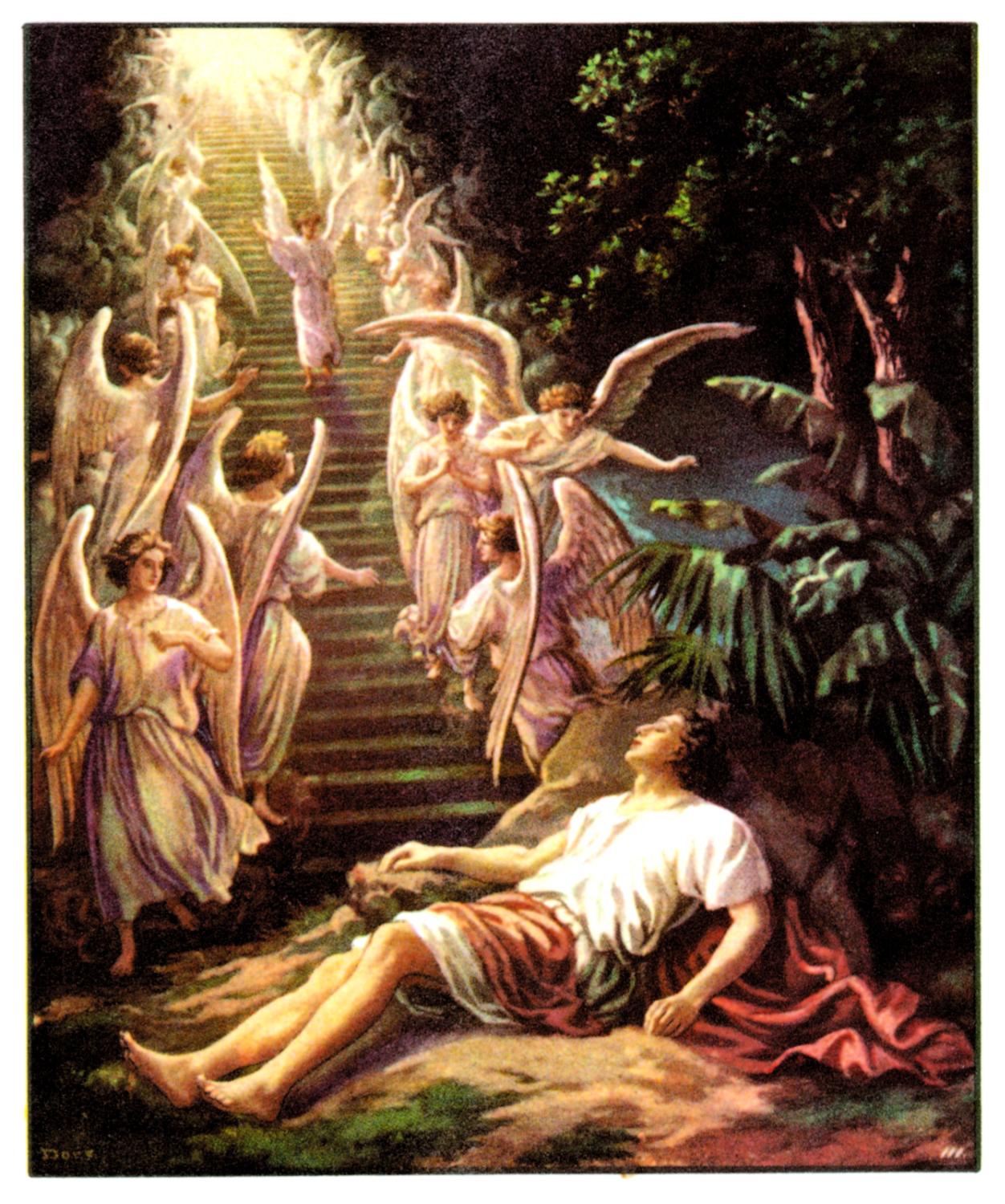
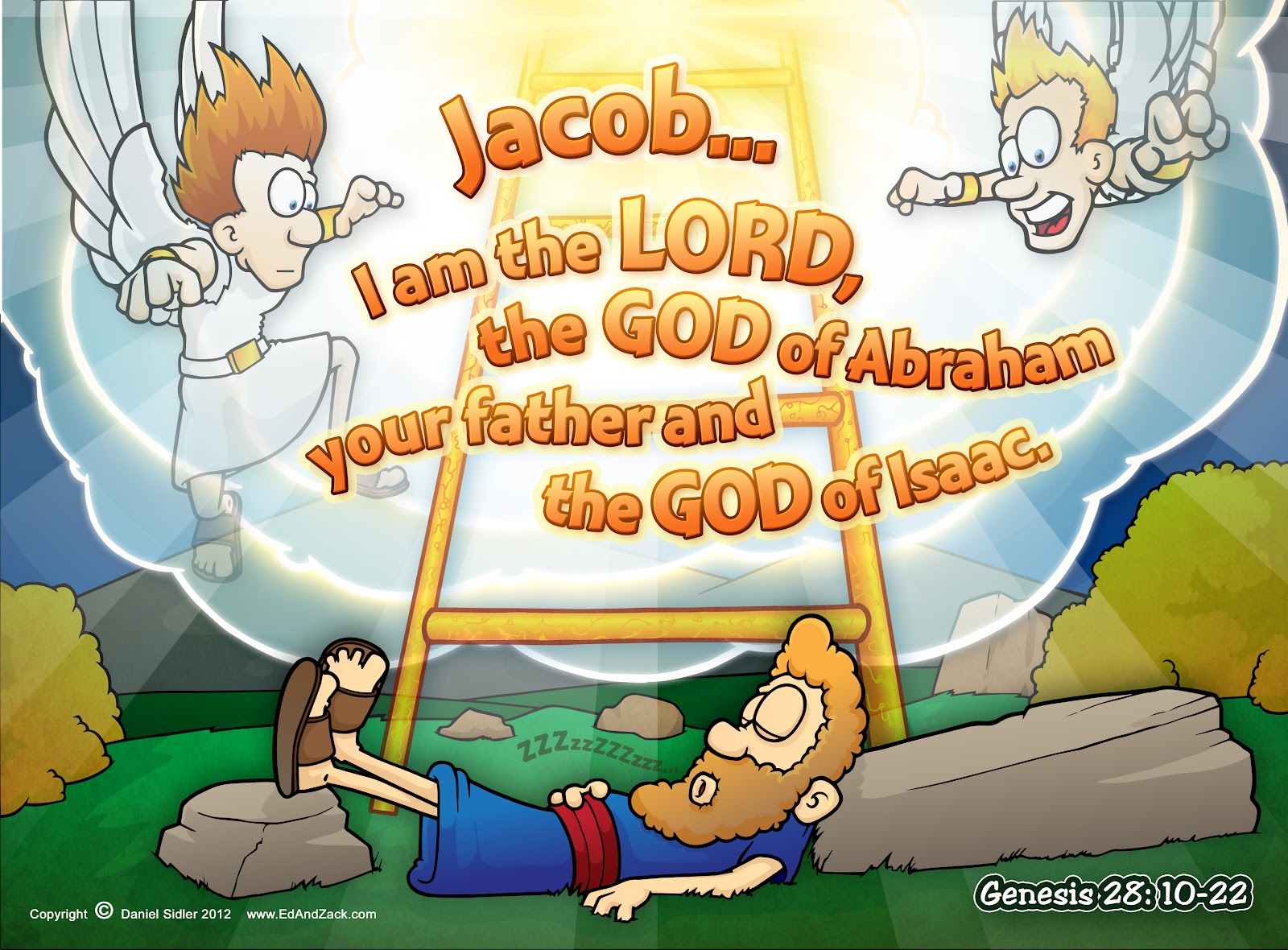
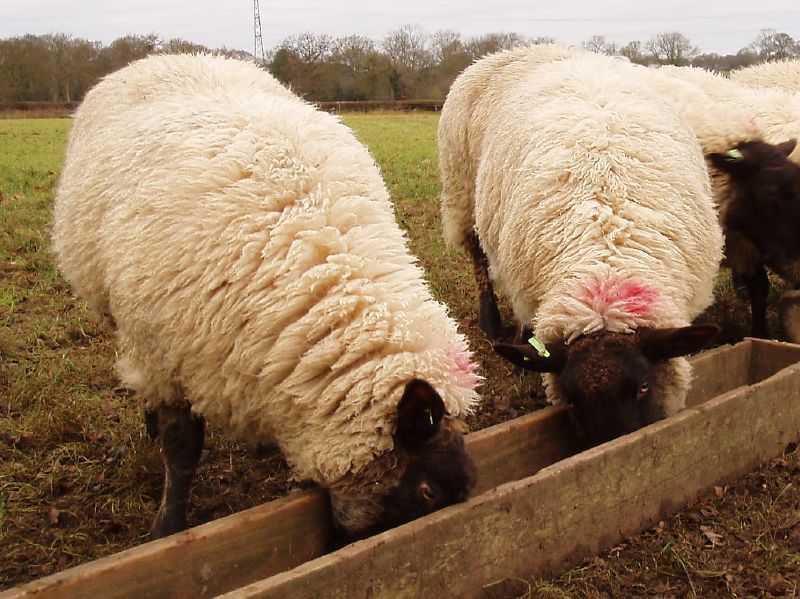
Note: you will need the oldheb.ttf (old Hebrew) and the SGreek Mediuim fonts to see the Hebrew and Greek text, as well as the three English fonts: Cooper Black, Impact and Frontlight MT Light. Right click the links and choose "Save Target As". Then go to the file, and either right click them and choose "install", or drag them into the font page.
oldheb.ttf
SGreek Medium
Cooper Black
Impact
Frontlight MT Light
NOTE: All of the yous and yours underlined as "you" and "your" indicates that the you and the your are plural. Also any of the words that are in bold pink lettering as "you" refers to the feminine gender, but it is only applied when it does not commonly refer to a woman. This only is applied to this week's Torah portion text at this time.
CHAPTER 28
Genesis 28:10-22
Gen 28:10 And Jacob went out from Beer Sheba, and walked to Haran. 11 And was entreated (impinged) on the place, and stayed (tarried) there, for the sun was going; and took from the stones of the place, and were put (set) with his head, and laid down in that place. 12 And was the calm-dream, and behold, a ladder was standing to the Earth, and his head touched (reached) to the Heavens: and behold, Messengers of Elohim were ascending and descending on him. 13 And behold, hwhy stood upon him, and said, I am hwhy, Elohim of Abraham, your father, and the Elohim of Isaac: The land which you are laying upon her will I give her to you and to your seed; 14 And your seed shall be as the dust of the Earth, and you shall spread to the sea (west), and to the east, and to the hidden (north), and to the negev (south): and in you all the families of the Ground, and in your seed, they shall be blessed. 15 And behold, I will be with you, and will guard (keep, observe, heed) you in all which you go, and will return you to this Ground; for I will not forsake you until which but I have done ta which I have spoken to you.
16 And Jacob awoke from his sleep, and said, Certainly (Firmly, Establishing, Surely), hwhy exists in this place; and I, I did not know, 17 and was afraid, and said, What reverence (aweness, fearness) [(How revering (aweing, fearing)] is this place! This is nothing for but the House of Elohim, and this is the Gate of the Heavens. 18 And Jacob arose early (woke up, loaded up, started up) in the breaking period (morning), and took ta-the stone which was put (set) with his head, and set her of a pillar, and poured (soaked) oil upon her head. 19 And called ta-the name of that place, Beth El: And however, the name of the city was Luz to the first.
20 And Jacob vowed a vow, to say, If Elohim shall be with me, and shall guard (keep, observe, heed) me in this way which I am walking, and will give to me bread to eat, and garment to clothe, 21 and I return to the house of my father in peace; and hwhy shall be to me for Elohim: 22 And this stone which I have set of a pillar shall be the House of Elohim: and of all which You shall give to me, I will tithe a tenth to You.
This whole chapter, from last week's and this week's Torah portion, started in Be'er Shava, the Well of Oaths/Seven. Jacob left Be'er Shava to go to Laban's place in Padan Aram, but in verse ten, it states that he is going to "Haran".
(NOTE: Not all verses will have comments)
Verse ten
10 And Jacob went out from Beer Sheba, and walked to Haran.
Looking at the word HARAN
The Hebrew word for Haran is "Khah-rahn"- Khet, Resh, Nun (Nrx). It is from Strong's Concordance number 2771, and its definition
From H2787; parched; Charan, the name of a man and also of a place: - Haran.
from 2787 "khah-rahr", and its definition
A primitive root; to glow, that is, literally (to melt, burn, dry up) or figuratively (to show or incite passion): - be angry, burn, dry, kindle.
There are possibilities to why Jacob's great-grandfather, Haran, was named:
One- Their home, or area, or city was burning at that time.
Two- His family was living in a "dry" location.
Three- Haran received burns from a kindling fire.
Four- Haran had a natural "angry" look.
Spiritually, in our walk with Yeshua, He will take us out of the Well of Oath/the Well of Seven [i.e. Shabbath] to a kindling, burning, or a "dry" territory.
Verse eleven
11 And was entreated (impinged) on the place, and stayed (tarried) there, for the sun was going; and took from the stones of the place, and were put (set) with his head, and laid down in that place.
To me, one could see that the sun was setting and Jacob found a place to settle for the night. There has been a debate if this Beth El, miles north of Jerusalem, or if this was another name for Jerusalem. If it was the latter, was this a foreshadow of Yeshua going to die in Jerusalem, and was having his head laid on a stony tomb at the going of the sun before the first day of the Spring High Holy Day of the Feast of Unleavened Bread, which is noted in the Gospel of John?
John 19:31 The Jews therefore, because it was the Preparation [the first day of the Feast of Unleavened Bread], that the bodies should not remain upon the cross on the Shabbath Day, (for that Shabbath Day was an high day [a High Shabbath, no service work,) besought Pilate that their legs might be broken, and that they might be taken away.... 38 And after this Joseph of Arimathaea, being a disciple of Yeshua, but secretly for fear of the Jews, besought Pilate that he might take away the Body of Yeshua: and Pilate gave him leave. He came therefore, and took the Body of Yeshua. 39 And there came also Nicodemus, which at the first came to Yeshua by night, and brought a mixture of myrrh and aloes, about an hundred pound weight. 40 Then took they the Body of Yeshua, and wound It in linen clothes with the spices, as the manner of the Jews is to bury. 41 Now in the place where He was crucified there was a garden; and in the garden a new sepulchre, wherein was never man yet laid. 42 There laid they Yeshua therefore because of the Jews' Preparation Day; for the sepulchre was nigh at hand.
Monte Judah of Lion and Lamb Ministries noted that when he did a tour to Israel, they stopped at Beth El. They saw the stones there and Monte said that the stones were soft and they were comfortable enough to lay one's head.
Bill Cloud of Shoreshim Ministries and Jacob's Tent noted that Jacob would have placed the rock above his head as protection for his head in case Esau tried to find him like he did while in their mother's womb. Thank you, Bill.
Mark Biltz of El Shaddai Ministries connect this week's Torah passage to this passage, which is noted in the book of Proverbs
Proverbs 30:4 Who hath ascended up into the Heavens, or descended? Who hath gathered the wind in His Fists? who hath bound the waters in a Garment? Who hath established all the ends of the Earth? what is His Name, and what is His Son's Name, if thou canst tell? 5 Every Word of Eloah is Pure: He is a Shield unto them that put their trust in Him. 6 Add thou not unto His Words, lest he reprove thee, and thou be found a liar.
Thank you, Mark.
Verse twelve
12 And was the calm-dream, and behold, a ladder was standing to the Earth, and his head touched (reached) to the Heavens: and behold, Messengers of Elohim were ascending and descending on him.
This is a speculation. The head of the ladder reaches to the heavens. Physically, this is what Nimrod and the people tried to build, which is noted in the Torah portion of Noakh, in the book of Genesis
Genesis 11:4 And they said, Come, we will build for us a city and a tower (great thing), and his head shall be in the Heavens; and we shall do (make) for ourselves a name, lest we become spread out (migrated, scattered) upon the face of all of the Earth. 5 And hwhy descended (came down) to see ta-the city and ta-the tower (great thing), which the sons of the Adam, they are building.
What Nimrod tried to do, hwhy did it in Jacob's dream in a instant. Builders today are still making skyscrapers, or towers, trying to reach to the heavens. Recently the United States just completed a tower in Manhattan, from what Jonathan Cahn of Beth Israel Worship Center calls, a "tower of defiance". If builders had it their way today, they would do whatever they could to reach a tower to the heavens. In Jacob's dream, the ladders reaching to the heavens show that men have hwhy's knowledge of good and evil regarding a tower.
I have also heard from our Hebraic Roots teachers that the ladder was an equivalence of our DNA ladder.
Monte Judah of Lion and Lamb Ministries made note that the phrase "upon him" really is "beside him". One more thing, I believe that "the Ladder" the angels were going up and down upon, or beside, "Him" was a type and shadow of "Yeshua".
Bill Cloud of Shoreshim Ministries and Jacob's Tent compared this week's Torah portion passage to the account, which is noted in the Gospel of John
John 1:45 Philip findeth Nathanael, and saith unto him, We have found Him, of whom Moses in the Torah, and the Prophets, did write, Yeshua of Nazareth, the Son of Joseph. 46 And Nathanael said unto him, Can there any good thing come out of Nazareth? Philip saith unto him, Come and see. 47 Yeshua saw Nathanael coming to him, and saith of him, Behold an Israelite indeed, in whom is no guile! 48 Nathanael saith unto Him, Whence knowest Thou me? Yeshua answered and said unto him, Before that Philip called thee, when thou wast under the fig tree, I saw thee. 49 Nathanael answered and saith unto Him, Rabbi, Thou art the Son of Elohim; Thou art the King of Israel. 50 Yeshua answered and said unto him, Because I said unto thee, I saw thee under the fig tree, believest thou? Thou shalt see greater things than these. 51 And He saith unto him, Verily, verily, I say unto you, Hereafter ye shall see Heaven open, and the Messengers of hwhy ascending and descending upon the Son of man.
Thank you, Bill.
Verse thirteen
13 And behold, hwhy stood upon him, and said, I am hwhy, Elohim of Abraham, your father, and the Elohim of Isaac: The land which you are laying upon her will I give her to you and to your seed;
Wait a minute! Isaac is Jacob's father. Why did hwhy state that "Abraham" was Jacob's father? The apostle Paul noted the answer in his letter to the assembly in Rome
Romans 4:16 Therefore it is of faith, that it might be by grace; to the end the promise might be sure to all the seed; not to that only which is of the Torah, but to that also which is of the faith of Abraham; who is the father of us all,
Looking at another source in this same letter, the apostle Paul noted this
Romans 9:4 Who are Israelites; to whom pertaineth the adoption, and the glory, and the Covenants, and the giving of the Torah, and the Service of hwhy, and the promises; 5 Whose are the fathers, and of whom as concerning the flesh Messiah came, who is over all, hwhy blessed for ever. Amen. 6 Not as though the Word of hwhy hath taken none effect. For they are not all Israel, which are of Israel: 7 Neither, because they are the Seed of Abraham, are they all Children: but, In Isaac shall thy seed be called. 8 That is, They which are the children of the flesh, these are not the Children of Elohim: but the Children of the Promise are counted for the seed.
Jacob was the first one by faith to be a son of Abraham as well as being a seed of Abraham of the Torah.
Perhaps it was also what Jacob said in verse twenty two of this week's Torah portion chapter
Genesis 28:22 ...and I will tithe a tenth to You of all which You shall give to me.
There was no mentioning in the scriptures that Isaac made this similar matter of tithing that Abraham did when he tithed everything he had to Melki-Tsedek. This is what it says regarding the tithing that Abraham did as well as the Levitical Priests, which the apostle Paul noted in the book of the Hebrews
Hebrews 7:1 For this Melki-Tsedek, King of Salem, Priest of El Elyon, who met Abraham returning from the slaughter of the kings, and blessed him; 2 To whom also Abraham gave a tenth part of all; first being by interpretation King of righteousness, and after that also King of Salem, which is, King of Peace; 3 Without father, without mother, without descent, having neither beginning of days, nor end of life; but made like unto the Son of Elohim; abideth a Priest continually. 4 Now consider how great this man was, unto whom even the patriarch Abraham gave the tenth of the spoils. 5 And verily they that are of the sons of Levi, who receive the Office of the Priesthood, have a Commandment to take tithes of the People according to the Torah, that is, of their brethren, though they come out of the loins of Abraham: 6 But he whose descent is not counted from them received tithes of Abraham, and blessed Him that had the promises. 7 And without all contradiction the less is blessed of the better. 8 And here men that die receive tithes; but there He receiveth them, of whom it is witnessed that He liveth. 9 And as I may so say, Levi also, who receiveth tithes, payed tithes in Abraham. 10 For he was yet in the loins of his father, when Melki-Tsedek met him.
Based on this source, that would make Jacob a tithing son to Abraham, the Father of Tithing.
Regarding the ladder, as I noted earlier, "the Ladder" the angels were going up and down upon on and hwhy talking from the top of "Him" was "Yeshua". Indirectly related, Yeshua said this, which is noted in the Gospel of John
John 14:6 Yeshua saith unto him, I am the Way, the Truth, and the Life: no man cometh unto the Father, but by Me.
In other words, Yeshua is the Connector, or "the symbolic ladder" between the Kingdom of Heaven, where the Heavenly Father is, and between the earth, where we are. We can climb the ladder to have access to the Heavenly Father through Yeshua "the Symbolic Ladder".
Verses fourteen and fifteen
14 And your seed shall be as the dust of the Earth, and you shall spread to the sea (west), and to the east, and to the hidden (north), and to the negev (south): and in you all the families of the Ground, and in your seed, they shall be blessed. 15 And behold, I will be with you, and will guard (keep, observe, heed) you in all which you go, and will return you to this Ground; for I will not forsake you until which but I have done ta which I have spoken to you.
These are the similar blessings I made note in earlier Torah portions that hwhy made to Abraham and Isaac.
Notice that in verse fifteen of this week's Torah portion passage, there are two yous that are bold in pink. These two yous in the Hebrew text are in the feminine form. This means that hwhy was speaking to Jacob's "soul", because the soul in general is feminine.
Verses sixteen and seventeen
16 And Jacob awoke from his sleep, and said, Certainly (Firmly, Establishing, Surely), hwhy exists in this place; and I, I did not know, 17 and was afraid, and said, What reverence (aweness, fearness) [(How revering (aweing, fearing)] is this place! This is nothing for but the House of Elohim, and this is the Gate of the Heavens.
Question: "Why was Jacob fearful at that location"? Because he sees that location as "hallowed ground", the similar location that Moses experienced at Mount Sinai, which is noted in the Torah portion of Sh'moth, in the book of Exodus
Exodus 3:1 And Moses was tending (shepherding) ta-the flock of Jethro, his father-in-law, priest of Midian: and guided (led) ta-the flock behind the wilderness, and came to the Mountain of The Elohim, to Horeb. 2 And the Messenger of hwhy appeared to him in a Flame of Fire from the midst of the bramble bush (thorn bush): And saw, and behold, the bramble bush (thorn bush) was kindling in the fire, and the bramble bush (thorn bush) was not consumed. 3 And Moses said, I will bend aside (turn aside) now, and I will see ta-this Great Sight why (what is known) the bramble bush (thorn bush) is not kindled. 4 And hwhy saw when (for) had bent aside (turned aside) to see. And Elohim called to him from the midst of the bramble bush (thorn bush), and said, Moses! Moses! And said, Behold I.
In verse sixteen in the Hebrew text, the Hebrew word for "exists (is)" is "yesh". This would refer to Yeshua being in that place in Beth El. Retranslating, it would read this way
16 And Jacob awoke from his sleep, and said, Surely is hwhy Yeshua in this place; and I, I did not know,
!!!hwhy Kl dbk
Verses eighteen and nineteen
18 And Jacob arose early (woke up, loaded up, started up) in the breaking period (morning), and took ta-the stone which was put (set) with his head, and set her of a pillar, and poured (soaked) oil upon her head. 19 And called ta-the name of that place, Beth El: And however, the name of the city was Luz to the first.
Isn't it revealing that Jacob carried oil in his journey to Haran. He most likely carried flour with him and used the Oil to make bread to eat, and carried water to drink- the basic necessities for food while traveling.
Mark Biltz of El Shaddai Ministries noted in verse eighteen of "ta-the stone". This is Yeshua "the Stone", because according to Mark, Yeshua is "The Aleph-Tav". Thank you Mark.
Mark Biltz also related this week's Torah portion to a verse, which is noted in the book of Psalms
Psalms 118:22 The stone which the builders refused is become the head stone of the corner.
Looking at the word POURED
The Hebrew word for poured is "yah-tsahk"- Yod, Tsade, Kuph (quy). It is from Strong's Concordance number 3332, and its definition
A primitive root; properly to pour out (transitively or intransitively); by implication to melt or cast as metal; by extension to place firmly, to stiffen or grow hard: - cast, cleave fast, be (as) firm, grow, be hard, lay out, molten, overflow, pour (out), run out, set down, stedfast.
This is where we get our modern English word "soak". In other words, Jacob "soaked" the stone with oil.
Looking at the word LUZ
The Hebrew word for Luz is "Looz"- Lamed, Vav, Zayin (zwl). It is from Strong's Concordance number 3870, and its definition
Probably from H3869 (as growing there); Luz, the name of two places in Palestine: - Luz.
from 3869, "looz" (zwl), and its definition
Probably of foreign origin; some kind of nut tree, perhaps the almond: - hazel.
The place was most likely named because "almond trees" grew there.
Here's another definition of the same Hebrew word:
From Strong's Concordance number 3868 "looz" (zwl), and its definition
A primitive root; to turn aside (compare H3867, H3874 and H3885), that is, (literally) to depart, (figuratively) be perverse: - depart, froward, perverse (-ness).
Luz means "to turn aside toward perversion". In other words, this place was full of "perversion".
In this map, Beth El (formerly Luz) is located ten miles north of Jerusalem.
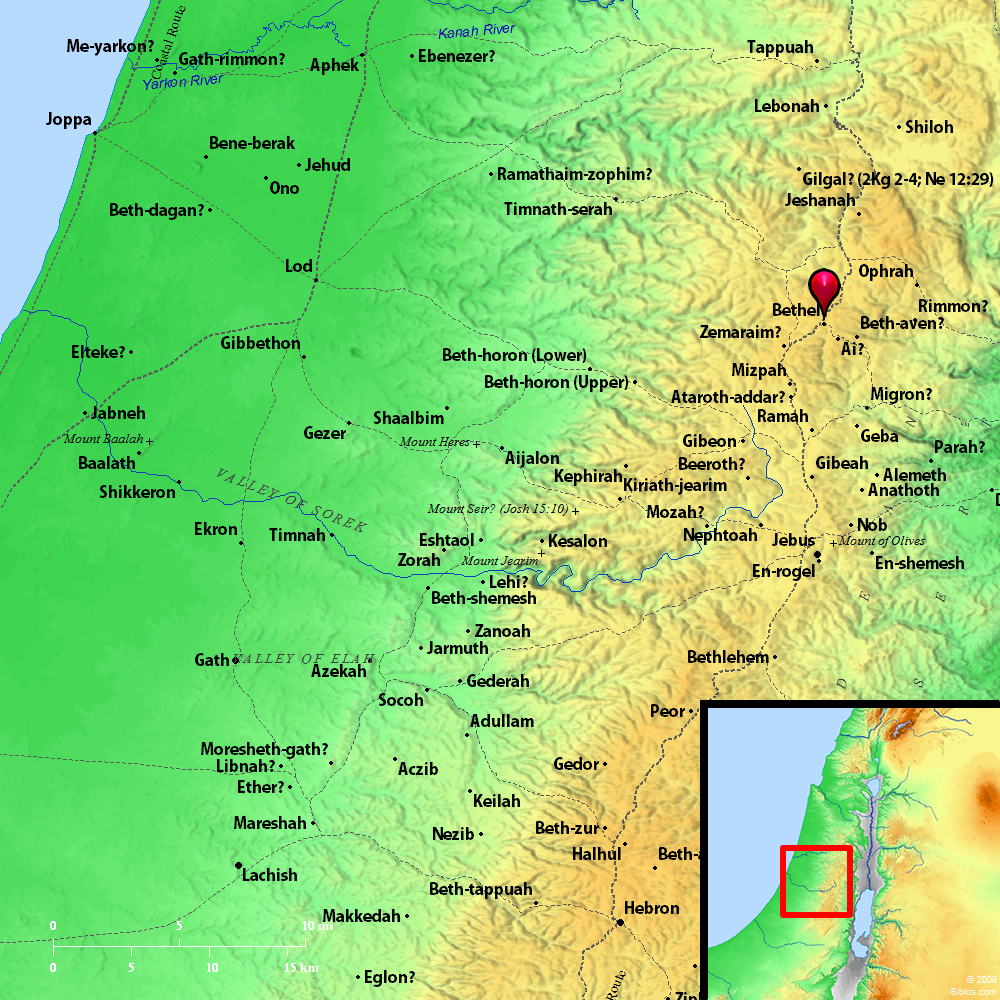
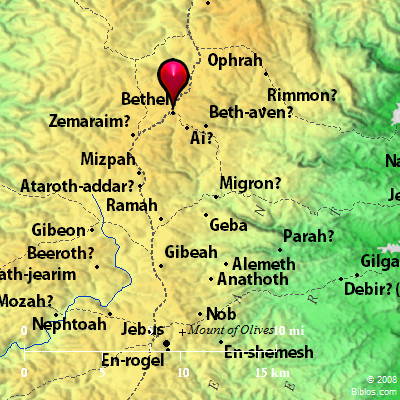
But as questioned earlier, is this the Beth El, or was it Jerusalem? It would take extensive research to prove which one is the real Beth El.
Verses twenty through twenty two
20 And Jacob vowed a vow, to say, If Elohim shall be with me, and shall guard (keep, observe, heed) me in this way which I am walking, and will give to me bread to eat, and garment to clothe, 21 and I return to the house of my father in peace; and hwhy shall be to me for Elohim: 22 And this stone which I have set of a pillar shall be the House of Elohim: and of all which You shall give to me, I will tithe a tenth to You.
We will find out in a future Torah portion if this vow is fulfilled or not. I will end this chapter by asking this question "Does this pillar still exists today in Beth El"? Now thinking a little more, I am leaning more that this Beth El is "Jerusalem". I found out that I am not the only person that thinks this.
In this chapter, this is spiritually applied in our lives when hwhy, the Heavenly Father, takes us on a spiritual journey from Beer Sheva- a spiritual "Bore-Well of Oath/Seven", when we "oath" and/or when we end out "Shabbath (Seventh) Day of Rest" and travel to Haran- a spiritual "Dryness". That's when we will get a dream and/or vision when we are in rest with "the Rock", who is Yeshua, the Messiah. Then we, as "little rocks" in Messiah, get poured by the oil of "the Ruakh HaKodesh" (the Holy Spirit), and crucify our bodies in the Messiah which were formerly vessels of "spiritual perversion" to become a "house of El", or temples of the Ruakh HaKodesh (the Holy Spirit).
!!!hwhy Kl dbk
In verse twenty two of this week's Torah portion passage, The "You" is bold in pink. The You in the Hebrew text is in the feminine form. This means that Jacob was speaking to hwhys "Soul", because the soul in general is feminine. This is the first time anywhere in the Scriptures that anyone has spoken to hwhy's Soul. This was a "Soul to soul" communication.
CHAPTER 29
Genesis 29:1-35
Gen 29:1 And Jacob lifted up his feet, and came to the land of the sons of the east, 2 and looked, and behold, a bore-well was in the field, and behold, there were three arranged droves (droves, arrangements) of flocks crouching upon her; by from that bored-well, they would quaff (water) the arranged droves: and a great stone was upon the mouth of the bore-well. 3 And all of the arranged droves (droves, arrangements), they would be gathered there: and they would roll ta-the stone from upon the mouth of the bore-well, and they would quaff (water) ta-the flocks, and they would return ta-the stone upon the mouth of the bore-well to her place.
4 And Jacob said to them, My brothers, from where are you? And they said, We are from Haran. 5 And said to them, Do you know ta-Laban, son of Nahor? And they said, We know. 6 And said to them, Is to him the peace [(that peace is to him)]? And they said, Is peace: and behold, Rachel, his daughter, is coming with the flock. 7 And said, Behold, the day is still great, is not the time at gathering the livestock: quaffing (watering) the flock, and going tending them. 8 And they said, We are not able until which they have gathered all of the arranged droves (droves, arrangements), and they will roll ta-the stone from upon the mouth of the bore-well; and that we will quaff (water) the flocks.
9 And they were still with speaking with themselves, and Rachel came with the flock which belonged to her father: for she was a shepherdess. 10 And was, as the which Jacob saw ta-Rachel, daughter of Laban, brother of his mother, and ta-the flock of Laban, brother of his mother, and Jacob approached, and rolled ta-the stone from upon the mouth of the bore-well, and quaffed (watered) ta-the flock of Laban, brother of his mother. 11 And Jacob kissed to Rachel, and lifted up ta-his voice, and wept. 12 And Jacob told (professed, declared) to Rachel for he is a brother of her father, and for he is the son of Rebekah: and she ran and she told (declared) to her father. 13 And was, as Laban heard ta-the hearing (report) of Jacob, son of his sister, and was the running [(and ran)] to meet (encounter) him, and embraced to him, and kissed to him, and brought him to his house. And accounted (recorded, enumerated, enrolled, scrolled) to Laban ta all of these words. 14 And Laban said to him, Surely, you are my bone and my flesh. And dwelled with him a month of days.
15 And Laban said to Jacob, That for you are my brother, and would you serve me free (at nothing)? Tell (Declare) her to me, what are your wages? 16 And to Laban were two daughters: the name of the greater (elder) was Leah, and the name of the smaller (younger) was Rachel. 17 And the eyes of Leah were tender (faintish soft, weak); and Rachel, she was beautiful (fair) of form and beautiful (fair) of appearance. 18 And Jacob loved ta-Rachel; and said, I will serve you seven years on Rachel your daughter, the smaller (younger). 19 And Laban said, Is good (better) she be given of her to you than of me giving her to another man: Dwell with me. 20 And Jacob served on Rachel seven years; and they were in his eyes as ones of days in his loving her.
21 And Jacob said to Laban, Bring ta-my woman (wife), for my days, they are fulfilled, and I may go to her. 22 And Laban gathered ta-all of the men of the place, and did (made) a banquet. 23 And was in the mixing period (evening), and took ta-Leah, his daughter, and brought her to him; and had gone to her. 24 And Laban gave to her, ta-Zilpah, his female servant, to Leah, his daughter, of a female servant.
25 And was, in the breaking period (morning), and behold, she was Leah: and said to Laban, What is this you have done to me? That not I had served with you on Rachel? And to why did you deceived (betrayed, deluded) me? 26 And Laban said, Not is done thus in our place to give the younger (little) to the face of the firstborn. 27 Fulfill this week, and we will give her to you also ta-this one in the service which you shall serve with me yet (still) another seven years. 28 And Jacob did so, and fulfilled this week: and was given to him ta-Rachel, his daughter, to him for a woman (wife). 29 And Laban gave to Rachel, his daughter, ta-Bilhah, his female servant, to her for a female servant. 30 And had gone also to Rachel, and loved also ta-Rachel than Leah, and served with him yet (still) another seven years.
31 And hwhy saw for Leah was hated, and opened ta-her womb (uterus, matrix): and Rachel was barren.
32 And Leah, she conceived, and she birthed a son, and she called his name, Reuben: for had said of her, For hwhy had seen on my affliction; for now my man (husband) will love me.
33 And she conceived still, and she birthed a son; and she said, For hwhy had heard for I am hated, and has given to me ta-this one: And she called his name, Simeon.
34 And she conceived still, and she birthed a son; and she said, Now is the time my man (husband) shall be joined to me, for I have birthed to him three sons: Upon thus, was called his name, Levi.
35 And she conceived still, and she birthed a son: and she said, This time, I will thank (praise) ta-hwhy: Upon thus, was called his name, Judah; and she had stood (stilled) from birthing.
(NOTE: Not all verses will have comments)
Verses one and two
1 And Jacob lifted up his feet, and came to the land of the sons of the east, 2 and looked, and behold, a bore-well was in the field, and behold, there were three arranged droves (droves, arrangements) of flocks crouching upon her; by from that bored-well, they would quaff (water) the arranged droves: and a great stone was upon the mouth of the bore-well.
They were at the well. Why did hwhy reveal "three flocks of sheep"? Why not one, or two, or not specify an amount at all? One viewpoint could be that they represent "the Triune Elohim"- hwhy, the Father, hwhy, Yeshua, and hwhy, the Ruakh HaKodesh (the Holy Spirit).
Notice the word "that" is bold in pink. This tells us that the bored-well is feminine. Why? I don't know at this time.
Verse three
3 And all of the arranged droves (droves, arrangements), they would be gathered there: and they would roll ta-the stone from upon the mouth of the bore-well, and they would quaff (water) ta-the flocks, and they would return ta-the stone upon the mouth of the bore-well to her place.
Isn't it interesting that hwhy made a big deal of the shepherds "rolling" the stone off well and "returning" the stone back to the well. Why did He emphasize this? Looking at the culture of the day, if it was the heat of the day, when it was very hot, they wanted to keep the water cool by keeping a heavy enough object to cover the mouth of the well.
This detailed account of rolling the stone could be indirectly connected to Yeshua being resurrected from the dead on the day of First Fruits in the first day of the count of the Omer, which is noted in the Gospel of Matthew
Matthew 27:57 When the even was come, there came a rich man of Arimathaea, named Joseph, who also himself was Yeshua's disciple: He went to Pilate, and begged the Body of Yeshua. Then Pilate commanded the Body to be delivered. 59 And when Joseph had taken the Body, he wrapped It in a clean linen cloth, 60 And laid It in his own new tomb, which he had hewn out in the rock: and he rolled a great stone to the door of the sepulchre, and departed. 61 And there was Mary Magdalene, and the other Mary, sitting over against the sepulchre. 62 Now the next day, that followed the Day of the Preparation, the Chief Priests and Pharisees came together unto Pilate, 63 Saying, Sir, we remember that that deceiver said, while He was yet alive, After three days I will rise again. 64 Command therefore that the sepulchre be made sure until the third day, lest His disciples come by night, and steal Him away, and say unto the People, He is risen from the dead: so the last error shall be worse than the first. 65 Pilate said unto them, Ye have a watch: go your way, make it as sure as ye can. 66 So they went, and made the sepulchre sure, sealing the stone, and setting a watch.
28:1 In the end of the Shabbath, as it began to dawn toward the first day of the week, came Mary Magdalene and the other Mary to see the sepulchre. 2 And, behold, there was a great earthquake: for the Messenger of hwhy descended from the heavens, and came and rolled back the stone from the door, and sat upon it.
Verses four through six
4 And Jacob said to them, My brothers, from where are you? And they said, We are from Haran. 5 And said to them, Do you know ta-Laban, son of Nahor? And they said, We know. 6 And said to them, Is to him the peace [(that peace is to him)]? And they said, Is peace: and behold, Rachel, his daughter, is coming with the flock.
I have wondered if the shepherds' true feelings are these when they responded to Jacob's questions:
"And they said, We know him."
But I wished we didn't because of the kind of jerk he is.
"And they said, Is peace..."
But we wished there wasn't peace for that jerk.
The shepherds reveal in verse six that they knew Rachel by name. It was most likely that she and her flocks must have been hanging around with them and their flocks, obviously for her protection. It is rare to hear a woman in that culture in that day and age to be a shepherdess by herself, because men could overtake her, so she hanged around with those in whom she trusted. There is no knowledge about the shepherds, but they knew Rachel, either by their aquaitance with Laban, or knew about Laban through Rachel's input regarding her experience and/or observation of her father's activities to them.
We do not know how long Rachel has been shepherding with the men, but it had to been a long while for them know her by name. A question came to me: "Why did any of the shepherds not pursue a relationship with Rachel before Jacob came to the scene"? I think that they knew Laban's wiles and schemes that if they pursued a relationship with Rachel, they would get stuck into Laban's control. That is why they did not pursue her. Luckily for them, Jacob did not know Laban and his sly tactics beforehand, in order for hwhy to fit Jacob and Rachel into His "eternal plan".
Verses seven and eight
7 And said, Behold, the day is still great, is not the time at gathering the livestock: quaffing (watering) the flock, and going tending them. 8 And they said, We are not able until which they have gathered all of the arranged droves (droves, arrangements), and they will roll ta-the stone from upon the mouth of the bore-well; and that we will quaff (water) the flocks.
This account took place in the heat, or high noonish part of the day. We get a first hand experience of an account of a shepherd's daily life and expertise shepherding their flocks. To me, this is pretty cool.
Did Jacob have knowledge of how to tend sheep, and learned it at home? Last week's Torah portion noted that he was a dweller of tents, which is noted in the Torah portion of Toldoth, in the book of Genesis
Genesis 25:27 ...and Jacob was a perfect (upright, complete) man of a dweller of tents.
Jacob questioned the shepherds of their tactic that it is not good to gather the flocks together. Despite his dweller of tents, did he experience tending flocks? It is was 99.99% definite that he did, as we will see later.
Adding to what I commented earlier, another reason the shepherds waited until they were all together was that once they opened the well, the water kept cool by opening it just once for everybody rather than opening up multiple times for one flock at a time, and would potentially lose the cool temperature in the water via the heat of the sun. Don't forget, we are talking about the Middle East where temperatures could climb above a hundred degrees easily during the summertime.
Verses nine and ten
9 And they were still with speaking with themselves, and Rachel came with the flock which belonged to her father: for she was a shepherdess. 10 And was, as the which Jacob saw ta-Rachel, daughter of Laban, brother of his mother, and ta-the flock of Laban, brother of his mother, and Jacob approached, and rolled ta-the stone from upon the mouth of the bore-well, and quaffed (watered) ta-the flock of Laban, brother of his mother.
Like mother, like son. Jacob was getting water for Rachel's flock, which was like Rebekah getting water for Eliezer, Abraham's servant, his men and the camels, which is noted in the Torah portion of Khai-yey Sarah, in the book of Genesis
Genesis 24:15 And was, before finishing to speak, and behold, Rebekah came out, which was birthed to Bethuel, son of Milcah, woman (wife) of Nahor, brother of Abraham, and her pitcher was upon her shoulder. 16 And the young woman was much good of form (appearance), a virgin, and a man had not known her: and she descended (went down) to the eye-well, and she filled her pitcher, and she ascended. 17 And the servant ran to meet (encounter) her, and said, I shall swallow (drink) now a little water from your pitcher. 18 And she said, Imbibe (Drink), my lord (master): and she hurried (hastened), and she descended (let down) her pitcher upon her hand, and she had him quaff (drink). 19 And she finished to have him quaff (drink), and she said, I will draw for your camels also until if they have finished to imbibe (drink). 20 And she hurried (hastened), and she emptied her pitcher to the trough, and she ran still to the bore-well to draw, and she drew for all of his camels. 21 And the man was with wonder (astonishment) to her with scratching (silence, engraving) to know that hwhy had prospered his journey, if not.
There is a mother-son connection in this act.
Continuing in verse ten, Jacob is shown to "roll" the stone away. That means that mostly Jacob picked up the stone from one side until it was standing up on its side, and then rolled it off the well. This is a connection to Yeshua when He was about to be resurrected on First Fruits in the beginning of the fouth day of the Feast of Unleavened Bread. Before Yeshua was resurrected, the Angels "rolled" the stone away.
Verse eleven
11 And Jacob kissed to Rachel, and lifted up ta-his voice, and wept.
Jacob was definitely in love with Rachel at first sight, otherwise, he would not have kissed her. Verses nine through eleven reveal that Jacob was showing off his "Macho Man" side and was the founder of the "Tarzan Call".... Just kidding. :)
Verses twelve through fourteen
12 And Jacob told (professed, declared) to Rachel for he is a brother of her father, and for he is the son of Rebekah: and she ran and she told (declared) to her father. 13 And was, as Laban heard ta-the hearing (report) of Jacob, son of his sister, and was the running [(and ran)] to meet (encounter) him, and embraced to him, and kissed to him, and brought him to his house. And accounted (recorded, enumerated, enrolled, scrolled) to Laban ta all of these words. 14 And Laban said to him, Surely, you are my bone and my flesh. And dwelled with him a month of days.
History is repeating itself. Here comes Laban again with fanfare and pomp and circumstance with music and singing, with a welcome banner to Jacob, just like he did to Eliezer during Abraham's time, again with dollar signs in his eyes, thinking to himself that he is going to get "more goodies" like he received from Eliezer last time. As I noted in last week's Torah portion, Laban's name means "white", and he was most likely pale looking at birth. His name was perfect to be nicknamed "Pale Face".
This is the account between Eliezer, Abraham's servant, and Rebekah, and "Pale Face" Laban, which is noted in the Torah portion of Khai-yey Sarah, in the book of Genesis
Genesis 24:23 And said, The daughter of who are you? Tell (Declare) to me now: that exists the house of your father a place for us to lodge (stay)? 24 And she said to him, I am the daughter of Bethuel, son of Milcah, which was birthed to Nahor. 25 And she said to him, Also straw also fodder are plentiful (multiple) with us, also a place to lodge (stay). 26 And the man bowed, and worshipped to hwhy. 27 And said, Blessed be hwhy, Elohim of my lord (master), Abraham, which has not forsaken His Kindness and His Truth from with my lord (master): I being in the way, hwhy led (guided) me at the house of the brother of my lord (master). 28 And the young woman, she ran, and she told (declared) to the house of her mother according to these words [(as these words)].
29 And to Rebekah was a brother, and his name was Laban: and Laban ran to the man to the outside to the eye-well. 30 And was, as seeing ta-the nose ring (ear ring) and ta-the bracelets (hand clasps) upon the hands of his sister, and as he heard ta-the words of Rebekah, his sister, to say, Thus spoke the man to me; And came to the man; and behold, was standing upon the camels upon the eye-well. 31 And said, Come, blessed of hwhy!; To why are you standing on the outside? And I, I have made face (prepared) the house and a place for the camels!
32 And the man came to the house: and unloaded (ungirded, loosened, opened wide?) the camels, and gave straw and fodder for the camels, and water to wash his feet and the feet of the men which were with him.
These are the similarities between Jacob's account and her mother, Rebekah's account:
1. Both had told to the other person at the well their lineages.
2. The relatives of their home returned and told their family members of their experiences.
3. Laban came out to meet them and brought them to his home and stayed.
Also in verse thirteen of this Torah portion passage, Jacob also could have told Laban his experience with Esau and what he and his mother did against Esau. Thus he revealed how Jacob cheated on Esau with getting the blessing from his father, Isaac. Laban, showing the dollar signs equivalent in his eyes again, like he did toward Eliezer, Abraham's servant, now knew that Jacob has the blessing from his father, Isaac.
Notice in verse fourteen that Laban says that Jacob is "his bones and his flesh". Why did he say that? It connects to what Adam said to Khavah, which is noted in the Torah portion of B'reyshith, in the book of Genesis
Genesis 2:21 And hwhy Elohim had fallen a deep sleep (stupor sleep) upon the Adam, and slept, And took one of his ribs, and closed up (enclosed) the flesh undeneath her. 22 And hwhy Elohim built ta-the rib which was taken from the Adam of a woman, and brought her to the Adam. 23 And the Adam said, This now (this time), this is bone from my bones and flesh from my flesh. For this shall be called Woman, for this was taken out from man,
It was because Jacob was the bones and flesh of Laban's sister. Laban might as well had greedily added "What treasures did you bring for me"?
Verses fifteen through seventeen
15 And Laban said to Jacob, That for you are my brother, and would you serve me free (at nothing)? Tell (Declare) her to me, what are your wages? 16 And to Laban were two daughters: the name of the greater (elder) was Leah, and the name of the smaller (younger) was Rachel. 17 And the eyes of Leah were tender (faintish soft, weak); and Rachel, she was beautiful (fair) of form and beautiful (fair) of appearance.
Looking at the word WAGES
The Hebrew word for wages is "mas-khoh-reth"- Mem, Shin, Kaph, Resh, Tav (trksm). It is from Strong's Concordance number 7939, and its definition
From H7936; wages or a reward: - reward, wages.
from 7936 "sah-khahr" (rks) and its definition
The second form by permutation and used in Ezr_4:5; a primitive root (apparently akin (by prosthesis) to H3739 through the idea of temporary purchase; compare H7937); to hire: - earn wages, hire (out self), reward, X surely.
This latter Hebrew word is where we get our modern English word "score".
Looking at the the following words:
LEAH
The Hebrew for Leah is "Ley-ah"- Lamed, Aleph, Heh ( hal) is from Strong's concordance number 3812, and its definition
From H3811; weary; Leah, a wife of Jacob: - Leah.
from 3811 "lah-ah" (hal), and its definition
A primitive root; to tire; (figuratively) to be (or make) disgusted: - faint, grieve, lothe, (be, make) weary (selves).
Leah means "tired" or "faint".
This reveals to us that Leah's eyes had a physical "tired" or "faint" appearance.
RACHEL
The Hebrew word for Rachel is "Rah-kheyl"- Resh, Khet, Lamed (lxr). It is from Strong's Concordance number 7354, and its definition
The same as H7353; Rachel, a wife of Jacob: - Rachel.
from 7353 "rah-khahl" (lxr), and its definition
From an unused root meaning to journey; a ewe (the females being the predominant element of a flock), (as a good traveller): - ewe, sheep.
Rachel means "ewe".
This means that Rachel was the one made to be the shepherdess "out in the field", while Leah was at home. These two daughters were the female birth order reversal of their occupations, compared to Jacob and Esau.
Also noticed that Laban told Jacob that he is his "brother". This is the same thing that Jacob told Rachel in verse twelve of this week's Torah portion chapter. Rachel most likely told her father, Laban, that. But did Jacob say that he was his "brother" in the first place, when he was really his "cousin/uncle"? I don't have an answer to that at this time.
Jacob had Esau's birthright, who was a man of the field, and bears his own second born status as a man of the tents. Do these two factors impact his relationship with these two sisters? We will see.
Verses eighteen through twenty
18 And Jacob loved ta-Rachel; and said, I will serve you seven years on Rachel your daughter, the smaller (younger). 19 And Laban said, Is good (better) she be given of her to you than of me giving her to another man: Dwell with me. 20 And Jacob served on Rachel seven years; and they were in his eyes as ones of days in his loving her.
Isn't it funny that Jacob says to Laban that he would serve him seven years. Why not one year? Why not two? Did Jacob forget what Rebekah his mother said to him before he left, which is noted in the Torah portion of Toldoth, in the book of Genesis?
Genesis 27:43 And now, my son, listen in my voice; and arise, bolt way by (for) yourself to Laban, my brother, to Haran; 44 and you will dwell with him ones of days, until which the fury of your brother, she turns away; 45 until the anger of your brother turns away from you, and forgets ta which you have done to him: and I will send, and I will take (fetch) you from there:...
The phrase "ones of days" did not mean "years", but "a few days" of time. So why did Jacob offer to work for seven years? The best answer I can figure is which I noted before from a source, that the number seven symbolizes "spiritual completion". This was Jacob's act of spiritual completion of years for the price of his wages.
In verse nineteen of this week's Torah portion, the word "you" is bold in pink. This means that Laban was speaking to Jacob's "soul". Why did Laban speak to Jacob's soul, It's not clear, but will explain why Laban said what he said shortly.
One could tell that Jacob was in love with Rachel that the years felt like days to him. Jacob was "in heaven" in his love for Rachel. Was this a taste of how heaven's time relates to the world's time, which is noted by the apostle Peter in his epistle?
2 Peter 3:8 But, beloved, be not ignorant of this one thing, that one day is with hwhy as a thousand years, and a thousand years as one day.
I think it was.
There is another issue that I don't think Jacob had knowledge, and it was "wages". How would you like to go to a business and say to them "I will work for you for ten years", and you get hired on the spot. What issue was not discussed during the offer?------> your "earnings". The company would think that you would be working for them "for free". I don't think Jacob put that into consideration regarding his "wages" and not the length of time he was to work. Jacob did not have enough business knowledge when discussing with Laban his wage offer. We will see how Laban takes the advantage of "Jacob's Offer".
Verses twenty-one and twenty two
21 And Jacob said to Laban, Bring ta-my woman (wife), for my days, they are fulfilled, and I may go to her. 22 And Laban gathered ta-all of the men of the place, and did (made) a banquet. 23 And was in the mixing period (evening), and took ta-Leah, his daughter, and brought her to him; and had gone to her. 24 And Laban gave to her, ta-Zilpah, his female servant, to Leah, his daughter, of a female servant.
Jacob said in an alternate way "Give me my wife!", BUT he did not say "Give me Rachel!". As we will see, Laban capitalized on this phrase and something else that I have yet to reveal.
Also, as one can see, they made a banquet, a.k.a. "a Food Covenant". As Rico Cortes of Wisdom in Torah Ministries noted, once th Food Covenant is eaten and drank, the deal became sealed and what is given to Jacob cannot be broken. This is a Food Covenant that can be eaten and drank first and then receive the gift "after" the Food Covenant. In this case whatever "wife" Jacob receives from "Laban, the deceiver", after they ate the Food Covenant is what Jacob is to get, and he cannot break it.
Verses twenty three and twenty four
23 And was in the mixing period (evening), and took ta-Leah, his daughter, and brought her to him; and had gone to her. 24 And Laban gave to her, ta-Zilpah, his female servant, to Leah, his daughter, of a female servant.
Laban is giving "Leah" to Jacob, and Jacob marriage to her cannot be broken. I will explain this shortly.
Playing on this based on Monte Judah of Lion and Lamb Ministries notion, though not mentioned, Laban told his daughter Leah to go into Jacob, and Leah replied "Sounds like hwhy's will to me", like what Sarah said to Abraham when she told him to go into Hagar to bear sons for her. Thank you Monte.
Verse twenty five
25 And was, in the breaking period (morning), and behold, she was Leah:...
Hear the high shriek violins from the movie "Psycho"?
Well, Jacob covenanted for "his wife", and what he said is what he got. There is a current Geico commercial, you know- the "fifteen percent" phrase, when the second person tries to "up one" on the first person with an "oh yeah?" statement. In one of these commercials, the second person responds to the first person and by upping one on the person asks "Did you know that Genies can be literal?". The next scene shows a guy rubbing this lamp, and a Genie pops up out of nowhere. The Genie asks him, what his wish is. The guy wishes for "a million bucks". He got his million bucks all right- a million "male deers". In relevance to this Torah scene, Jacob received what he "literally said". He demanded "his wife", and he got "his wife"----> Leah!
Verses twenty five and twenty six
25 ...and said to Laban, What is this you have done to me? That not I had served with you on Rachel? And to why did you deceived (betrayed, deluded) me? 26 And Laban said, Not is done thus in our place to give the younger (little) to the face of the firstborn.
Looking at what the fomer radio news commentator, Paul Harvey, says "And now, the rest of the story".
This is not what Laban said originally. This is the original conversation between Jacob and Laban in verses eighteen and nineteen
Genesis 29:18 And Jacob loved ta-Rachel; and said, I will serve you seven years on Rachel your daughter, the smaller (younger). 19 And Laban said, Is good (better) she be given of her to you than of me giving her to another man: Dwell with me.
Ahh! Look at Laban's words back in verse nineteen. He did not replied that it was a done deal that Jacob will get Rachel after seven years. He made "an indirect reply" by using subtle crafty words to make it "sound" like Laban is saying "Yes, I will give Rachel to you". But on the other hand, it was a "non-answer answer". In other words, Laban "sidestepped" the answer (Just like politicians today- they must have taken a lawyer's course on "Labanisms" while in college). Laban was just like King Abimelech by making a statement, but "Pale Face" Laban did not really make a "commitment" in his reply, but was only "saying" that he rather give her to Jacob than to another man. What a creep.
Laban was indirectly saying to Jacob, "I did not agree to your premise for you to take Rachel to be your wife. I just said that I do not want another man to have Rachel but you. I am just telling you that we do not give our younger daughters before the older ones". My question to Laban is "Why did you not say that to Jacob in your reply to him"? Because he recalled Rebekah wearing the golden nose ring and the two golden bracelets and the other gifts that Eliezer gave to her, and giving treasures to Laban and to his family in a previous account, which is noted in the Torah portion of Khai-yey Sarah, in the book of Genesis
Genesis 24:50 And Laban and Bethuel answered, and they said, From hwhy has gone out the word: we are not able at speaking to you evil or good. 51 Behold, Rebekah is to your face, take her, and go, and she shall be the woman (wife) of the son of your lord (master) as the which hwhy has spoken. 52 And was, that as the which the servant of Abraham had heard ta-their words, and bowed to hwhy to the Earth. 53 And the servant brought out vessels of silver, and vessels of gold, and garments, and gave to Rebekah: and gems (precious items) were given to her brother and to her mother. 54 And they ate and they imbibed (drank), he and the men which were with him, and they lodged (stayed);
And they arose in the breaking period (morning), and said, Send me away to my lord (master). 55 And her brother and her mother said, The young woman, she will dwell with us days, or ten; Afterwards, she may go. 56 And said to them, Do you not delay me, and hwhy has prospered my way; send me away, and I will go to my lord (master). 57 And they said, We will call to the young woman, and we will inquire her ta-her mouth. 58 And they called to Rebekah, and they said to her, Will you go with this man? And she said, I will go. 59 And they sent away ta-Rebekah, their sister, and ta-her nurse (suckle nurse), and ta-the servant of Abraham, and ta-his men. 60 And they blessed ta-Rebekah, and they said to her, Our sister, you will be of thousands of myriads, and your seed shall possess (occupy) ta the gate of their haters. 61 And Rebekah, she arose, and her young women, and they rode upon the camels, and they went after the man: And the servant took ta-Rebekah, and left.
Laban did not forget this account, learning from the circumstances by losing his sister, when he could have gotten more riches from Eliezer, Abraham's servant. Laban was saying to himself, "I'm not going to make the same mistake this time".
In a different perspective, Jacob was bearing Esau's "firstbornright". That means that Jacob was indirectly a "firstborn substitute", and when he became the substitute firstborn through "deceiving" his father, Isaac, to get the firstborn rights that rightly belonged to Esau, by rights, the firstborn married Laban's "firstborn daughter"- Leah. hwhy made Jacob reaped what he sowed through his deception to his father, but in a righteous way by having Laban deceive Jacob to marry his firstborn daughter, Leah.
Also, because Laban did not agree with the contract, he, in his greediness through craftiness and underhanded tactics, took advantage of Jacob's ability to bless Laban's house and prevented him from marrying Rachel in order to keep Jacob longer at his estate to continue to prosper while Jacob is under his roof. This was the similar thing that Laban and his mother tried to do with Eliezer just noted above in verse fifty four and five
Genesis 24:54 And they ate and they imbibed (drank), he and the men which were with him, and they lodged (stayed); And they arose in the breaking period (morning), and said, Send me away to my lord (master). 55 And her brother and her mother said, The young woman, she will dwell with us days, or ten; Afterwards, she may go.
Laban only cares about "himself for himself". As I mentioned in the Torah portion of Khai-yey Sarah, Laban got these tactics from his "greedy" mother.
Notice that Jacob saying "you" is bold in pink? This is Jacob talking to Laban's "soul" regarding the so-called agreement they made. This to me is saying that they made a contract with their souls, but Jacob's soul did not catch Laban's non-answer in not agreeing for Rachel to be his wife and gave Laban the out by giving Jacob Leah instead for a wife.
!!!hwhy Kl dbk
Verses twenty seven through thirty
27 Fulfill this week, and we will give her to you also ta-this one in the service which you shall serve with me yet (still) another seven years. 28 And Jacob did so, and fulfilled this week: and was given to him ta-Rachel, his daughter, to him for a woman (wife). 29 And Laban gave to Rachel, his daughter, ta-Bilhah, his female servant, to her for a female servant. 30 And had gone also to Rachel, and loved also ta-Rachel than Leah, and served with him yet (still) another seven years.
At that moment, Laban had Jacob under his control. Laban also initiated the offer of what Jacob's wages shall be. I was very surprised that Jacob did not counter offer to Laban, for example, by saying to him "Just one more week, period". Jacob did not do that, and did not use his head, and had to serve another seven years under Laban's control. What Laban did to Jacob to have him work for another seven years for him was another "delay tactic" for Jacob to get Rachel, and at the same time to continue for Jacob to bless Laban while Jacob is under his roof.
Also in verse twenty six, who does "we" refer to? There is no mention of Laban's wife at all in the Bible. It was most likely Laban and his sons.
Looking at Terah's pedigree, we see a very close family
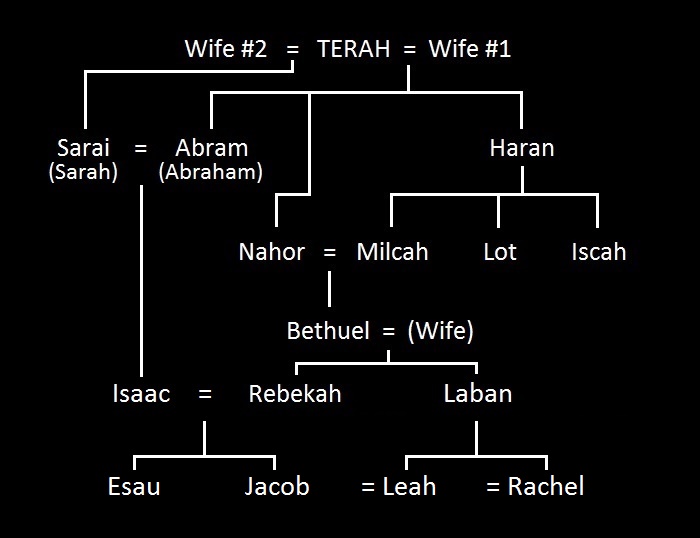
Based in the latest calculation in last week's Torah portion of Toldoth, in the book of Genesis, Jacob was seventy six years old when he arrived to Padan Aram. After seven years, this would put Jacob's age at eighty three years old.
This is a chart revealing the year and ages of Jacob's ancestors when Jacob was eighty three years old
| YEAR OF MAN WHEN JACOB WAS 83 YEARS OLD | NAME OF JACOB'S ANCESTOR | AGE OF JACOB'S ANCESTORS WHEN JACOB WAS 83 YEARS OLD | AGE OF DEATH OF JACOB'S ANCESTORS |
| 2191 YEARS OF MANKIND | Isaac | 143 years old | 180 years old |
If the calculation is correct, this would take the time line to about 1809 BC.
By the time that Jacob and Esau were eighty four years old, according to Wikipedia, based on the time line, the king who ruled in Egypt was Maakherure Amenemhat IV who ruled from 1815-1807 BC of the Twelfth Dynasty, in the Middle Kingdom. This is what Wikipedia says regarding Maakherure Amenemhat IV:
"Amenemhat IV first came to power as a junior coregent of his predecessor Amenemhat III, whose reign marks the apex of the Middle Kingdom period. The coregency is well attested by numerous monuments and artefacts where the names of the two kings parallel each other. The length of this coregency is uncertain; it could have lasted from one to seven years, although most scholars believe it was only two years long. The Turin Canon, a king list redacted during the early Ramesside period, records Amenemhat IV on Column 6, Row 1, and credits him with a reign of 9 years, 3 months and 27 days. Amenemhat IV is also recorded on Entry 65 of the Abydos King List and Entry 38 of the Saqqara Tablet, both of which date to the New Kingdom.
In spite of the Turin canon, the duration of Amenemhat's reign is uncertain. It was given as eight years under the name Ammenemes in Manetho's Aegyptiaca. In any case, Amenemhat's rule seems to have been peaceful and uneventful. Amenemhat IV is well attested by contemporary artefacts, including a number of scarab- and cylinder-seals".
These are statue images of Maakherure Amenemhat IV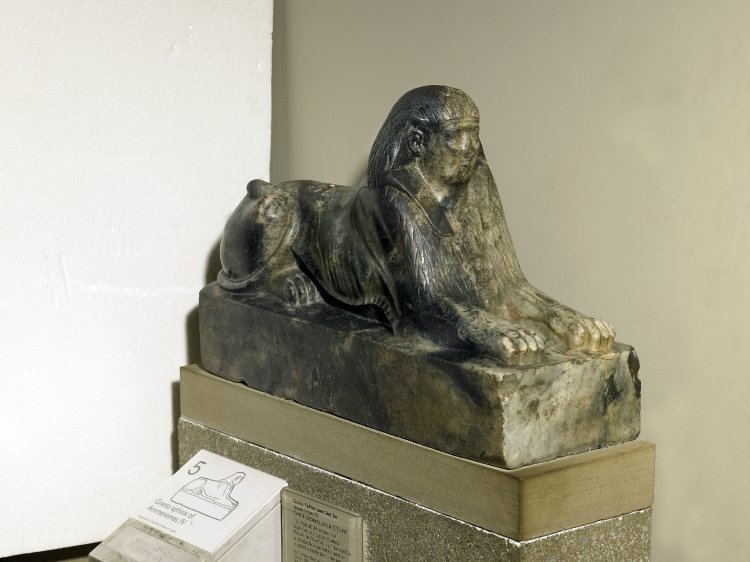
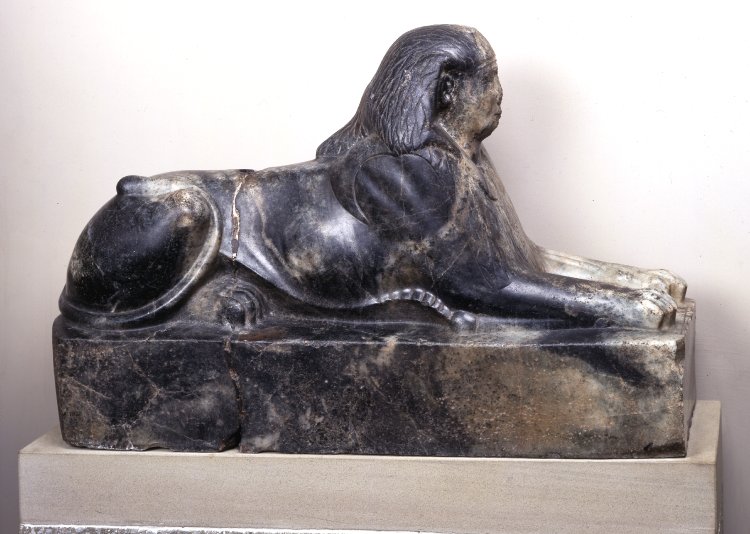
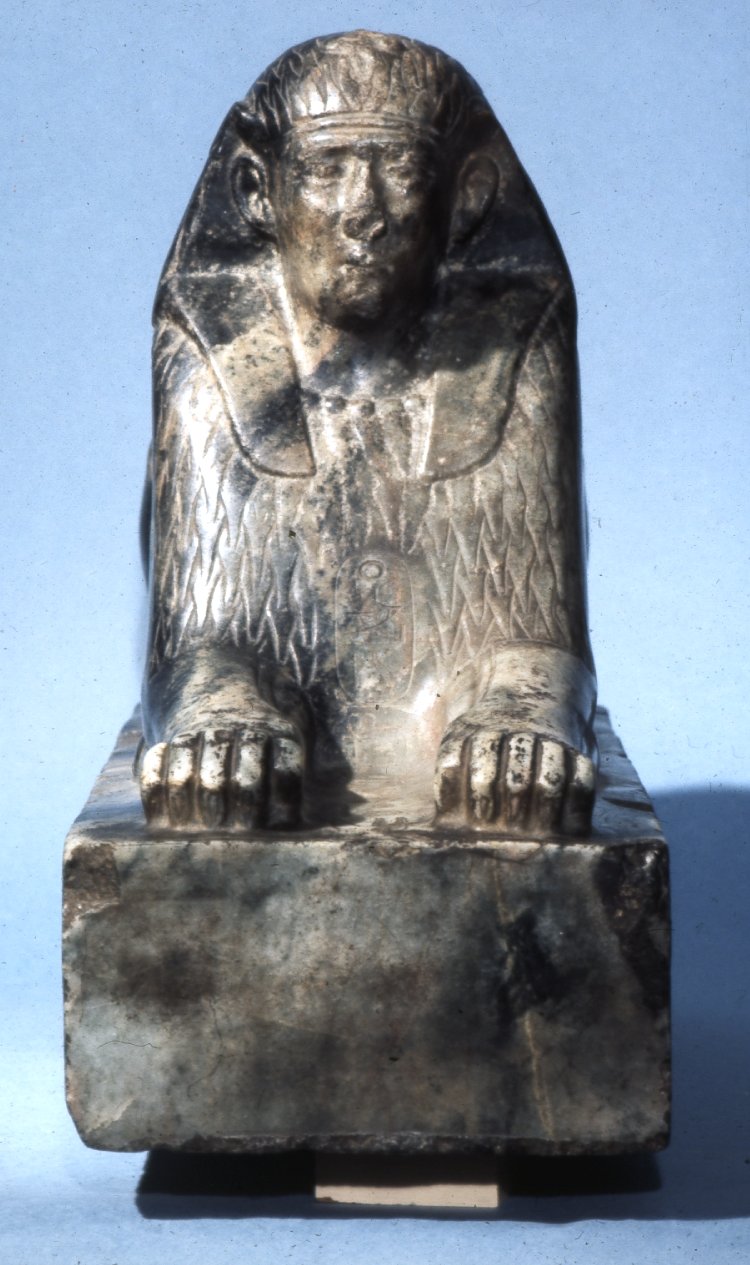
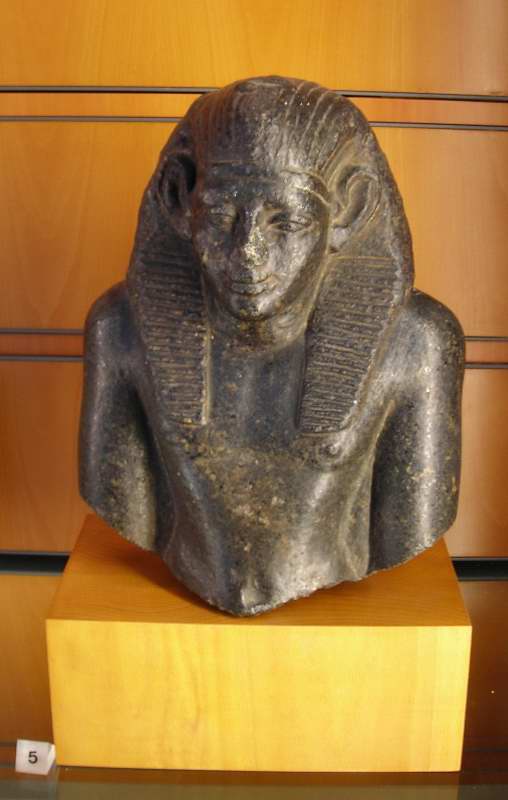
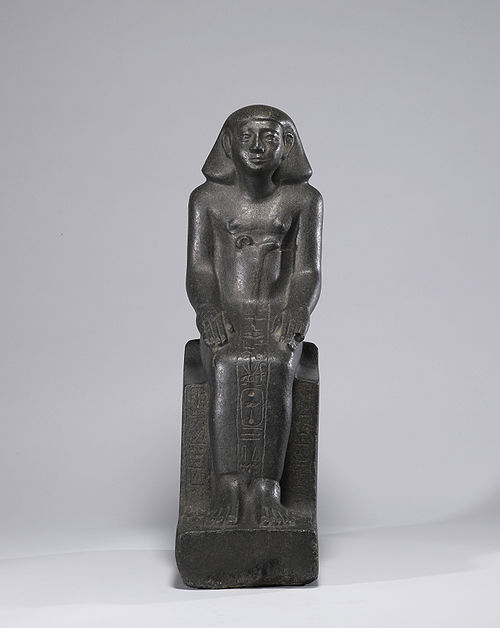
Verse thirty-one
31 And hwhy saw for Leah was hated, and opened ta-her womb (uterus, matrix): and Rachel was barren.
hwhy said to Jacob, "OK, I will make Leah fruitful and close Rachel's womb to teach you a lesson". hwhy did not like the favoritism of Rachel over Leah.
Why did hwhy say that Jacob "hated" Leah when it says that Jacob "loved Rachel more than Leah", or, loved Leah less? This is the similar matter in last week's commentary on the Torah portion of Toldoth, that hwhy loved Jacob but hated Esau, which is noted by the apostle Paul in his letter to the assembly in Rome
Romans 9:13 As it is written, Jacob have I loved, but Esau have I hated.
Funny that hwhy loved Jacob, but yet Jacob hates the firstborn daughter, probably because Leah did not speak to Jacob when he came into the room on their wedding night to tell him that she was not Rachel. It was most likely that Jacob had never forgave Leah for being part of Laban's deceptive plot to prevent him from having Rachel, and blamed her for being her father's accomplice.
This account of Jacob was most likely the basis for Moses to wrote in the Torah regarding favoritism to another wife, which is noted in the Torah portion of Ki Theytsey, in the book of Deuteronomy
Deuteronomy 21:15 If they shall be to a man two wives, the one loved and the one hated, and they have birthed to him sons, the loved one and the hated one; and shall be the son that was firstborn by the hated one: 16 and shall be in the day of the inheriting of him of ta-his sons, ta which belongs to him, shall not be able for the firstborn [(to have the firstborn)] of ta-the son of the loved one being over (upon) the face of the son of the hated one of the firstborn [(that was firstborn)]: 17 for the firstborn, the son of the hated one, shall be respected (regarded) to be given to him the mouth of double in (among) all which shall be found to him: for he is the first of his vigor (strength, might, ability); to him is the justice (ordinance) of the firstborn.
Moses resolved this situation by saying that no father, let alone no husband, has the right to favor the one loved over the other hated.
The Hebrew word for the phrase "was hated" is "s'noh-ah"- Shin, Nun, Vav, Aleph, Heh (hawns). Normally the Hebrew base word is Shin, Nun, Aleph (ans), but in this case, the Vav is added in the Hebrew text. The Vav in the Paleo-Hebrew is a picture of a nail. To me it is saying that Jacob nailed his hatred against Leah for going along with the deception.
These next verses are the beginning of the births of the sons of Jacob:
Verse thirty two
32 And Leah, she conceived, and she birthed a son, and she called his name, Reuben: for had said of her, For hwhy had seen on my affliction; for now my man (husband) will love me.
Looking at the word REUBEN
The Hebrew word for Reuben is "R'oo-veyn"- Resh, Aleph, Vav, Ben, Nun Sophit (Nbwar). It is from Strong's Concordance number 7205, and its defintion
From the imperative of H7200 and H1121; see ye a son; Reuben, a son of Jacob: - Reuben.
Reu
from 7200 "rah-ah" (har), and its definition
A primitive root; to see, literally or figuratively (in numerous applications, direct and implied, transitively, intransitively and causatively): - advise self, appear, approve, behold, X certainly, consider, discern, (make to) enjoy, have experience, gaze, take heed, X indeed, X joyfully, lo, look (on, one another, one on another, one upon another, out, up, upon), mark, meet, X be near, perceive, present, provide, regard, (have) respect, (fore-, cause to, let) see (-r, -m, one another), shew (self), X sight of others, (e-) spy, stare, X surely, X think, view, visions.
Ben
from 1121 "beyn" (Nb), and its definition
From H1129; a son (as a builder of the family name), in the widest sense (of literal and figurative relationship, including grandson, subject, nation, quality or condition, etc., (like H1, H251, etc.): - + afflicted, age, [Ahoh-] [Ammon-] [Hachmon-] [Lev-]ite, [anoint-]ed one, appointed to, (+) arrow, [Assyr-] [Babylon-] [Egypt-] [Grec-]ian, one born, bough, branch, breed, + (young) bullock, + (young) calf, X came up in, child, colt, X common, X corn, daughter, X of first, + firstborn, foal, + very fruitful, + postage, X in, + kid, + lamb, (+) man, meet, + mighty, + nephew, old, (+) people, + rebel, + robber, X servant born, X soldier, son, + spark, + steward, + stranger, X surely, them of, + tumultuous one, + valiant[-est], whelp, worthy, young (one), youth.
from 1129 "banah" (hnb), and its definition
A primitive root; to build (literally and figuratively): - (begin to) build (-er), obtain children, make, repair, set (up), X surely.
Reuben means "See, a Son".
Verse thirty three
33 And she conceived still, and she birthed a son; and she said, For hwhy had heard for I am hated, and has given to me ta-this one: And she called his name, Simeon.
Looking at the word SIMEON
The Hebrew name for Simeon is "Shee-mohn"- Shin, Mem, Ayin, Vav, Nun Sophit (Nwems). It is from Strong's Concordance number 8095, and its defintion
From H8085; hearing; Shimon, one of Jacob’s sons, also the tribe descendant from him: - Simeon.
from 8085 "shah-mah" (ems), and its definition
A primitive root; to hear intelligently (often with implication of attention, obedience, etc.; causatively to tell, etc.): - X attentively, call (gather) together, X carefully, X certainly, consent, consider, be content, declare, X diligently, discern, give ear, (cause to, let, make to) hear (-ken, tell), X indeed, listen, make (a) noise, (be) obedient, obey, perceive, (make a) proclaim (-ation), publish, regard, report, shew (forth), (make a) sound, X surely, tell, understand, whosoever [heareth], witness.
Simeon means "Hear".
Verse thirty four
34 And she conceived still, and she birthed a son; and she said, Now is the time my man (husband) shall be joined to me, for I have birthed to him three sons: Upon thus, was called his name, Levi.
Looking at the word LEVI
The Hebrew name for Levi is "Ley-vee"- Lamed, Vav, Yod (ywl). It is from Strong's concordance number 3878, and its defintion
From H3867; attached; Levi, a son of Jacob: - Levi. See also H3879, H3881.
from 3867 "lah-vah" (hwl), and its definition
A primitive root; properly to twine, that is, (by implication) to unite, to remain; also to borrow (as a form of obligation) or (causatively) to lend: - abide with, borrow (-er), cleave, join (self), lend (-er).
Levi means "Joined" or "Cleave".
Verse thirty five
35 And she conceived still, and she birthed a son: and she said, This time, I will thank (praise) ta-hwhy: Upon thus, was called his name, Judah; and she had stood (stilled) from birthing.
Looking at the word JUDAH
The Hebrew name for Judah is "Y'hoo-dah"- Yod, Heh, Vav, Dalet, Heh (hdwhy). It is from Strong's concordance number 3063, and its definition
From H3034; celebrated; Jehudah (or Judah), the name of five Israelites; also of the tribe descended from the first, and of its territory: - Judah.
from 3034 "yah-dah" (hdy), and its definition
A primitive root; used only as denominative from H3027; literally to use (that is, hold out) the hand; physically to throw (a stone, an arrow) at or away; especially to revere or worship (with extended hands); intensively to bemoan (by wringing the hands): - cast (out), (make) confess (-ion), praise, shoot, (give) thank (-ful, -s, -sgiving).
Judah means "Thank", or "Praise".
These are the sons Leah bore so far:
1st born, Reuben: "See, a son"- now Jacob will love me
2nd born, Simeon: "Heard"- because Jacob hated me
3rd born: Levi, "Joined"- Jacob will be joined unto me for having three sons
4th born, Judah: "Praise"- I will praise hwhy
Notice the first three sons Leah bore she emphasized that Jacob will come to her, but the fourth son she emphasized hwhy. The lesson of this is do not look to man to get acceptance, but give hwhy praise.
Looking also at Leah's purpose for each of the first four sons she birthed, as her explanations decreased in her relation to Jacob and her relation to hwhy
Reuben: for now my husband will love me
Simeon: For hwhy had heard that I was hated
Levi: Now is the time my husband shall be joined to me
Judah: I will praise ta-hwhy
Also, Simeon was the one of whom Leah said that she was hated by Jacob. Leah's spirit of bearing Jacob's hatred would impact Simeon in a future time when he hated his younger brother, Joseph, and wanted to kill him, which is noted in the Torah portion of Vay-Yeyshev, in the book of Genesis
Genesis 37:19 And they said a man to his brother, Behold, this beyond master (husband) of the calm-dreams comes. 20 And come now, and we will kill (smite) him, and we will cast (throw, send) him in one of the bored-wells, and we will say, An evil beast has eaten him: And we shall see what shall become of his calm-dreams.
Later Joseph put Simeon in prison in Egypt because of his hatred for Joseph while the rest of their brothers returned to Canaan, noted in the Torah portion of Mikeyts, in the Torah portion of Genesis
Genesis 42:18 And Joseph said to them in the third day, This do, and live; I revere (give awe, fear) ta-The Elohim: 19 If you are honest, one of your brothers shall be imprisoned in the house of your keeping (guarding): and go of you, bring shever-grain at the famine of your houses: 20 And you will bring ta-your brother, the youngest, to me; and your words shall be confirmed (verified), and you shall not die. And they did so.
21 And they said each to his brother, Truly, we are guilty (shamed) upon our brother whom we saw the anguish (pain) of his soul in his beseeching (imploring) to us, and we did not listen; upon thus, this distress (anguish, pain) has come to us. 22 And Reuben answered them, to say, That not (to him) I say to you, to say, Do you not sin against the child; and you did not listen? And also behold, his blood is required. 23 And they did not know not that Joseph heard them; for the interceder was between them. 24 And turned from upon them, and wept; and returned to them, and spoke to them, and took from them ta-Simeon, and bound (imprisoned) him to their eyes.
It is well accepted that the reson Simeon was in prison, because it was he that initiated the idea to kill Joseph.
The name Levi, meaning "joined", would be an impact later in life as well when he "joined" Simeon to destroy the men in Shechem for the sake of their younger sister, which is noted in the Torah portion of Vay-Yishlakh, in the book of Genesis
Genesis 34:25 And was, on the third day, in their being of pain, and two of the sons of Jacob, Simeon and Levi, brothers of Dinah, they took a man his sword, and they came boldly (securely) upon the city, and they slaughtered (slayed) every male (remembered one). 26 And they slaughtered (slayed) ta-Hamor and ta-Shechem, his son, by the mouth of the sword, and they took ta-Dinah from the house of Shechem, and they went out.
Also, in the future, the tribe of Levi would be joined to Moses at Mount Sinai and later would be joined to hwhy, being His priests for His service.
CHAPTER 30
Genesis 30:1-43
Gen 30:1 And Rachel, she saw for she was not birthing to Jacob, and Rachel, she was jealous against her sister; and she said to Jacob, Bring (Give) to me sons, and if is none, I will die. 2 And the anger of Jacob glowed against Rachel: and said, Am I of the place [(Am I of under, Am I instead)] of Elohim which withheld (restrained, refrained) from you the fruit of the womb? 3 And she said, Behold, my female servant, Bilhah, go to her; and she shall birth upon my knees, and I, also I will build from her.
4 And she gave to him ta-Bilhah, her female servant, for a woman (wife): and Jacob gone (went) to her. 5 And Bilhah, she conceived, and she birthed to Jacob a son. 6 And Rachel, she said, Elohim has judged me, and has also heard in my voice, and has given to me a son: Upon thus, was called his name, Dan.
7 And she conceived still, and Bilhah, female servant of Rachel, she birthed a second son to Jacob. 8 And Rachel, she said, The wrestlings (struggles) of Elohim, I have wrestled (struggled) with my sister, I have also prevailed [(I aslo was able)]: And she called his name, Naphtali.
9 And Leah, she saw for had stood (stilled) of her from birthing, and she took ta-Zilpah, her female servant, and she gave her to Jacob for a woman (wife). 10 And Zilpah, female servant of Leah, she birthed to Jacob a son. 11 And Leah, she said, Among the troop (Among fortune)]: And she called ta-his name, Gad.
12 And Zilpah, female servant of Leah, she birthed a second son to Jacob. 13 And Leah, she said, Among my happiness, for the daughters shall call me happy: And she called ta-his name, Asher.
14 And Reuben walked in the days of wheat harvest, and found love-apples in the field, and brought them to his mother, Leah. And Rachel, she said to Leah, Give to me now from the love-apples of your son. 15 And she said to her, Is that little of your taking ta-my man (husband)? And you are also taking away ta-the love-apples of my son? And Rachel, she said, For thus, shall lay with you the night (tonight) under (instead) of the love-apples of your son. 16 And Jacob came from the field in the mixing period (evening), and Leah, she went out to meet (encounter) him, and she said, You will come to me; for hiring, I have hired you on the love-apples of my son. And laid with her in that night. 17 And Elohim listened to Leah, and she conceived, and she birthed to Jacob a fifth son. 18 And Leah, she said, Elohim has given my hire (payment, wages), of which I have given my female servant to my man (husband): And she called his name, Issachar.
19 And Leah, she conceived still, and she birthed a sixth son to Jacob. 20 And Leah, she said, Elohim has endowed (bestowed, conferred, endured, confided, invested) with me a good dowry (gift); This time, my man (husband) shall inclose (reside) with me, for I have birthed to him six sons: And she called ta-his name, Zebulun.
21 And afterwards she birthed a daughter, and she called ta-her name, Dinah.
22 And Elohim remembered ta-Rachel, and Elohim listened to her, and opened ta-her womb (uterus, matrix). 23 And she conceived, and she birthed a son; and she said, Elohim has removed (withdrew) ta-my reproach: 24 And she called ta-his name, Joseph; to say, hwhy shall add to me another son.
25 And was, as the which Rachel birthed ta-Joseph, and Jacob said to Laban, Send me away, and I may go to my place and to my land. 26 Give ta-my wives and ta-my children which I have served you on them, and I will go: for you, you know ta-my service which I have served you. 27 And Laban said to him, If now I have found grace (favor) in your eyes: I have been divining (making enchantments, making spells), and hwhy has blessed me on your circumstance (occasion). 28 And he said, Puncture (Perforate, Pierce, Specify) your wages upon me, and I will give her. 29 And said to him, You, you know ta which I have served you, and ta which your livestock has been with me. 30 For little which was to you was to my face and has spread out for a multitude; and hwhy has blessed you to my feet: and now when shall I do, also I, for my house? 31 And said, What shall I give to you? And Jacob said, You shall not give to me anything: If you will do for me this word; I will return, I will tend, and I will guard (keep, observe, heed) your flock: 32 I will go over among all of your flock the day (today) of the removing from there every spotted (speckled) and variegated lamb, and every brown (black) lamb among the sheep, and variegated and spotted (speckled) among the kids: and these shall be my wages. 33 And shall eye (testify) her on me of my righteousness in the day to come [(in the latter day)] when you come upon my wages to your face of all which, they are not spotted (speckled) and variegated among the kids, and brown (black) among the sheep, he shall be stolen with me. 34 And Laban said, Behold, conditioning (to him), shall be according to your word, 35 and removed in that day ta-the kids: the ring streaked (bands, striped) and the variegated, and ta all of the kids: the spotted (speckled) and the variegated, and of all which were white on him, and all of the brown (black) among the sheep, and were given into the hands of his sons, 36 and set a journey of three days between himself and between Jacob: and Jacob was tending the remainder of ta-the flocks of Laban [(the ta-flocks of Laban that remained)].
37 And Jacob took for himself shoots of the fresh (green) Storax Tree, and the Almond Tree and the Plane Tree; and peeled (stripped, streaked) among them peelings (strips, streaks) of white, revealing the white which was upon the shoots, 38 and placed (stood) ta-the shoots which were peeled (stripped, streaked) in the gutters in the troughs of the water which the flocks, they came to imbibe (drink) at the nokakh-front (nokakh-opposite, nokakh-before) of the flocks, and were in heat in their coming to imbibe (drink). 39 And the flocks, they were of heat to the shoots, and the flocks, they birthed ring streaked (bands, stripes), spotted (speckled), and variegated. 40 And Jacob split (separated, divided) the sheep, and gave the faces of the flock to the ring streaked (striped, banded), and all of the brown (black) among the flocks of Laban; and put (set) for himself droves by his apartness, and did not put (set) them upon the flocks of Laban. 41 And was among all in heat of the girded (compacted) flocks, and Jacob put (set) ta-the shoots to the eyes of the flocks in the gutters to be in heat among the shoots, 42 and were not put among the feebleness of the flocks: And was the feeble ones belonging to [(were for)] Laban and the stronger (girded) ones belonging to [(were for)] Jacob. 43 And the man spread out (scattered) much, much, and were to him multiple flocks, and female servants, and male servants, and camels, and donkeys.
(NOTE: Not all verses will have comments)
A good portion of this chapter shows the two sisters going through sibling rivalry and sibling competition between each other.
Verses one and two
1 And Rachel, she saw for she was not birthing to Jacob, and Rachel, she was jealous against her sister; and she said to Jacob, Bring (Give) to me sons, and if is none, I will die. 2 And the anger of Jacob glowed against Rachel: and said, Am I of the place [(Am I of under, Am I instead)] of Elohim which withheld (restrained, refrained) from you the fruit of the womb?
Rachel was in a threatening and commanding state to have Jacob make her pregnant and birth sons. How did Jacob finally woke up and realized that hwhy was in control of Rachel's womb? Possibilities were that Jacob must have been told in the past by Isaac or Abimelech, King of Gerar, that King Abimelech's wives' wombs were closed on account of Sarah whom King Abimelech took in for a wife. Also, Jacob could have been told by Rebekah, his mother, that she was barren before she birthed Jacob, and could have been told also that his grandmother, Sarah, was barren before she birthed Isaac.
One can play on the nobility card by saying that there is pedigree of female nobility in this heritage:
Sarah, the first "Barreness" of Canaan
Rebekah, the second "Barreness" of Canaan
Rachel, the third "Barreness" of Aram
Verse three
3 And she said, Behold, my female servant, Bilhah, go to her; and she shall birth upon my knees, and I, also I will build from her.
This is comparable to Sarah giving Abraham, her handmaid, Hagar "the Stranger" to wife and to bear a son for her by birthing on her knees.
Looking at the word BILHAH
The Hebrew word for Bilhah is "Beel-hah"- Bet, Lamed, Heh, Heh (hhlb). It is from Strong's Concordance number 1090, and its definition
From H1089; timid; Bilhah, the name of one of Jacob’s concubines; also of a place in Palestine: - Bilhah.
from 1089 "bah-lah" (hlb), and its definition
A primitive root (rather by transposition for H926); to palpitate; hence (causatively) to terrify: - trouble.
Bilhah means "Trouble".
Sounds like that Bilhah was a "troublemaker", and her name's meaning was proven correctly when Reuben went into Bilhah later, which is noted in the Torah portion of Vay-Yishlakh, in the book of Genesis
Genesis 35:22 And was, in the dwelling of Israel in that land, and Reuben went and laid with ta-Bilhah, the concubine of his father: and Israel heard....
Verses four through six
4 And she gave to him ta-Bilhah, her female servant, for a woman (wife): and Jacob gone (went) to her. 5 And Bilhah, she conceived, and she birthed to Jacob a son. 6 And Rachel, she said, Elohim has judged me, and has also heard in my voice, and has given to me a son: Upon thus, was called his name, Dan.
Looking at the word DAN
The Hebrew word for Dan is "Dahn"- Dalet, Nun Sophit (Nd). It is from Strong's Concordance number 1835, and its defintion
From H1777; judge; Dan, one of the sons of Jacob; also the tribe descended from him, and its territory; likewise a place in Palestine colonized by them: - Dan.
from 1777 "deen" or "doon" (Nyd or Nwd), and its definition
A primitive root (compare H113); to rule; by implication to judge (as umpire); also to strive (as at law): - contend, execute (judgment), judge, minister judgment, plead (the cause), at strife, strive.
Dan means "Judge".
Verse seven and eight
7 And she conceived still, and Bilhah, female servant of Rachel, she birthed a second son to Jacob. 8 And Rachel, she said, The wrestlings (struggles) of Elohim, I have wrestled (struggled) with my sister, I have also prevailed [(I aslo was able)]: And she called his name, Naphtali.
Looking at the word NAPHTALI
The Hebrew word for Naphtali is "Naph-tah-lee"- Nun, Peh, Tav, Lamed, Yod (yltpn). It is from Strong's Concordance number 5321, and its defintion
From H6617; my wrestling; Naphtali, a son of Jacob, with the tribe descended from him, and its territory: - Naphtali.
from 6617 "pah-thahl" (ltp), and its definition
A primitive root; to twine, that is, (literally) to struggle or (figuratively) be (morally) tortuous: - (shew self) froward, shew self unsavoury, wrestle.
Naphtali means "Wrestle".
Verses nine through eleven
9 And Leah, she saw for had stood (stilled) of her from birthing, and she took ta-Zilpah, her female servant, and she gave her to Jacob for a woman (wife). 10 And Zilpah, female servant of Leah, she birthed to Jacob a son. 11 And Leah, she said, Among the troop (Among fortune)]: And she called ta-his name, Gad.
Leah, now barren, by giving her handmaid Zilpah to Jacob, was now competing with her sister Rachel. This is the earliest account of Biblical or third party sources of "Sibling Rivalry" through the giving of their female servants to Jacob for wives. I wondered how they felt about Jacob having other wives than them after the fact? Did they felt like they were in competition as well against their female servants to get Jacob's attention? Just a speculation.
Looking at the word ZILPAH
The Hebrew word for Zilpah is "Zeel-pah"- Zayin, Peh, Lamed, Heh (hlpz). It is from Strong's Concordance number 2153, and its defintion
From an unused root apparently meaning to trickle, as myrrh; fragrant dropping; Zilpah, Leah’s maid: - Zilpah.
Zilpah means "Trickle".
She must have trickled out of her mother's womb, and that is why she was named that.
Looking at the word GAD
The Hebrew word for Gad is "Gahd"- Gimel, Dalet (dg). It is from Strong's Concordance number 1410, and its defintion
From H1464; Gad, a son of Jacob, including his tribe and its territory; also a prophet: - Gad.
from 1164 "good" (dwg), and its definition
A primitive root (akin to H1413); to crowd upon, that is, attack: - invade, overcome.
from 1413 "gah-dahd" (ddg), and its definition
A primitive root (compare H1461); to crowd; also to gash (as if by pressing into): - assemble (selves by troops), gather (selves together, self in troops), cut selves.
Gad means "Troop".
Verses twelve and thirteen
12 And Zilpah, female servant of Leah, she birthed a second son to Jacob. 13 And Leah, she said, Among my happiness, for the daughters shall call me happy: And she called ta-his name, Asher.
Looking at the word ASHER
The Hebrew word for Asher is "Ah-sheyr"- Aleph, Shin, Resh (rsa). It is from Strong's Concordance number 836, and its defintion
From H833; happy; Asher, a son of Jacob, and the tribe descended from him, with its territory; also a place in Palestine: - Asher.
from 833 "ashar" or "ah-sheyr" (rsa or rsa), and its definition
A primitive root; to be straight (used in the widest sense, especially to be level, right, happy); figuratively to go forward, be honest, prosper: - (call, be) bless (-ed, happy), go, guide, lead, relieve.
Asher means "Blessed" or "Happy".
Verses fourteen and fifteen
14 And Reuben walked in the days of wheat harvest, and found love-apples in the field, and brought them to his mother, Leah. And Rachel, she said to Leah, Give to me now from the love-apples of your son. 15 And she said to her, Is that little of your taking ta-my man (husband)? And you are also taking away ta-the love-apples of my son? And Rachel, she said, For thus, shall lay with you the night (tonight) under (instead) of the love-apples of your son.
How did Reuben know to get the love-apples for his mother, Leah? It was most likely that his mother taught him about plants herself, what they looked like and their capabilities. Reuben was just a young child when he found these, probably at the most ten years old. One could say that he was told, in a way, about the birds and the bees at a very young age. No wonder why he laid with Zilpah, Rachel's concubine, later in life. Yair Davidiy of Hebrew Nations and Brit Am noted that the descendants of Reuben is France and France is well known for
"loving".
These love-apples are also called mandrakes, from the species Mandragora Officinarum. These are images and drawings of love-apples, or mandrakes, that Reuben most likely saw in the field in his day.
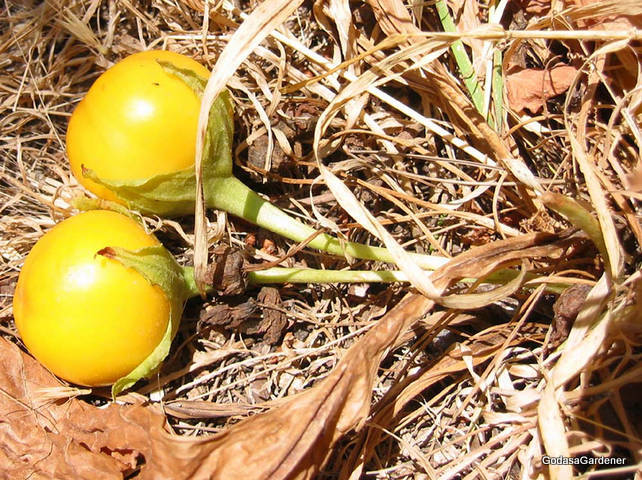

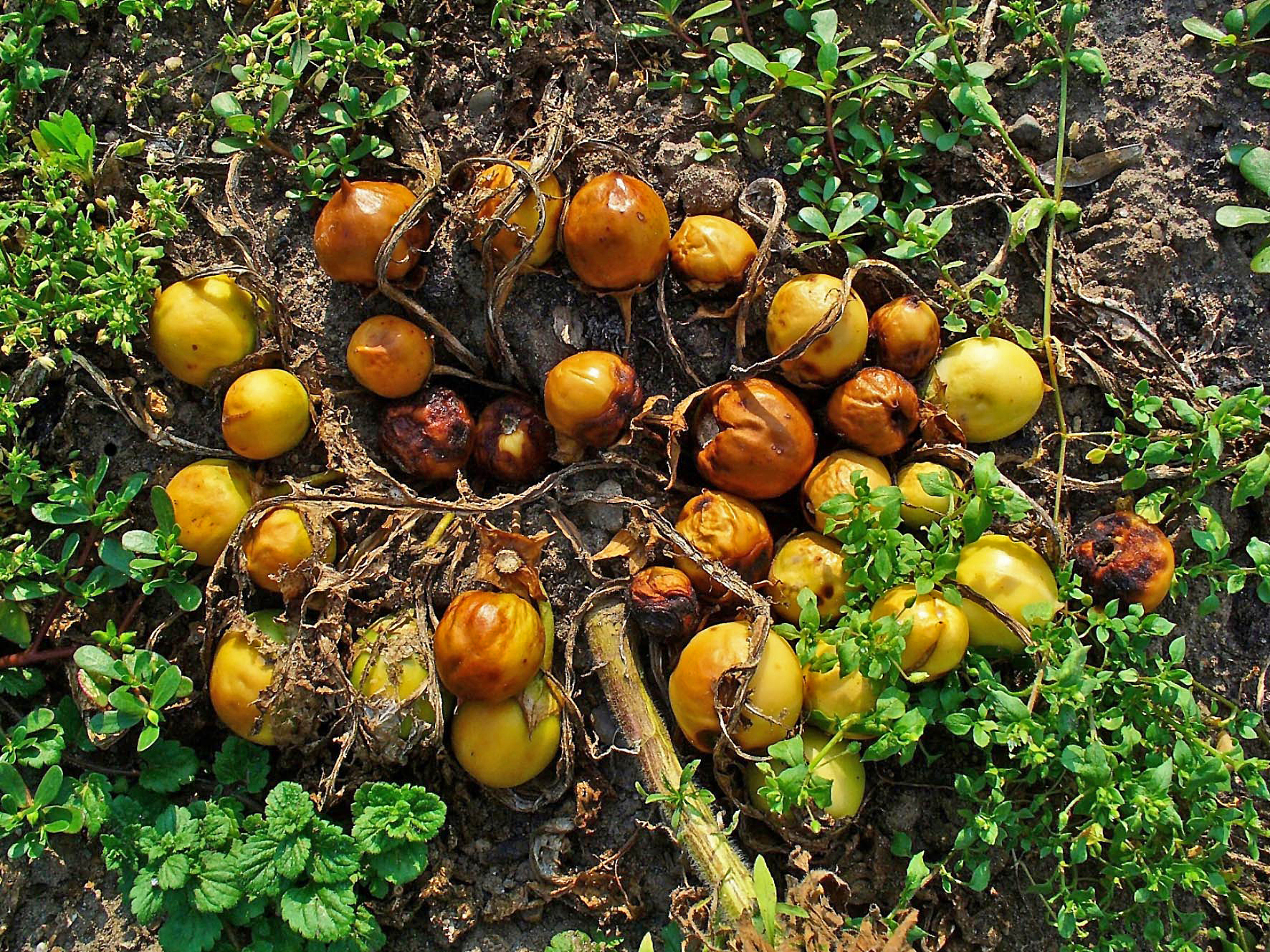
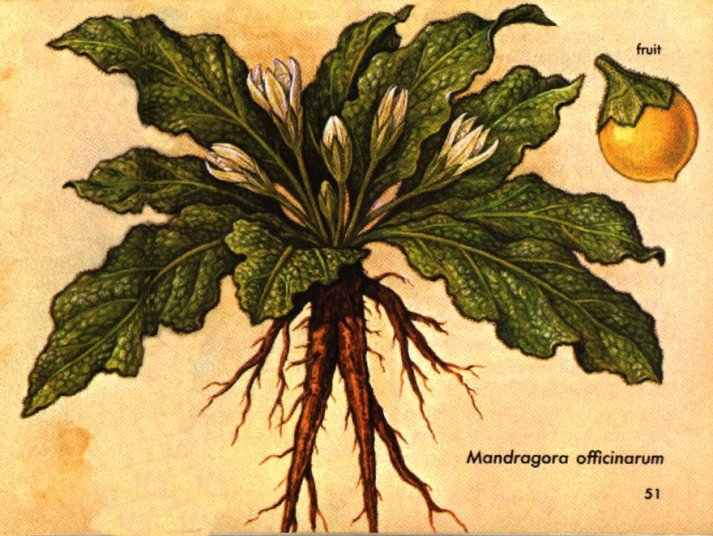
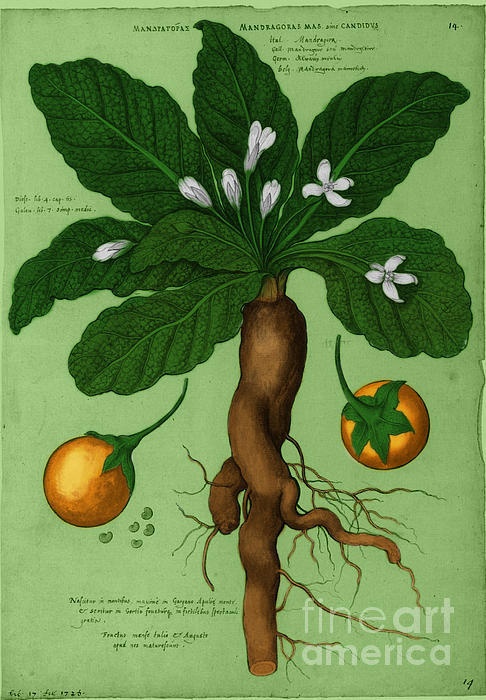
These are the roots. Notice the shape of the roots
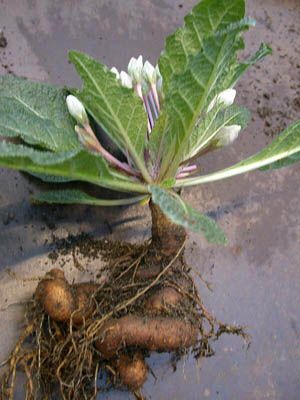
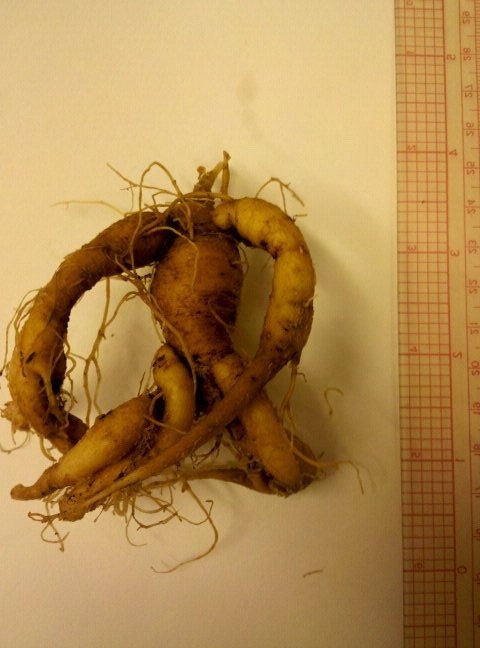
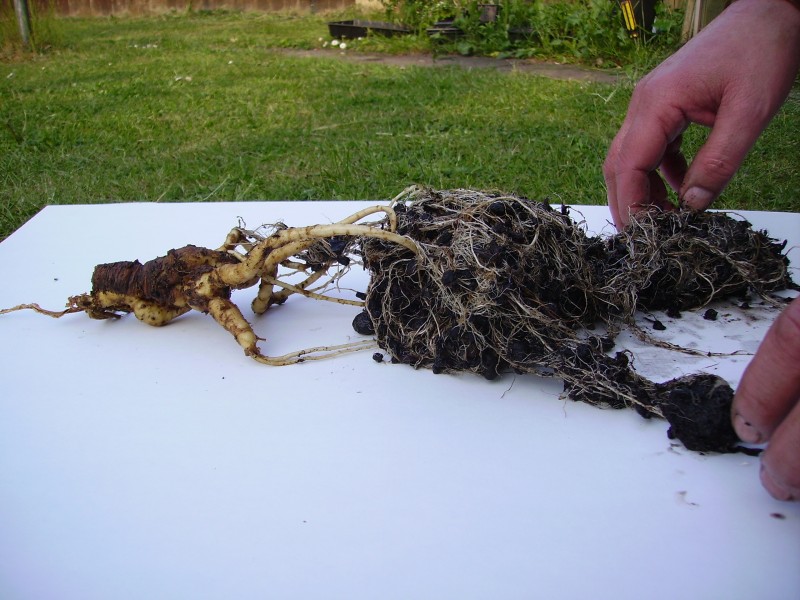
They almost have a "human" like formation. According to Wikipedia, these plants are poisonous. The fruit would have been the only safe part of the whole plant to eat, and most likely would have had properties to make one fertile. This is the general information of what Wikipedia says regarding the fruit:
"The fruit which forms in late autumn to early summer (November to June) is a berry, shaped like a globe or an ellipsoid (i.e. longer than wide), with a very variable diameter of 5–40 mm (0.2–1.6 in). When ripe, the fruit is glossy, and yellow to orange – somewhat resembling a small tomato. It contains yellow to light brown seeds, 2.5–6 mm (0.10–0.24 in) long".
Notice how Rachel has been so desperate for so long to get pregnant so much that she will even take Reuben's love-apples away from Leah.
Indirectly related, this account occurred during "the wheat harvest". Another account of the wheat harvest, which is noted in the book of Ruth
Ruth 2:20 And Naomi said unto her daughter-in-law, Blessed be he of hwhy, who hath not left off His Kindness to ta-the living and to ta-the dead. And Naomi said unto her, The man is near of kin unto us, one of our next kinsmen. 21 And Ruth the Moabitess said, He said unto me also, Thou shalt keep fast by my young men, until they have ended ta all my harvest. 22 And Naomi said unto Ruth her daughter-in-law, It is good, my daughter, that thou go out with his maidens, that they meet thee not in any other field. 23 So she kept fast by the maidens of Boaz to glean unto the end of barley harvest and of wheat harvest; and dwelt with ta-her mother-in-law.
My question regarding this Torah portion passage is "Did this Torah portion passage occured during the precursor time line of the the Feast of Shavuoth, a.k.a. Pentecost, knowing now the time that the fruit ripened as late as June"? I am leaning that this account occurred during the time of Shavuoth.
This continues in the next Torah portion passage.
Verses sixteen through eighteen
16 And Jacob came from the field in the mixing period (evening), and Leah, she went out to meet (encounter) him, and she said, You will come to me; for hiring, I have hired you on the love-apples of my son. And laid with her in that night. 17 And Elohim listened to Leah, and she conceived, and she birthed to Jacob a fifth son. 18 And Leah, she said, Elohim has given my hire (payment, wages), of which I have given my female servant to my man (husband): And she called his name, Issachar.
Here comes Jacob coming back from work tired and no doubt wanting to go into his tent to rest, and then Leah runs out to say to him, "Your coming into my tent tonight, honey, for I have "hired" you", and Jacob replies, "Oh no! More work!" :) .
Looking at the word ISSACHAR
The Hebrew word for Issachar is "Yees-ahs-khahr"- Yod, Shin, Shin, Kaph, Resh (rkwssy). It is from Strong's Concordance number 3485, and its defintion
From H5375 and H7939; he will bring a reward; Jissaskar, a son of Jacob: - Issachar.
Issa
from 5375 "nah-sah" (asn), and its definition
A primitive root; to lift, in a great variety of applications, literally and figuratively, absolutely and relatively: - accept, advance, arise, (able to, [armour], suffer to) bear (-er, up), bring (forth), burn, carry (away), cast, contain, desire, ease, exact, exalt (self), extol, fetch, forgive, furnish, further, give, go on, help, high, hold up, honourable (+ man), lade, lay, lift (self) up, lofty, marry, magnify, X needs, obtain, pardon, raise (up), receive, regard, respect, set (up), spare, stir up, + swear, take (away, up), X utterly, wear, yield.
Char
from 7939 "sah-khahr" (rks), and its definition
From H7936; payment of contract; concretely salary, fare, maintenance; by implication compensation, benefit: - hire, price, reward [-ed], wages, worth.
from 7936 "sah-khahr" (rks), and its definition
The second form by permutation and used in Ezr_4:5; a primitive root (apparently akin (by prosthesis) to H3739 through the idea of temporary purchase; compare H7937); to hire: - earn wages, hire (out self), reward, X surely.
Issachar means "Wages" or "Hired".
Leah might as well have said I have "scored" with my husband.
Applying to the previous Torah portion passage in verses fourteen and fifteen, nine months from this time line would take it to the twelfth Biblical month of Av, this would mean that Issachar would have been in the twelfth Biblical month of Av. This was the same month that Moses was born, which is based in the Torah portion of Vay-Yeylyekh, in the book of Deueteronomy
Deuteronomy 31:1 And Moses went and spoke ta-these Words to all of Israel. 2 And said to them, I am a son of a hundred and twenty years today;...
Based on my caluclations, Moses was born on the seventh day of the twelfth Biblical month of Av, which could put Issachar and Moses close, if not, to be born on the same day.
Verses nineteen and twenty
19 And Leah, she conceived still, and she birthed a sixth son to Jacob. 20 And Leah, she said, Elohim has endowed (bestowed, conferred, endured, confided, invested) with me a good dowry (gift); This time, my man (husband) shall inclose (reside) with me, for I have birthed to him six sons: And she called ta-his name, Zebulun.
Looking at the word ZEBULUN
The Hebrew worde for Zebulun is "Z'voo-loon"- Zayin, Bet, Lamed, Vav, Nun Sophit (Nwlbz). It is from Strong's Concordance number 2074, and its defintion
From H2082; habitation; Zebulon, a son of Jacob; also his territory and tribe: - Zebulun.
from 2082 "zah-vahl" (lbz), and its definition
A primitive root; apparently properly to inclose, that is, to reside: - dwell with.
Zebulun means "Reside".
Verse twenty-one
21 And afterwards she birthed a daughter, and she called ta-her name, Dinah.
Looking at the word DINAH
The Hebrew word for Dinah is "Dee-nah"- Dalet, Yod, Nun, Heh (hnyd). It is from Strong's Concordance number 1783, and its defintion
Feminine of H1779; justice; Dinah, the daughter of Jacob: - Dinah.
from 1779 "deen" or "doon" (Nyd or Nwd), and its definition
From H1777; judgment (the suit, justice, sentence or tribunal); by implication also strife: - cause, judgment, plea, strife.
from 1777 "deen" or "doon" (Nyd or Nwd), and its definition
A primitive root (compare H113); to rule; by implication to judge (as umpire); also to strive (as at law): - contend, execute (judgment), judge, minister judgment, plead (the cause), at strife, strive.
Dinah means "Judge".
Why did hwhy allow Leah's last child to be a daughter? Was this saying that it was the end of the line for Leah for birthing sons or birthing in general? I don't know.
Verse twenty two through twenty four
22 And Elohim remembered ta-Rachel, and Elohim listened to her, and opened ta-her womb (uterus, matrix). 23 And she conceived, and she birthed a son; and she said, Elohim has removed (withdrew) ta-my reproach: 24 And she called ta-his name, Joseph; to say, hwhy shall add to me another son.
hwhy did not say "Oh yeah, I forgot about Rachel". He saved the most loved for last. In a play on words, Yeshua said this, which is noted in the Gospel of Luke
Luke 13:30 And, behold, there are last which shall be first, and there are first which shall be last.
In this case, Rachel, who was loved of Jacob, was the last of the four wives to begin birthing children.
Also, when this verse says that hwhy remembered Rachel, it does not meant the He "forgot" her, but it means that she was next on His "priority list". In other words, hwhy had prerequisites by preparing other things according to His plan, in this case, before Rachel. And now that the other things were accomplished, hwhy can focus on His plan for Rachel to have sons.
Looking at the word JOSEPH
The Hebrew word for Joseph is "Yoh-seyph"- Yod, Vav, Samek, Peh Sophit (Powy). It is from Strong's Concordance number 3130, and its defintion
Future of H3254; let him add (or perhaps simply active participle adding); Joseph, the name of seven Israelites: - Joseph. Compare H3084.
from 3254 "yah-saph" (Poy), and its definition
A primitive root; to add or augment (often adverbially to continue to do a thing): - add, X again, X any more, X cease, X come more, + conceive again, continue, exceed, X further, X gather together, get more, give moreover, X henceforth, increase (more and more), join, X longer (bring, do, make, much, put), X (the, much, yet) more (and more), proceed (further), prolong, put, be [strong-] er, X yet, yield.
Joseph means "Add".
The weird thing regarding the last part of her statement was she did not say that hwhy shall be to her ten sons or five sons, but "another son". Why did she limit herself to "one" extra son? Did she make a prophecy to herself, because she knew in her heart that something was coming up, but didn't know what?
The other word that needs to be noticed in the Torah portion passage is "removed".
Looking at the word REMOVED (WIHDREW)
The Hebrew word for removed (withdrew) is "ah-saph"- Aleph, Samek, Peh Sophit (Poa). It is from Strong's Concordance number 622, and its defintion
A primitive root; to gather for any purpose; hence to receive, take away, that is, remove (destroy, leave behind, put up, restore, etc.): - assemble, bring, consume, destroy, fetch, gather (in, together, up again), X generally, get (him), lose, put all together, receive, recover [another from leprosy], (be) rereward, X surely, take (away, into, up), X utterly, withdraw.
This Hebrew indirectly connects with Joseph's name. In fact, it is my humble opinion that this is the true root word to his name, connecting his other two Hebrew word sources.
Basedd in my calcualtion, by the time Joseph was born, Jacob was about ninety years old.
This is a chart revealing the year and the ages of Jacob's ancestors when Jacob was ninety years old
| YEAR OF MAN WHEN JACOB WAS 90 YEARS OLD | NAME OF JACOB'S ANCESTOR | AGE OF JACOB'S ANCESTORS WHEN JACOB WAS 90 YEARS OLD | AGE OF DEATH OF JACOB'S ANCESTORS |
| 2198 YEARS OF MANKIND | Isaac | 150 years old | 180 years old |
If the calculation is correct, this would take the time line to about 1802 BC.
By the time that Jacob and Esau were ninety years old, according to Wikipedia, based on the time line, the queen who ruled in Egypt was Sobekkare Sobekneferu who ruled from 1807-1802 BC of the Twelfth Dynasty, in the Middle Kingdom. This is what Wikipedia says regarding Sobekkare Sobekneferu:
"Sobekneferu (sometimes written "Neferusobek") was an Egyptian woman reigning as pharaoh after the death of her brother Amenemhat IV. She was the last ruler of the Twelfth dynasty of Egypt and governed Egypt for almost four years from 1806 to 1802 BC. Her name means "the beauty of Sobek.
Sobekneferu was the first known woman reigning as pharaoh for which there is confirmed proof. There are five women who are believed to have ruled as early as the First Dynasty and Nitocris may have ruled in the Sixth Dynasty.
Amenemhat IV most likely died without a male heir; consequently, Amenemhat III's daughter, Sobekneferu, assumed the throne. According to the Turin Canon, she ruled for 3 years, 10 months, and 24 days in the late nineteenth century BC.
She died without heirs and the end of her reign concluded Egypt's brilliant Twelfth Dynasty and the Golden Age of the Middle Kingdom as it inaugurated the much weaker Thirteenth Dynasty".
These are statue images of Sobekkare Sobekneferu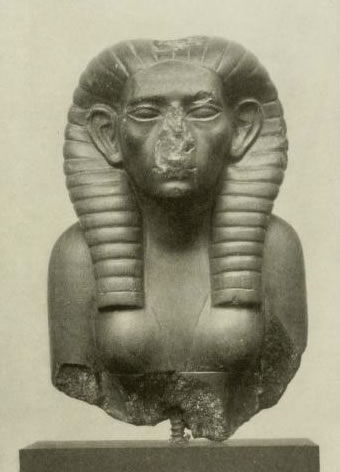
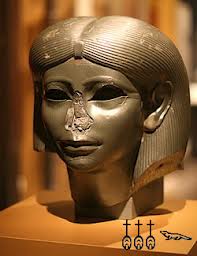
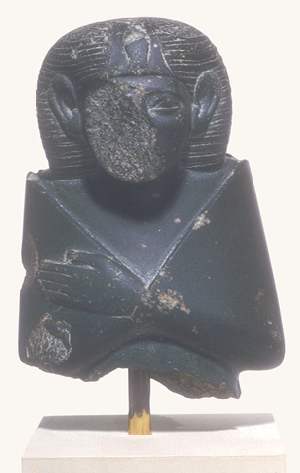
Sobekkare Sobekneferu was the last of the Pharaohs in the Twelfth Dynasty.
Also, another king ruled in Egypt, and he was Yakbim Skhaenre of the Fourteenth Dynasty, in the Second Intermediate Period, who reigned from 1805-1780 BC.
This is what Wikipedia says regarding the Second Intermediate Period:
"The Second Intermediate Period (1802–1550 BC) is a period of disarray between the end of the Middle Kingdom, and the start of the New Kingdom. It is best known as when the Hyksos, whose reign comprised the Fifteenth, made their appearance in Egypt.
The Thirteenth Dynasty was much weaker than the Twelfth Dynasty, and was unable to hold onto the two lands of Egypt. Either at the start of the dynasty, c. 1805 BC or toward the middle of it in c. 1710 BC, the provincial ruling family in Xois, located in the marshes of the eastern Delta, broke away from the central authority to form the Canaanite Fourteenth Dynasty".
Keep the Second Intermediate Period in mind as we go through the rest of the book of Genesis.This is what Wikipedia says regarding the Fourteenth Dynasty:
"The Fourteenth Dynasty was a local group from the eastern Delta, based at Avaris, that ruled from either from 1805 BC or c. 1710 BC until around 1650 BC. The dynasty comprised many rulers with West Semitic names and is thus believed to have been Canaanite in origin. It is here given as per Ryholt, however this reconstruction of the dynasty is heavily debated with the position of the five kings preceding Nehesy highly disputed".
This dispution includes Yakbim Skhaenre. This is what Wikipedia says regarding Yakbim Skhaenre:
This is a scarab seal image of Yakbim Skhaenre
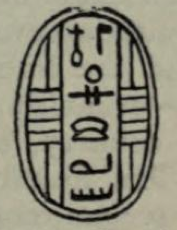
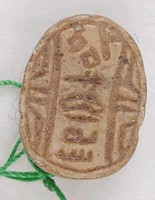
Verses twenty five and twenty six
25 And was, as the which Rachel birthed ta-Joseph, and Jacob said to Laban, Send me away, and I may go to my place and to my land. 26 Give ta-my wives and ta-my children which I have served you on them, and I will go: for you, you know ta-my service which I have served you.
Question, "Why did Jacob wait until Rachel became pregnant and gave birth to a son to tell Laban that he was leaving"? "Why didn't he leave after Leah and Bilhah and Zilpah birthed to him children"? Somehow, in his spirit, Jacob knew that Rachel was the "key factor" in hwhy's timing to leave, but hwhy will show him that it was not His time yet. He had successfully obtained a large family and finally a child by Rachel, but one substance is lacking in his family that hwhy wants him to obtain----> "livestock", a major necessity for life in the culture of the day.
By Laban hearing this, he remembered from last time when Eliezer, Abraham's elder servant, when he wanted to leave with Rebekah and return to Canaan, so he's doing what he can to keep Jacob for a very long time, if not for good.
Also, the reason Jacob said to Laban to "give" to him his wives and children, because Jacob was under contract to work for Laban for the second seven year period. Until then, they were still under Laban's ownership until the contract was fulfilled, then they became under Jacob's ownership. This was probably a basis for the Torah regarding a man working for seven years in the Torah portion of R'ey, in the book of Deuteronomy
Deuteronomy 15:12 If your brother, the Hebrite (Hebrew man), or the Hebritess (Hebrew woman), shall be sold to you, and shall serve you six years; and in the seventh year, you shall send him away free from with you. 13 And when you send him away free from with you, you shall not send him away empty: 14 Furnishing (Supplying), you shall furnish (supply) to him from your flock, and from you grain floor, and from your winepress: which hwhy, your Elohim, has blessed you, you shall give to him. 15 And you shall remember when you were slaves in the land of Egypt, and hwhy, your Elohim, redeemed you: upon thus, I am commanding you ta-this Word the day (today).
One can compare to this week's Torah portion passage when Eleizer, Abraham's senior servant ask Rebekah's family to send him away, which is noted in the Torah portion of Khai-yey Sarah, in the book of Genesis
Genesis 24:54 And they ate and they imbibed (drank), he and the men which were with him, and they lodged (stayed); And they arose in the breaking period (morning), and [Eliezer] said, Send me away to my lord (master).
Verses twenty seven
27 And Laban said to him, If now I have found grace (favor) in your eyes: I have been divining (making enchantments, making spells), and hwhy has blessed me on your circumstance (occasion).
This is an interesting point in this event. Laban had "divined", meaning he was doing a ritual activity to his pagan elohim.
Looking at the word DIVINING (ENCHANTMENTS, SPELLS)
The Hebrew word for divining (enchantments, spells) is "nah-khash"- Nun, Khet, Shin (sxn). It is from Strong's Concordance number 5172, and its defintion
A primitive root; properly to hiss, that is, whisper a (magic) spell; generally to prognosticate: - X certainly, divine, enchanter, (use) X enchantment, learn by experience, X indeed, diligently observe.
I want to compare this same Hebrew word to other Strong's Concordance numbers using the exact same word:
from 5175 "nah-khash" (sxn), and its definition
From H5172; a snake (from its hiss): - serpent.
from 5174 "nah-khash" (sxn), and its definition
(Chaldee); corresponding to H5154; copper: - brass.
from 5173 "nah-khash" (sxn), and its definition
From H5172; an incantation or augury: - enchantment.
from 5172 "nakhash" (sxn), and its definition
A primitive root; properly to hiss, that is, whisper a (magic) spell; generally to prognosticate: - X certainly, divine, enchanter, (use) X enchantment, learn by experience, X indeed, diligently observe.
This same word also interprets as "serpent" "copper" and "enchantment". Was the item that Laban was divining was to a copper serpent? I don't know the answer to that.
Verses twenty eight through thirty
28 And he said, Puncture (Perforate, Pierce, Specify) your wages upon me, and I will give her. 29 And said to him, You, you know ta which I have served you, and ta which your livestock has been with me. 30 For little which was to you was to my face and has spread out for a multitude; and hwhy has blessed you to my feet: and now when shall I do, also I, for my house?
Notice that Jacob did not give an answer immediately. In other words Jacob leaned Laban's "Labanism" tactics, and started with not answering to him, but explaining to him how much he blessed his uncle/father-in-law by noting the livestock that he produced did for Laban, BUT he has yet to produce livestock for his household.
Verses thirty-one through thirty four
31 And said, What shall I give to you? And Jacob said, You shall not give to me anything: If you will do for me this word; I will return, I will tend, and I will guard (keep, observe, heed) your flock: 32 I will go over among all of your flock the day (today) of the removing from there every spotted (speckled) and variegated lamb, and every brown (black) lamb among the sheep, and variegated and spotted (speckled) among the kids: and these shall be my wages. 33 And shall eye (testify) her on me of my righteousness in the day to come [(in the latter day)] when you come upon my wages to your face of all which, they are not spotted (speckled) and variegated among the kids, and brown (black) among the sheep, he shall be stolen with me. 34 And Laban said, Behold, conditioning (to him), shall be according to your word,
Jacob didn't state just goats and sheep, but specific kinds of goats and sheep.
Looking at the following words:
SPOTTED
The Hebrew word for spotted is "nah-kohd"- Nun, Kuph, Dalet (dqn). It is from Strong's Concordance number 5348, and its defintion
From an unused root meaning to mark (by puncturing or branding); spotted: - speckled.
VARIEGATED
The Hebrew word for varigated is "tah-lah"- Tet, Lamed, Aleph (alj). It is from Strong's Concordance number 2921, and its defintion
A primitive root; properly to cover with pieces; that is, (by implication) to spot or variegate (as tapestry): - clouted, with divers colours, spotted.
BROWN
The Hebrew word for brown is "khoom"- Khet, Vav, Mem Sophit (Mwx). It is from Strong's Concordance number 2345, and its defintion
From an unused root meaning to be warm, that is, (by implication) sunburnt or swarthy (blackish): - brown.
These images are examples of the kinds of sheep and goats that Jacob requested:
Spotted and Variegated Sheep
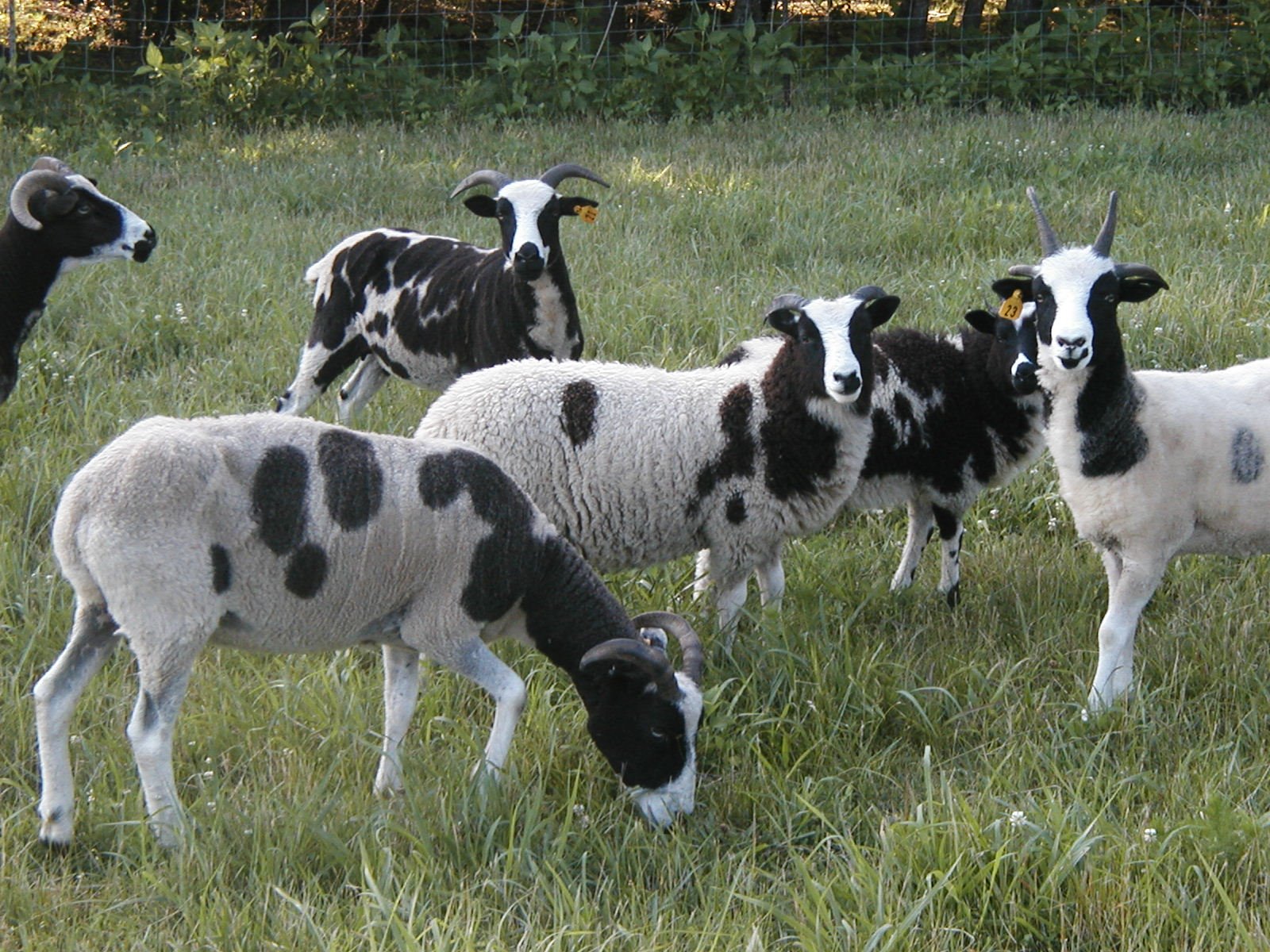
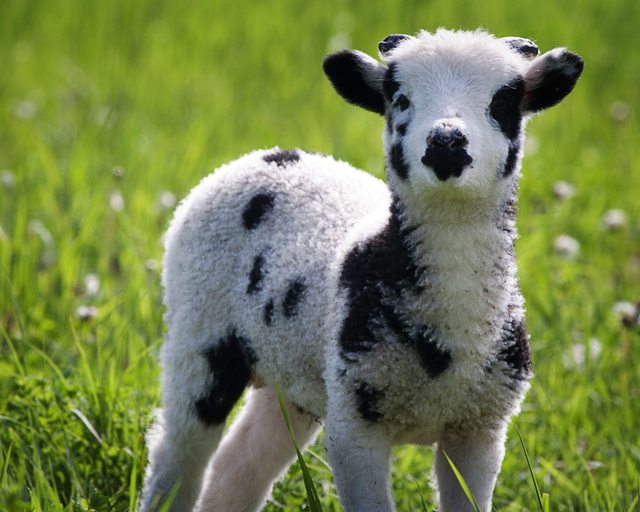
Brown Sheep
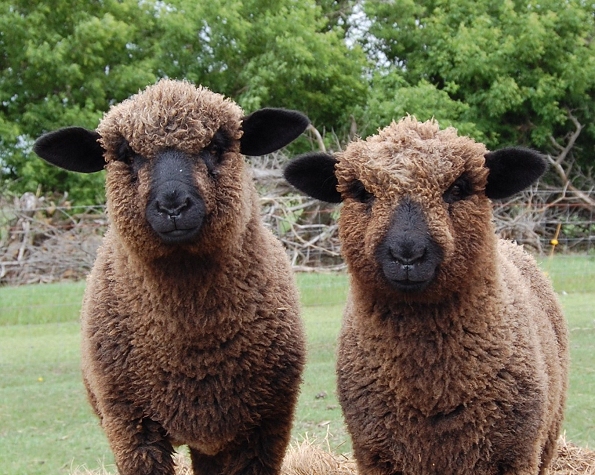
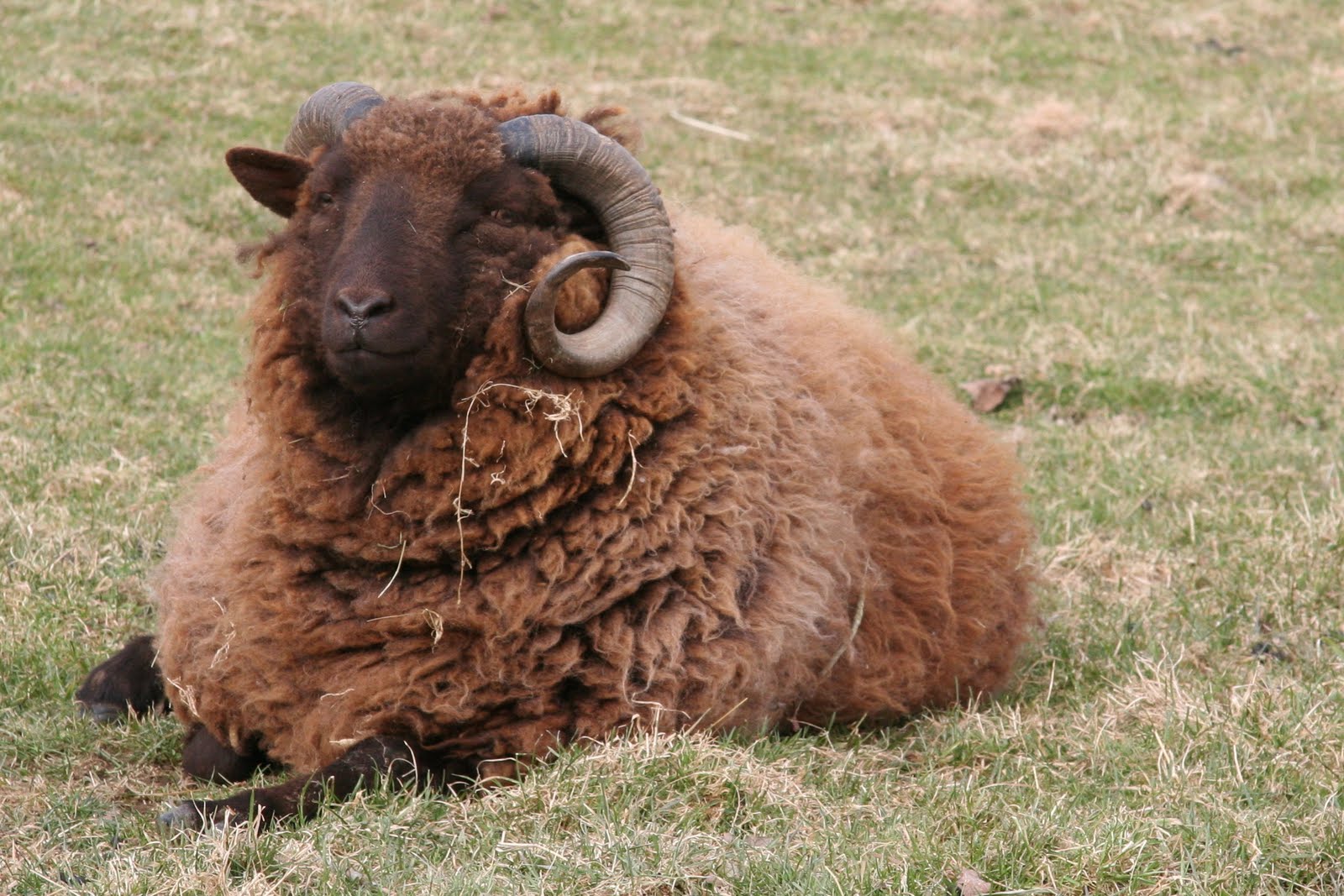
Spotted and Varigated Goats
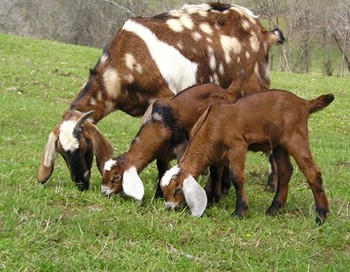
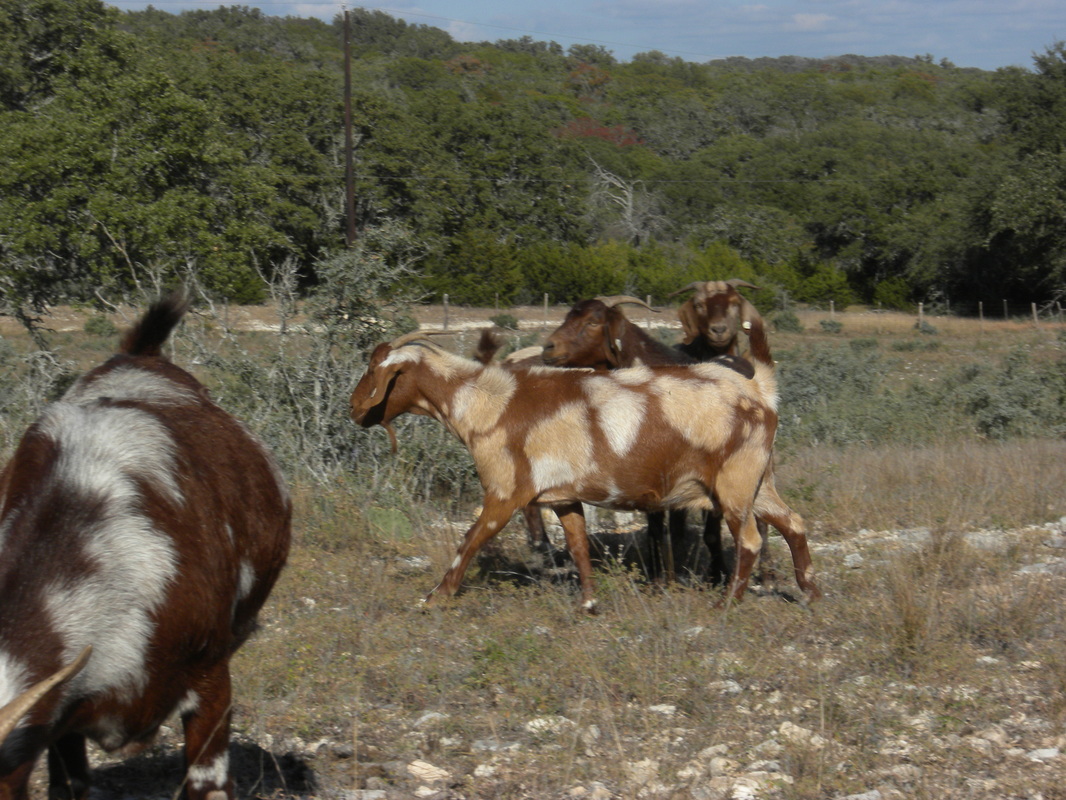
Notice the only thing that Jacob did not ask for----> "white sheep and white goats".
White Sheep
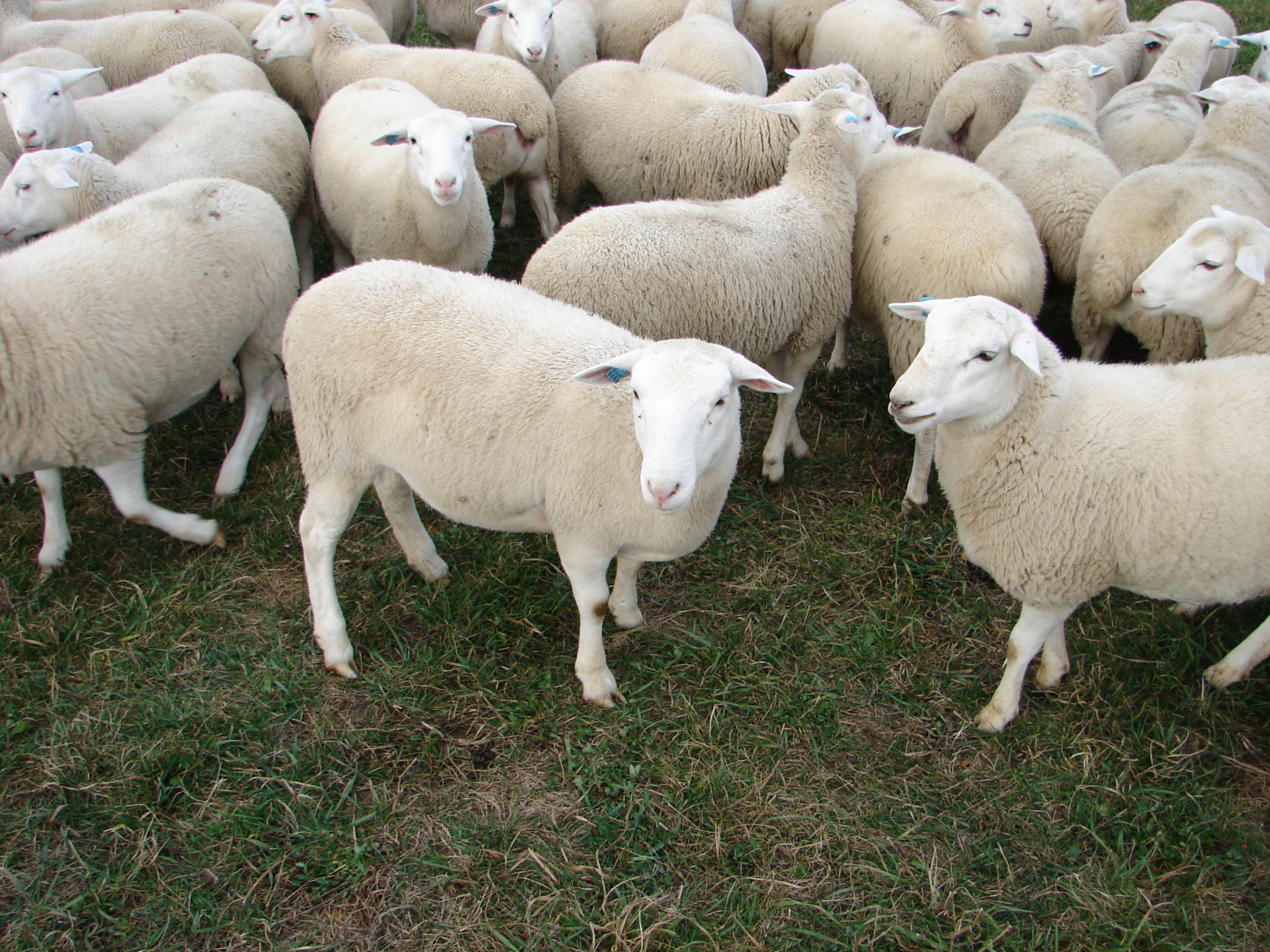
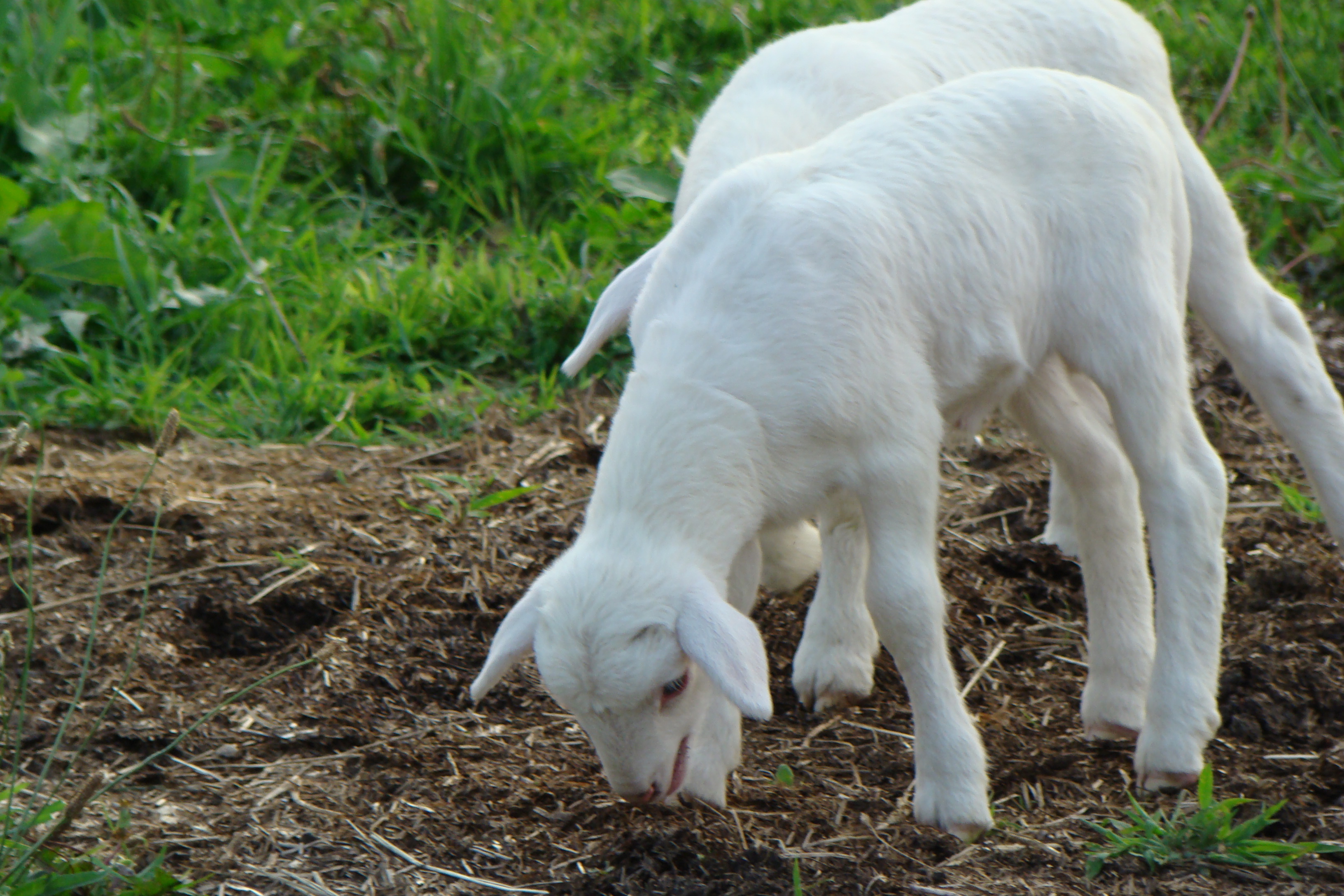
White Goats
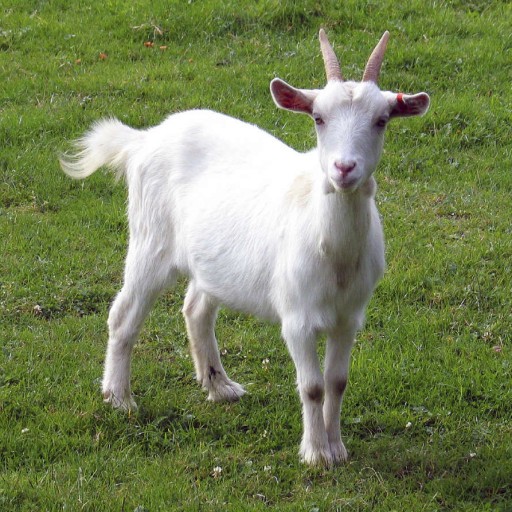
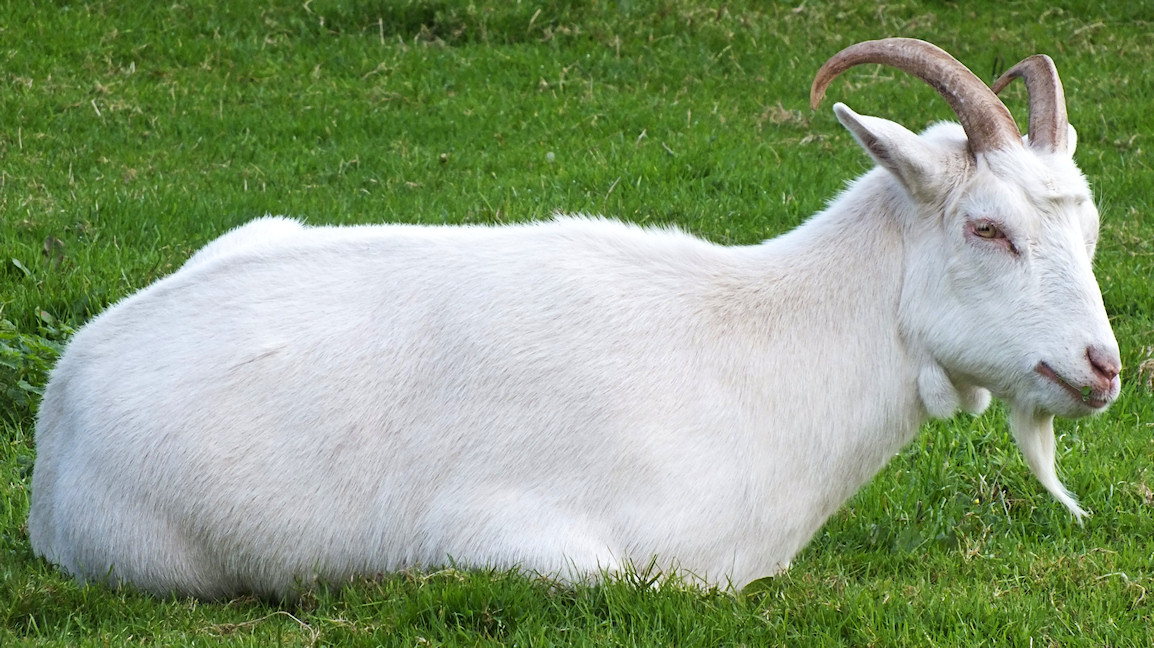
Who has the name resembling the color white? "Pale Face" Laban! In other words, though Jacob didn't say it, he was telling Laban that he wouldn't take "Laban sheep" and "Laban goats", because Jacob did not want "white" (Laban) animals to remind himself of Laban when he leaves his uncle/father-in-law's estate. The white ones would be left to the ones that fit with his name---> Laban!
Notice in verse thirty-one of this week's Torah portion pssage that the "you" is bold in pink. This is the same situation with Laban back in the previous chapter of this week's Torah portion when Laban asked Jacob to what does he want for his wages with the soul being involved in this third contract process
Genesis 29:19 And Laban said, Is good (better) she be given of her to you than of me giving her to another man: Dwell with me. 20 And Jacob served on Rachel seven years; and they were in his eyes as ones of days in his loving her.... 25 And was, in the breaking period (morning), and behold, she was Leah: and said to Laban, What is this you have done to me? That not I had served with you on Rachel?...
Jacob also, finally figured Laban out. Instead of stating the amount of years to work for him, he used the kinds of goats and flocks to be his wages. That way he expected quicker results and would be able to leave Laban with something to live for his future with something. Notice that Laban stated here "that shall be according to your word". Laban saw that he met his match and finally agreed to Jacob's demand, but Laban did give not up too easy, as we will see in the next Torah portion passage.
Verses thirty five and thirty six
35 and removed in that day ta-the kids: the ring streaked (bands, striped) and the variegated, and ta all of the kids: the spotted (speckled) and the variegated, and of all which were white on him, and all of the brown (black) among the sheep, and were given into the hands of his sons, 36 and set a journey of three days between himself and between Jacob: and Jacob was tending the remainder of ta-the flocks of Laban [(the ta-flocks of Laban that remained)].
How evil can one get. "Pale Face" Laban and his sons stole the flocks that rightfully belonged to Jacob. Laban upped one on Jacob and took everything but the white sheep and the white goats. In other words, Laban left to Jacob only "Laban" sheep and "Laban" goats. By this action, Laban was saying to Jacob "I, "Pale Face" Laban, am in your face through these "white" animals".
Also, Laban was setting Jacob back in a long term situation where he would be staying for a longer period of time and delaying his departure by making Jacob take some time to grow his own livestock. These animals are not going to sprout up overnight. As we will find out later, this was a six year stay in Laban's camp to tend and grow his livestock, which will be noted later.
We also realize for the first time that Laban also had sons, and they were just as evil as their father by taking the animals that were rightfully Jacob's, and set them at a three day journey's distance between them. Jacob knew that if he left camp to pursue after them, he would have been kept out of the camp and left behind his wives and children, and Laban would have used them as his own servants. Jacob had no choice but to go through the process to raise the flocks and goats for Laban.
Notice in verse thirty five that there were "ring streaked" animals. This was not mentioned in Jacob's wage offer in verse thirty two.
Looking at the word RING STREAKED
The Hebrew word for spotted is "ah-kohd"- Ayin, Kuph, Dalet (dqen). It is from Strong's Concordance number 6124, and its defintion
From H6123; striped (with bands): - ring straked.
from 6123 "ah-kad" (dqe), and its definition
A primitive root; to tie with thongs: - bind.
Verse thirty seven
37 And Jacob took for himself shoots of the fresh (green) Storax Tree, and the Almond Tree and the Plane Tree; and peeled (stripped, streaked) among them peelings (strips, streaks) of white, revealing the white which was upon the shoots,
These are the following images:
The White Poplar (Storax) Tree
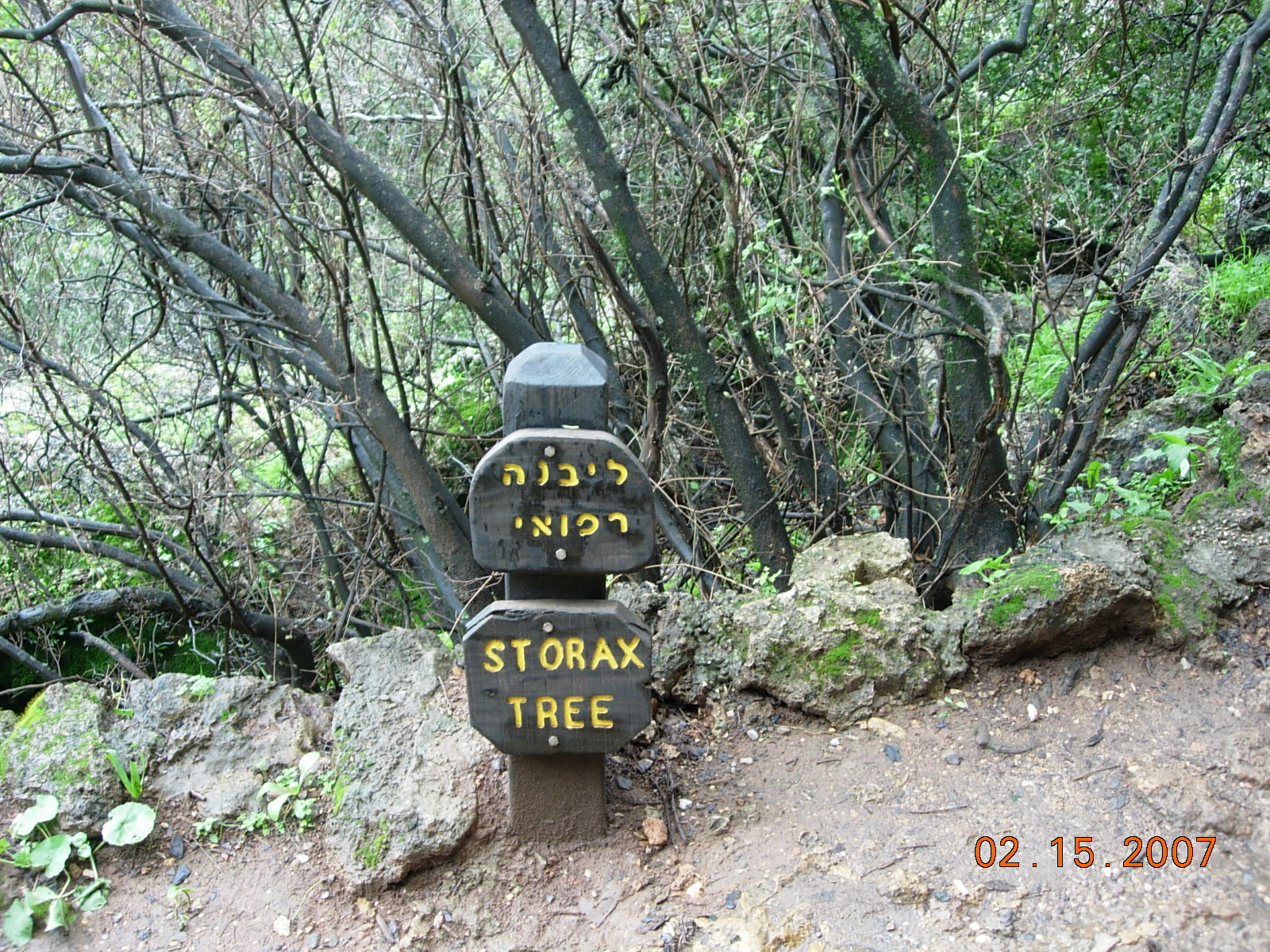
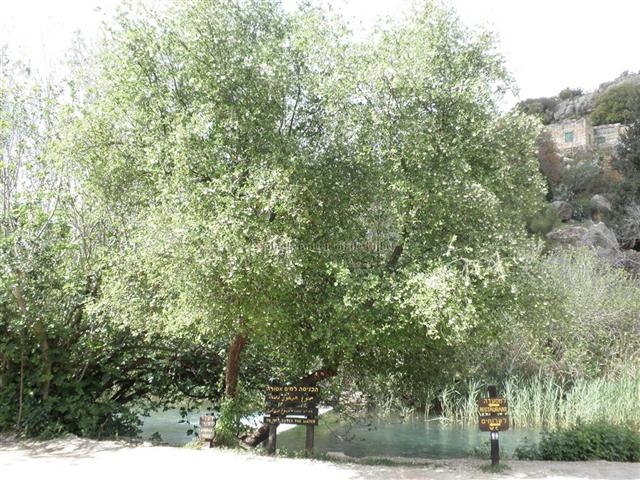
Looking at the word STORAX TREE
The Hebrew word for Storax Tree is "leev-nah"- Lamed, Bet, Nun, Heh (hnbl). It is from Strong's Concordance number 3839, and its defintion
From H3835; some sort of whitish tree, perhaps the storax: - poplar.
from 3835 "lah-vahn" (nbl), and its definition
A primitive root; to be (or become) white; also (as denominative from H3843) to make bricks: - make brick, be (made, make) white (-r).
The Storax Tree is based on the color "white".
The Almond Tree
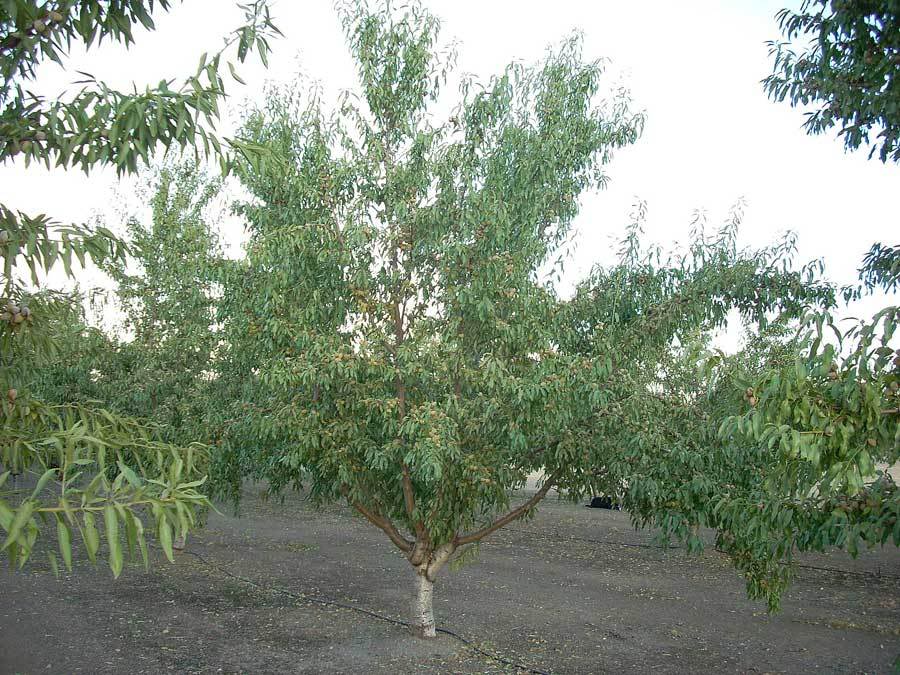
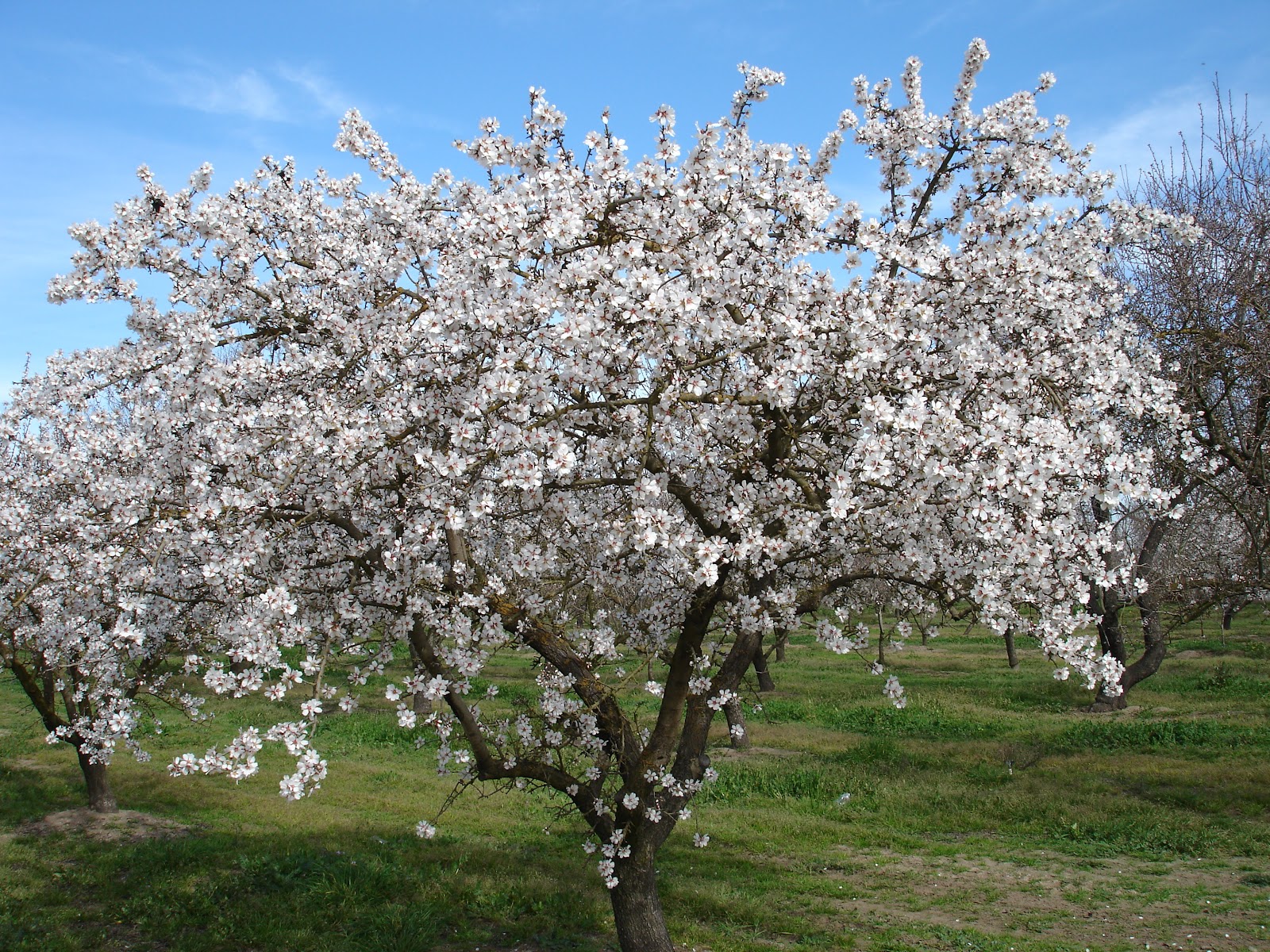
Looking at the word ALMOND TREE
The Hebrew word for Almond Tree is "looz"- Lamed, Vav, Zayin (zwl). It is from Strong's Concordance number 3869, and its defintion
Probably of foreign origin; some kind of nut tree, perhaps the almond: - hazel.
This would be the Almond Tree, because of its hazel color.
The Plane Tree
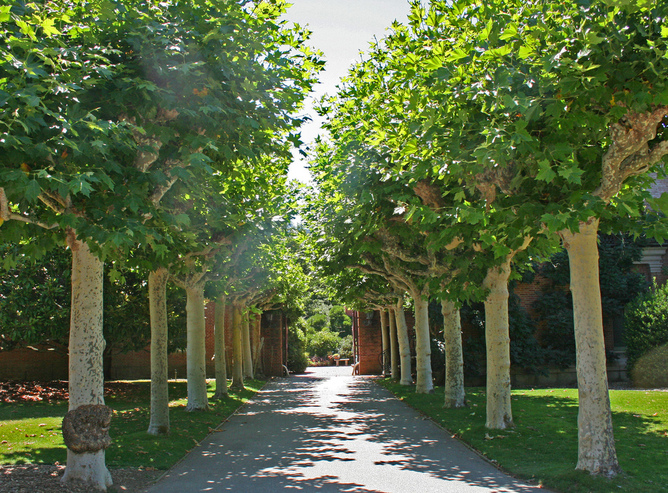
Looking at the word PLANE TREE
The Hebrew word for Plane Tree is "ahr-mohn"- Ayin, Resh, Mem, Vav, Nun Sophit (Nwmre). It is from Strong's Concordance number 6196, and its defintion
Probably from H6191; the plane tree (from its smooth and shed bark): - chestnut tree.
from 6191 "ah-rahm" (Mre), and its definition
A primitive root; properly to be (or make) bare; but used only in the derived sense (through the idea perhaps of smoothness) bo be cunning (usually in a bad sense): - X very, beware, take crafty [counsel], be prudent, deal subtilly.
The Plane Tree is a smooth tree. Notice that the Hebrew root word "ahrahm", is the same name location "Aram".
I have yet to hear anyone realize this. I am going to add the Hebrew words to certain English words in this verse, because I want you to see the significance of the words that are applied in this verse:
And Jacob took for himself shoots of the fresh (green) Storax Tree (hnbl), and the Almond Tree (zwl) and the Plane Tree (Nwmre; and peeled (stripped) among them peelings (strips) of white (nbl), revealing the white (nbl) which was upon the shoots,
As noted, these are three Hebrew words used: The Hebrew word for the Storax Tree is "leevnah" (hnbl), The Hebrew word for the Almond Tree is "looz" (zwl) and the Hebrew word for the Plane Tree is "ahrmohn" (Nwmre). Also white in Hebrew is "laban" (nbl). In my opinion, these Hebrew words were a "story code", stating that Jacob used in this verse to say that he is paying back "Laban the Aramite" by stripping him from his flocks that Jacob himself will produce in a few years, and he is going to take his spoils back to "Luz" which is also called "Beth El" as mentioned earlier in chapter twenty eight of this week's Torah portion
Genesis 28:19 And called ta-the name of that place, Beth El: However, the name of the city was Luz to the first.
In other words, Jacob was making Laban reap what he sowed by using these three basic Hebrew words symbolically against him by taking Laban's livestock away from him, and in a way showing the sheep and goats that were in heat to remember what Laban, encoded via the 'white', or 'Laban' shoots, did to me and avenge me in birthing spotted and variegated and ring streaked livestock.
When Laban said in verse thirty four that it shall be according to Jacob's word, Laban was using his slyness "Labanisms" again by not saying "Yes", but saying according to "Jacob's word" and not taking any accountability. But Jacob used trees that resembled "certain words" to tell Laban what he was doing without Laban knowing what he was saying.
!!!hwhy Kl dbk
When it says that Jacob was making strips of white, he was really saying that he making strips of "Laban" for the sheep and the goats. In my opinion, it makes the sheep and goats indirectly remember Laban, and for what Laban did to him all of his years.
Verses thirty eight through forty
38 and placed (stood) ta-the shoots which were peeled (stripped, streaked) in the gutters in the troughs of the water which the flocks, they came to imbibe (drink) at the nokakh-front (nokakh-opposite, nokakh-before) of the flocks, and were in heat in their coming to imbibe (drink). 39 And the flocks, they were of heat to the shoots, and the flocks, they birthed ring streaked (bands, stripes), spotted (speckled), and variegated. 40 And Jacob split (separated, divided) the sheep, and gave the faces of the flock to the ring streaked (striped, banded), and all of the brown (black) among the flocks of Laban; and put (set) for himself droves by his apartness, and did not put (set) them upon the flocks of Laban.
Jacob had learned this through his experience and training of shepherding flocks and goats either in Canaan or in Aram that the animals who are strong and in heat will create brown or spotted and variegated offspring.
Notice in verse thirty eight of this week's Torah portion passage that "they" and "their" are bold in pink, meaning that it was the female sheep Jacob was putting the rods for to see.
These various kinds of sheep and goats that are not all white could be symbolized as us believers throughout the world of various cultures and languages who accepted Yeshua as hwhy, Lord and our Savior.
!!!hwhy Kl dbk
Verses forty-one through forty three
41 And was among all in heat of the girded (compacted) flocks, and Jacob put (set) ta-the shoots to the eyes of the flocks in the gutters to be in heat among the shoots, 42 and were not put among the feebleness of the flocks: And was the feeble ones belonging to [(were for)] Laban and the stronger (girded) ones belonging to [(were for)] Jacob. 43 And the man spread out (scattered) much, much, and were to him multiple flocks, and female servants, and male servants, and camels, and donkeys.
Jacob's flocks were the stronger ones with the spotted, variegated and brown ones, while "Pale Face" Laban's "Laban" animals were weak. As Jacob's livestock grew, he was able to purchase more servants as well as donkeys and camels as he propsered.
In verse forty two, in the Hebrew text, the phrase for "and among the feebleness" is "oo-v'ha'a'teeph" (Pyjehbw), but in the Hebrew text, the letter Peh is enlarged
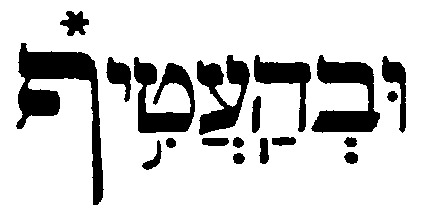
This is a statement from Jewish Bible Quarterly regarding the enlarged Peh, and this is what it says:
The Targum translates ובהעטיף as "and the late," meaning the cattle that go into heat too late, due to their feebleness. 6 This translation of the word is basically the opposite of the translation given in the Septuagint. According to Eisenstein's explanation, the large letter in ובהעטיף falls into Yeivin's third category, a letter written large to insure the correct reading and avoid errors.
Another source, The Watchman, website page titled "The Torah Scroll" by Rabbi Dr. Hillel ben David (a.k.a. Greg Killian) wrote regarding the enlarged Peh, and this is what t says:
Other large letters were intended to guard against possible errors; for instance, in the passage “when the cattle were feeble” (;hygvcu; Gen. xxx. 42) final “pe” (;) is written large in order that it may not be mistaken for a final “nun” (ן) and the word be read ihygvcu (comp. uhbhng in Job xxi. 24). The Septuagint translation, based on the second version, is “whenever the cattle happened to bring forth.”
I gave you a couple of views of the enlarged Peh, but here is my view of the enlarged Peh. The Hebrew letter Peh is a Paleo-Hebrew picture of a mouth. Based on the context, the feeble flocks are the plain white (Laban) flocks that are going Laban's flocks. Laban is very good with "his mouth", and this Hebrew phrase word with the enlarged Peh is a way to say that Laban has "a big mouth". Those "feeble" flocks will belong to "Big Mouth", "Pale Face" Laban.
CHAPTER 31
Genesis 31:1-55
(31:1-54; 32:1 in the Hebrew)
Gen 31:1 And heard ta-the words of the sons of Laban, to say, Jacob has taken ta all which belonged to our father; and from which had belonged to our father has done (made, accumulated) ta all of this glory (wealth). 2 And Jacob saw ta-the face of Laban, and behold, was not with him as yesterday, threes. 3 And hwhy said to Jacob, Return to the land of your fathers and to your birthing (kindred); and I am with you.
4 And Jacob sent and called for Rachel and for Leah to the field to his flocks, 5 and said to them, I see ta-the face of your father for is not to me as yesterday, threes; and the Elohim of my father has been with me. 6 And you, you know for in all of my power I have served ta-your father, 7 and your father has deceived (cheated, derided) against me, and changed ta-my wages ten weighings; and Elohim has not given (allowed) him to do the evil with me. 8 If thus, was said, The spotted (speckled) shall be your wages; and all of the flocks, they birthed spotted (speckled): and if said thus, the ring streaked (striped, banded) shall be your wages; and all the flocks, they birthed ring streaked (striped, banded).
9 And Elohim has snatched away (snatched out) ta-the livestock of your father, and were given to me. 10 And was in the time the flocks were in heat, and I lifted up my eyes, and I saw in a calm-dream, and behold, the rams that were ascending upon the flock were ring streaked (striped, banded), spotted (speckled), and grisled (grizzled). 11 And the Messenger of The Elohim spoke to me in a calm-dream, Jacob: And said, Behold I. 12 And said, Lift up now your eyes, and see all of the rams that are ascending upon the flocks are ring streaked (striped, banded), spotted (speckled), and grisled (grizzled, sprinkled): for I have seen ta all which Laban did to you. 13 I am the El of Beth El which you anointed the pillar there, which you have vowed to Me there a vow: Now arise, go out from this land, and return to the land of your birthing (kindred).
14 And Rachel and Leah, they answered, and they said to him, That still belongs to us a portion and an inheritance in the house of our father? 15 That not of foreigners (aliens) are we counted (computed) to him? For has sold us, and consuming, also has consumed ta-our silver? 16 For all of the riches which Elohim has snatched away from our father, he belongs to us, and to our sons: And now, do all which Elohim has said to you.
17 And Jacob arose, and lifted up ta-his sons and ta-his wives upon the camels; 18 And drove out (guided out) ta-all of his livestock, and ta-all of his substance (collection, gain, property) which was collected (gained) of the livestock of his aquiring (purchase, goods), which was collected (gained) in Padan Aram, to go to Isaac, his father, to the land of Canaan.
19 And Laban went out to shear ta-his sheep: and Rachel, she stole ta-the house idols which belonged to her father. 20 And Jacob stealthed ta-the heart of Laban, the Aramite, upon not telling (declaring, explaining) to him that he bolted away (ran away). 21 And he bolted away (ran away), and all which belonged to him; and arose, and gone over ta-the river, and set ta-his face at the Mount of the Gilead. 22 And was told (declared, explained) to Laban on the third day for Jacob had bolted away (ran away), 23 and took ta-his brothers with him, and pursued (chased) after him of a journey (way) of seven days; and overtook him on the Mount of the Gilead. 24 And Elohim came to Laban, the Aramite, in a calm-dream of the night, and said to him, Guard (Watch, Observe, Take heed) for yourself, lest you speak with Jacob from good unto evil.
25 And Laban overtook ta-Jacob. And Jacob, had fastened ta-his tent on the mountain: and Laban had fastened ta-his brothers on the Mount of the Gilead. 26 And Laban said to Jacob, What have you done?! And you have stealthed ta-my heart, and you drove away ta-my daughters as captives of the sword?! 27 To why did you secretly run away, and you stealthed me; and you have not told (declared, explained) to me, and I would have sent you away in rejoicing, and in singing among the tambourine and among the lyre (harp)? 28 And you have not permitted me to kiss to my sons and to my daughters? Now, you have been foolish (silly) doing him. 29 Exists to the force of my hand to do with you evil: and The Elohim of your fathers spoke to me earlier (last night), to say, Guard (Watch, Observe, Take heed) to yourself from speaking with Jacob from good unto evil. 30 And now, leaving (walking), you have left (walked), for longing (pining), you have longed (pined) for the house of your father, to why have you stolen ta-my elohim? 31 And Jacob answered and said to Laban, For I was afraid: for I said, Lest you pluck away (forcefully take) ta-your daughters from with me. 32 With which you find ta-your elohim shall not live before our brothers: Discern for yourself what is with me and take for yourself. And Jacob did not know for Rachel had stolen them.
33 And Laban gone (went) in the tent of Jacob, and in the tent of Leah, and in the the tent of the two female servants; and did not find. And had gone out from the tent of Leah, and gone (went) in the tent of Rachel. 34 And Rachel had taken ta-the house idols, and she put (set) them in the padded saddle of the camel, and she sat upon them. And Laban felt (groped) ta-all of the tent, and did not find. 35 And she said to her father, Do not glow off in the eyes of my lord (master), for I am not able to arise from your face; for the way of women is to me. And searched (investigated), and did not find ta-the house idols.
36 And to Jacob was glowing off, and contended (strived, rebuked) against Laban: and Jacob answered and said to Laban, What is my transgression?! What is my sin that you have inflamed (came hotly) after me?! 37 For you have felt (groped) ta-all of my vessels. What have you found from all the vessels of your house?! Set (Put) here before (at the front of) my brothers and your brothers, and convict (decide, rebuke, correct) between the two of us. 38 I was with you this twenty years; Your ewes and your kids were not miscarried, and I have not eaten of the rams of your flock. 39 I did not bring the torn to you; I, I reconciled (made reconciliation); you have required her from my hand the stolen at day and the stolen at night. 40 That I was; in the day the drought (dryness) consumed me, and the frost (ice) in the night; and my sleep, she departed (drove away) from my eyes. 41 This has been to me twenty years in your house; serving you four ten (fourteen) years on your two daughters, and six years on your flocks: and you have changed ta-my wages ten weighings. 42 If not (To me not) the Elohim of my father, the Elohim of Abraham and the dread of Isaac, had been for by me, for now you would have sent me away empty. Elohim has seen ta-my affliction and ta-the toil of my palms, and had convicted (decided, rebuked, corrected) earlier (last night).
43 And Laban answered and said to Jacob, The daughters are my daughters, and the sons are my sons, and the flocks are my flocks, and of all which you see, he belongs to me: and what can I do to these to my daughters today (the day), or to their sons which they have birthed? 44 And come now, we will cut a covenant, me and you; and shall be for a witness (testimony) between me and between you. 45 And Jacob took a stone and erected her of a pillar (column). 46 And Jacob said to his brothers, Glean stones; And they took stones, and they did (made) a heap: and they ate there upon the heap. 47 And Laban called to him Jegar Sahadutha: and Jacob called to him Galeed. 48 And Laban said, This heap is a witness (testimony) between me and between you today (the day). Upon thus his name was called Galeed; 49 And the Mizpah; which was said, hwhy shall watch between me and between you, for we are absent (hidden) a man from his neighbor. 50 If you shall afflict ta-my daughters, and if you take wives upon my daughters, no man is with us; See, Elohim is a Witness (Testimony) between me and between you. 51 And Laban said to Jacob, Behold this heap and behold the pillar (column) which I have instructed (taught) between me and between you; 52 This heap is a witness (testimony), and the pillar is a witness (testimony), if I, I will not go over ta-this heap to you, and if you, you will not go over ta-this heap and ta-this pillar (column) to me for evil. 53 The Elohim of Abraham, and the Elohim of Nahor, the Elohim of their father, they shall judge between us. And Jacob sware in the dread of his father, Isaac. 54 Then Jacob sacrificed a sacrifice on the mountain, and called to his brothers to eat bread: and they ate bread, and they lodged (stayed) on the mountain. 55 And Laban arose early (woke up, loaded up, started up) in the breaking period (morning), and kissed to his sons and to his daughters, and blessed them: and Laban went out and returned to his place.
(NOTE: Not all verses will have comments)
Verses one and two
1 And heard ta-the words of the sons of Laban, to say, Jacob has taken ta all which belonged to our father; and from which had belonged to our father has done (made, accumulated) ta all of this glory (wealth). 2 And Jacob saw ta-the face of Laban, and behold, was not with him as yesterday, threes.
This shows how self-centered Laban's sons were. They were just proving that they were no different than their father in saying what they said. They were so blind to what their father did against Jacob that they did not see the hand of hwhy in this.
In simple terms, Laban reaped what he sowed. Laban stole Jacob's flocks, but hwhy got back at Laban and in a way stole them back by showing Jacob in the previous verse how to create stripped, spotted and speckled animals, and did it so successfully, that there were few left that were called Laban's flocks.
Verse three
3 And hwhy said to Jacob, Return to the land of your fathers and to your birthing (kindred); and I am with you.
Jacob now has his family set, he has livestock he can say that they are his, and he has transportation and beasts of burdens and servants. His household is complete, and now hwhy was saying to Jacob "It's time to return home".
Monte Judah of Lion and Lamb Ministries noted that hwhy said "I am with you" to Jacob. He also said that it applies to us today as believers in Messiah, because the Heavenly Father says to each one of us "I am with you". Thank you, Mark.
One can also say that "I AM" is with us, which Yeshua noted to the Jewish people that He is, which is noted in the Gospel of John
John 8:58 Yeshua said unto them, Verily, verily, I say unto you, Before Abraham was, I am.
Mark Biltz of El Shaddai Ministries noted that going back to the land of his nativity, also interpreted as kindred, included Esau.
Notice that the you is bold in pink. This is saying that hwhy was speaking to Jacob's "soul".
Verse four
4 And Jacob sent and called for Rachel and for Leah to the field to his flocks,
Why did Jacob called them to the field? Why didn't he call them into a tent? Because he did not want the other members of his family, including his two other wives, Leah and Rachel's female servants, his servants, so that no one would eavesdrop and overhear what he was about to say to his wives. Based in the previous chapter, Laban and his sons were holding the flocks and goats three days journey distance from Jacob, and were not present during this account.
Isn't it interesting that for all these years, there is an account where he called to both wives "together" for the first time.
Verses five through eight
5 and said to them, I see ta-the face of your father for is not to me as yesterday, threes; and the Elohim of my father has been with me. 6 And you, you know for in all of my power I have served ta-your father, 7 and your father has deceived (cheated, derided) against me, and changed ta-my wages ten weighings; and Elohim has not given (allowed) him to do the evil with me. 8 If thus, was said, The spotted (speckled) shall be your wages; and all of the flocks, they birthed spotted (speckled): and if said thus, the ring streaked (striped, banded) shall be your wages; and all the flocks, they birthed ring streaked (striped, banded).
What Laban did by changeing Jacob's wages ten times during his two seven year periods of serving him for Laban's two daughters was an act of deception. As I noted earlier in this Torah portion, Jacob did not set a specific wage to Laban when he served for him for the fourteen years, but served him without any set wages. That gave Laban the power to set any wage standard he wanted against Jacob, and no doubt those wage changes were not favorable to Jacob.
This sounds a lot like business today who can change the wage system toward their employees.
Looking at the word WAGES
The Hebrew word for wages is "moh-neh"- Mem, Nun, Heh (hnm). It is from Strong's Concordance number 4489, and its definition
From H4487; properly something weighed out, that is, (figuratively) a portion of time, that is, an instance: - time.
from 4487 "mah-nah" (hnm), and its definition
A primitive root; properly to weigh out; by implication to allot or constitute officially; also to enumerate or enroll: - appoint, count, number, prepare, set, tell.
This is where we get our modern English word "money", and it could also mean "many" as in 'a lot'.
Verses nine through thirteen
9 And Elohim has snatched away (snatched out) ta-the livestock of your father, and were given to me. 10 And was in the time the flocks were in heat, and I lifted up my eyes, and I saw in a calm-dream, and behold, the rams that were ascending upon the flock were ring streaked (striped, banded), spotted (speckled), and grisled (grizzled). 11 And the Messenger of The Elohim spoke to me in a calm-dream, Jacob: And said, Behold I. 12 And said, Lift up now your eyes, and see all of the rams that are ascending upon the flocks are ring streaked (striped, banded), spotted (speckled), and grisled (grizzled, sprinkled): for I have seen ta all which Laban did to you. 13 I am the El of Beth El which you anointed the pillar there, which you have vowed to Me there a vow: Now arise, go out from this land, and return to the land of your birthing (kindred).
Ending his talk to Leah and Rachel, Jacob gave credit to hwhy for taking the livestock and giving him, through the dream, the ability to use "manipulation" for the sheep and the goats to birth spotted, variegated, ring streaked and brown offspring. We believers also need to know that our gifts and talents, ideas and revelations, came from hwhy, and we need to thank Him for lending us His gifts and talents to us. Notice also that this is the first and only time Jacob directly spoke to Leah.
Verses through fourteen through sixteen
14 And Rachel and Leah, they answered, and they said to him, That still belongs to us a portion and an inheritance in the house of our father? 15 That not of foreigners (aliens) are we counted (computed) to him? For has sold us, and consuming, also has consumed ta-our silver? 16 For all of the riches which Elohim has snatched away from our father, he belongs to us, and to our sons: And now, do all which Elohim has said to you.
This is the first time recorded in the scriptures that the two sisters were in agreement together. This is also the first time that daughters mentioned of their loss of their inheritance by their own father, Laban. This scripture account was most likely based from the result of Leah and Rachel's loss of their inheritance, which is noted in the Torah portion of Pinkhas, in the Torah portion of Numbers
Numbers 27:1 And the daughters of Zelophehad, son of Hepher, son of Gilead, son of Machir, son of Manasseh, of the family of Manasseh, son of Joseph, they came near: and these are the names of his daughters; Mahlah, Noah, and Hoglah, and Milcah, and Tirzah. 2 And they stood to the face of Moses, and to the face of Eleazar, the Priest, and to the face of the Rulers and all of the Congregation, at the Entrance of the Tent of Appointment, to say, 3 Our father died in the wilderness, and he was not in the midst of the Congregation that were appointed upon (over) hwhy in the congregation of Korah; that had died in his sin, and there were no sons to him. 4 To why should the name of our father be scraped away (shaved away) from the midst of his family, for was not to him a son?! Give to us a possession (seize) among the midst of the brothers of our father. 5 And Moses brought near ta-their charge (cause, custom issue) to the Face of hwhy. 6 And hwhy spoke to Moses, to say, 7 Thus the daughters of Zelophehad had spoken: Giving, you shall give to them a scraping (shaving) of an inheritance in the midst of the brothers of their father; and you shall have ta-the inheritance of their father go over to them. 8 And you shall speak to the Sons of Israel, to say, When a man shall die, and has not a son to him, And you shall have ta-his inheritance go over to his daughter. 9 And if has not a daughter to him, and you shall give ta-his inheritance to his brother. 10 And if has not to him brothers, and you shall give ta-his inheritance to the brother of his father. 11 And if have no brothers to his father, and you shall give ta-his inheritance to his relative that is near to him from his family, and shall possess her: and she shall be to the Sons of Israel for a Statute of Judgment, as the which hwhy commanded ta-Moses.
Looking at the word SNATCH
The Hebrew word for snatch is "nah-tsahl" (lun) (in the actual Hebrew text "hatseel"- Nun, Tsade, Lamed (lyuh)). It is from Strong's Concordance number 5337, and its definition
A primitive root; to snatch away, whether in a good or a bad sense: - X at all, defend, deliver (self), escape, X without fail, part, pluck, preserve, recover, rescue, rid, save, spoil, strip, X surely, take (out).
Without the Nun, this is where we get our modern English word "steal".
Verses seventeen and eighteen
17 And Jacob arose, and lifted up ta-his sons and ta-his wives upon the camels; 18 And drove out (guided out) ta-all of his livestock, and ta-all of his substance (collection, gain, property) which was collected (gained) of the livestock of his aquiring (purchase, goods), which was collected (gained) in Padan Aram, to go to Isaac, his father, to the land of Canaan.
This scene must have been an interesting sight to see with Jacob lifting up his wives and children on the camel while all his servants were tending the livestock, and loading the donkeys and other camels with their belongings, their food and drink and their tents and materials. To me, this would make a great movie scene.
Verse nineteen
19 And Laban went out to shear ta-his sheep: and Rachel, she stole ta-the house idols which belonged to her father.
As both sister's said in verse fifteen, their father devoured, or usurped their silver that should have belonged to them. Rachel took the law into her own hands and stole the images for compensation.
Looking at the word HOUSE IDOL
The Hebrew word for house idol is "t'rah-pheem"- Tav, Resh, Peh, Yod, Mem (myprt). It is from Strong's Concordance number 8655, and its definition
Plural perhaps from H7495; a healer; Teraphim (singular or plural) a family idol: - idols (-atry), images, teraphim.
from 7495 "rah-phah" (apr or hpr), and its definition
A primitive root; properly to mend (by stitching), that is, (figuratively) to cure: - cure, (cause to) heal, physician, repair, X thoroughly, make whole. See H7503.
from 7503 "rah-phah" (hpr), and its definition
A primitive root; to slacken (in many applications, literally or figuratively): - abate, cease, consume, draw [toward evening], fail, (be) faint, be (wax) feeble, forsake, idle, leave, let alone (go, down), (be) slack, stay, be still, be slothful, (be) weak (-en). See H7495.
This Hebrew word is where we get our modern English word "trophy". When one wins a sports championship, one gets a "trophy". They take their sports trophy to their "home" and set it for the family and everyone coming to their home to see.
Also, it could be possible that Rachel was taking Laban's "teraphim" house idols for its silver. It was possible that Leah and Rachel's silver was used by Laban to make the house idols.
Verses twenty and twenty-one
20 And Jacob stealthed ta-the heart of Laban, the Aramite, upon not telling (declaring, explaining) to him that he bolted away (ran away). 21 And he bolted away (ran away), and all which belonged to him; and arose, and gone over ta-the river, and set ta-his face at the Mount of the Gilead.
Jacob in many ways was saying "Goodbye Laban. I'm outta here. Don't call me. I'll call you". Notice that Jacob used "deception" in his own right in not telling Laban that he was leaving, but hwhy allowed it for His Purpose. We as believers in Yeshua are allowed to use deceptions for His Purpose.
Based in the last chapter, Laban was three day's journey away from his home, because the original sheep and goats he and his sons stole that rightly belonged to Jacob were there. This information also provides the fact that there was a time period when the sheep are sheared, which would have occurred in the Spring months when the sheep's hair will be too thick to handle the heat after its growth during the Winter months.
hwhy gave Jacob the golden opportunity to flee and escape from Laban's estate and Laban's control.
One question comes to me "Did this occur during the time of the Spring High Holy Day of Passover"? It has a very strong case that it was.
Verses twenty two and twenty three
22 And was told (declared, explained) to Laban on the third day for Jacob had bolted away (ran away), 23 and took ta-his brothers with him, and pursued (chased) after him of a journey (way) of seven days; and overtook him on the Mount of the Gilead.
This account is similar to the one the Israelites were fleeing Egypt, which is noted in the Torah portion of B'Shalakh, in the book of Exodus
Exodus 14:15 And hwhy said to Moses, Why do you cry to Me? Speak unto the Sons of Israel, and pull up (journey): 16 And you, raise your ta-staff (rod, branch), and stretch out (stretch forth) ta-your hand over (upon) the sea, and they will break open (rip open, zip open, divide): And the Sons of Israel, they will go on dry ground in the midst of the sea. 17 And behold I, I am strengthening ta-the heart of Egypt, and they will go after them: And I will be glorified (honored) on Pharaoh, and on all of his force (valiant ones), on his chariots, and on his horsemen (hoofmen). 18 And Egypt, they shall know that I am hwhy in My glorying on Pharaoh, on his chariots, and on his horsemen (hoofmen). 19 And the Messenger of The Elohim that is going to the face of the Camp of Israel pulled up (journeyed) and went from behind them; And the Pillar of the Cloud pulled up (journeyed) from their faces and stood from behind them:
It seems that the comparison between the two accounts of Laban pursuing Jacob and Pharaoh pursuing the Israelites provide stronger evidence that this account of Jacob leaving Padan Aram and Laban chasing and overcoming him, and knowing that sheep were being sheared in the Spring, are precursors to the time line of the Spring High Holy Days of Passover and the Feast of Unleavened Bread. I will be adding these Torah portion accounts on my Passover/Unleavened Bread information webpage.
Verse twenty four
24 And Elohim came to Laban, the Aramite, in a calm-dream of the night, and said to him, Guard (Watch, Observe, Take heed) for yourself, lest you speak with Jacob from good unto evil.
Now it is hwhy's turn to intervene for Jacob by telling Laban to not do anything against him and stay neutral. Knowing Laban, he did not want to do that, but the Elohim of Jacob prevailed over Laban. Laban cannot take him back nor take anything back that is rightfully Jacob's.
Also hwhy indirectly reminded Laban that he spoke these similar words to Eliezer, Abraham's servant, to bring back his sister, Rebekah, for his master's son, Isaac, for a wife in the Torah portion of Khai-yey Sarah, in the book of Genesis
Genesis 24:50 And Laban and Bethuel answered, and they said, From hwhy has gone out the word: we are not able at speaking to you evil or good. 51 Behold, Rebekah is to your face, take her, and go, and she shall be the woman (wife) of the son of your lord (master) as the which hwhy has spoken.
In other words, hwhy was saying to Laban "practice what you preach".
Verses twenty five through twenty eight
25 And Laban overtook ta-Jacob. And Jacob, had fastened ta-his tent on the mountain: and Laban had fastened ta-his brothers on the Mount of the Gilead. 26 And Laban said to Jacob, What have you done?! And you have stealthed ta-my heart, and you drove away ta-my daughters as captives of the sword?! 27 To why did you secretly run away, and you stealthed me; and you have not told (declared, explained) to me, and I would have sent you away in rejoicing, and in singing among the tambourine and among the lyre (harp)? 28 And you have not permitted me to kiss to my sons and to my daughters? Now, you have been foolish (silly) doing him.
As comedian Bill Cosby says----> "Right". Oh, I bet Laban would be sending Jacob away in pomp and circumstance and fanfare, just like Laban did when he brought Eliezer to his family home with pomp and fanfare. Yeah, Laban would have given a "Goodbye Party" for Jaocb, but at the same time, he would have kept Jacob's wives and children and servants, and all of the livestock and camels for himself, leaving Jacob with "nothing". And then, Laban would have said to Jacob "Thank you for all the wealth you gave me. I wish you well wherever you go". What a creep.
Verse twenty nine
29 Exists to the force of my hand to do with you evil: and The Elohim of your fathers spoke to me earlier (last night), to say, Guard (Watch, Observe, Take heed) to yourself from speaking with Jacob from good unto evil.
In the Hebrew text, the Hebrew word for "is" is "yesh"- Yod, Shin (sy). This could be retranslated as this:
29 Yeshua by the force of my hand to do with you evil: and The Elohim of your fathers spoke to me earlier (last night), to say, Guard (Watch, Observe, Take heed) to yourself from speaking with Jacob from good unto evil.
Verse thirty and thirty-one
30 And now, leaving (walking), you have left (walked), for longing (pining), you have longed (pined) for the house of your father, to why have you stolen ta-my elohim? 31 And Jacob answered and said to Laban, For I was afraid: for I said, Lest you pluck away (forcefully take) ta-your daughters from with me.
Laban would have forcefully take Jacob's wives with the help of Laban's sons and Laban's servants, knowing that Jacob would have been potentially outnumbered and sent him away penniless.
Verse thirty two
32 With which you find ta-your elohim shall not live before our brothers: Discern for yourself what is with me and take for yourself. And Jacob did not know for Rachel had stolen them.
These words Jacob said will haunt him for the rest of his life, and it is noted in the Torah portion of Vay-Yishlakh, in the book of Genesis
Genesis 35:16 And they pulled up (journeyed) from Beth El; and was still a length (distance) of the land to coming to Ephrath: and Rachel she was birthing, and she was of hard labor in her birthing. 17 And was, in her hard labor in her birthing, and the midwife, she said to her, Do you not fear; for also this shall be a son to you. 18 And was, in the going out of her soul, for had died of her, and she called his name, Ben Oni: and his father called to him, Benjamin. 19 And Rachel, she died, and she was buried on the way at Ephrath, she is Beth Lehem. 20 And Jacob erected a standing pillar upon her grave: she is the pillar of the grave of Rachel unto today (the day).
Though it didn't say, it was most likely that Jacob found out Rachel did have the house idols, whether Jacob found out by himself or by his servants that Rachel had Laban's elohim. Either way, when Jacob realized this, and recalled this week's Torah portion's verse, and wished he didn't say it at all and would regret what he said for the rest of his life in saying this word.
Notice that the second "yourself" is bold in pink. That means Jacob was talking to Laban's "soul".
Verses thirty three through thirty five
33 And Laban gone (went) in the tent of Jacob, and in the tent of Leah, and in the the tent of the two female servants; and did not find. And had gone out from the tent of Leah, and gone (went) in the tent of Rachel. 34 And Rachel had taken ta-the house idols, and she put (set) them in the padded saddle of the camel, and she sat upon them. And Laban felt (groped) ta-all of the tent, and did not find. 35 And she said to her father, Do not glow off in the eyes of my lord (master), for I am not able to arise from your face; for the way of women is to me. And searched (investigated), and did not find ta-the house idols.
Jacob's statement in verse thirty two effected Rachel. Though Laban did not find them in Rachel's tent, because she was sitting on them claiming she was going through her monthly period. Even though Laban didn't find the house idols, she was not immune to Jacob's words that resulted in her fate to die. The reason she did not die then, because she declared this, which is noted in the this week's Torah portion
Genesis 30:24 And she called ta-his name, Joseph; to say, hwhy shall add to me another son.
She said this after Joseph was born. Her statement was not fulfilled until she was about to give birth to Benjamin as noted above. If she died before Benjamin was born, Rachel's word to not have come to pass, and Benjamin would not have fit into hwhy's kingdom plan.
Verses thirty six through forty two
36 And to Jacob was glowing off, and contended (strived, rebuked) against Laban: and Jacob answered and said to Laban, What is my transgression?! What is my sin that you have inflamed (came hotly) after me?! 37 For you have felt (groped) ta-all of my vessels. What have you found from all the vessels of your house?! Set (Put) here before (at the front of) my brothers and your brothers, and convict (decide, rebuke, correct) between the two of us. 38 I was with you this twenty years; Your ewes and your kids were not miscarried, and I have not eaten of the rams of your flock. 39 I did not bring the torn to you; I, I reconciled (made reconciliation); you have required her from my hand the stolen at day and the stolen at night. 40 That I was; in the day the drought (dryness) consumed me, and the frost (ice) in the night; and my sleep, she departed (drove away) from my eyes. 41 This has been to me twenty years in your house; serving you four ten (fourteen) years on your two daughters, and six years on your flocks: and you have changed ta-my wages ten weighings. 42 If not (To me not) the Elohim of my father, the Elohim of Abraham and the dread of Isaac, had been for by me, for now you would have sent me away empty. Elohim has seen ta-my affliction and ta-the toil of my palms, and had convicted (decided, rebuked, corrected) earlier (last night).
Finally, Jacob had the freedom and the ability to express his wrath against Laban. In other words, Jacob was telling Laban how he suffered throughout the wage changes, how he repaid in equivalence from the animals that were lost, and how Laban would have sent him away and kept everything for himself that Jacob gained.
A speculation: Notice that Jacob did not accused Laban of deceiving him by giving him Leah instead of Rachel and making Jacob work seven years more. Jacob also did not get after Laban when Jacob requested the striped, speckled and spotted livestock for his wages, that Laban and his sons separated them from Jacob three days journey's distance, leaving Jacob with nothing. By rights, he could have, but he didn't.
Also, if one notices Jacob in comparison to his father, Isaac, and his grandfather, Abraham, these three were the "trifecta" of rebuking: Abraham rebuked King Abimelch, because Abimelech's servants stole water from his well; Isaac rebuked King Abimelech for kicking him out; Jacob rebukes "Pale Face" Laban for changing his wages ten times and serving him all these years. Notice in verse thirty eight of this week's Torah portion passage that "you" is bold in pink. In the Hebrew grammar text, this "you" is in the feminine gender, meaning that Jacob was speaking to Laban's "soul".
Remember, Jacob's wife, Leah, did not begin conception until the seventh year was over, and he did not want to leave Laban's camp until Rachel bore Joseph. By then, his new wage was to take certain animals, and that did not occur until the beginning of the first of the six years of serving Laban for the flocks as mentioned above, which means that Jacob had all twelve children (not including Benjamin) within those seven years Jacob served Laban for Rachel both times.
Notice also that based in this Torah portion passage, in the previous chapter, Joseph wasn't born until the end of the second seven years, the fourteenth year, of Jacob serving Laban, before he started the six years of serving Laban again for the flocks and goats.
Based on my calculation, Jacob's age was ninety seven years old, Joseph was six years old.
This is a chart revealing the year of mankind and the ages of Jacob's relatives when Jacob was ninety six years old
| YEAR OF MAN WHEN JACOB WAS 97 YEARS OLD | NAME OF JACOB'S RELATIVE | AGE OF JACOB'S RELATIVES WHEN JACOB WAS 97 YEARS OLD | AGE OF DEATH OF JACOB'S RELATIVES |
| 2205 YEARS OF MANKIND | Isaac | 156 years old | 180 years old |
| 2205 YEARS OF MANKIND | Esau | 97 years old | (unknown) |
| 2205 YEARS OF MANKIND | Reuben | about 13 years old | (unknown) |
| 2205 YEARS OF MANKIND | Simeon | about 12 years old | (unknown) |
| 2205 YEARS OF MANKIND | Levi | about 12 years old | 137 years old |
| 2205 YEARS OF MANKIND | Judah | about 11 years old | (unknown) |
| 2205 YEARS OF MANKIND | Dan | about 10 years old | (unknown) |
| 2205 YEARS OF MANKIND | Naphtali | about 10 years old | (unknown) |
| 2205 YEARS OF MANKIND | Gad | about 9 years old | (unknown) |
| 2205 YEARS OF MANKIND | Asher | about 9 years old | (unknown) |
| 2205 YEARS OF MANKIND | Issachar | about 8 years old | (unknown) |
| 2205 YEARS OF MANKIND | Zebulun | about 8 years old | (unknown) |
| 2205 YEARS OF MANKIND | Dinah | about 7 years old | (unknown) |
| 2205 YEARS OF MANKIND | Joseph | 6 years old | 110 years old |
If the calculation is correct, this would take the time line to about 1795 BC.
By the time that Jacob and Esau were ninety seven years old, according to Wikipedia, based on the time line, the Pharaoh who ruled in Egypt at the time was Sekhemkare Amenemhat V who reigned from 1796-1793 BC in the Thirteenth Dynasty. This is what Wikipedia says regarding Sekhemkare Amenemhat V:
"Sekhemkare Amenemhat V was an Egyptian pharaoh of the 13th Dynasty during the Second Intermediate Period. According to Egyptologists Kim Ryholt and Darrell Baker, he was the 4th king of the dynasty, reigning from 1796 BC until 1793 BC. The identity of Amenemhat V is debated by a minority of Egyptologists, as he could be the same person as Sekhemkare Amenemhat Sonbef, the second ruler of the 13th Dynasty.
Amenemhat V is attested on column 7, line 7 of the Turin canon, which credits him with a reign of 3 to 4 years. This may be confirmed by a papyrus from Lahun which mentions a year three, some months and days of a king Sekhemkare, which could either be Amenemhat V or Sonbef.
In addition, Amenemhat V is attested by a single artefact contemporaneous with his lifetime, a statue of him from Elephantine, originally set up in the Temple of Satet and inscribed with the following dedication:
"The good god, lord of the two lands, lord of the ceremonies, the king of Upper and Lower Egypt Sekhemkare, the son of Ra Amenemhat, beloved of Satet, lady of Elephantine, may he live for ever"".
These are images pertaining to Sekhemkare Amenemhat V
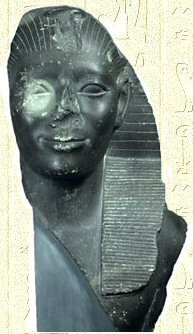
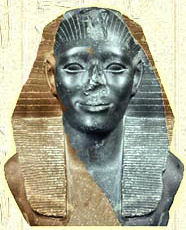
One pharaoh of the Fourteenth Dynasty who also lived and reigned during that year was Yakbim Sekhaenre who reigned from 1805-1780 BC, which I noted earlier.
Realize that all of Jacob's children were born after the first seven years Jacob served Laban originally for Rachel, and all of the children were born by the end of Jacob's second seven years which he served for Laban. Mark Biltz of El Shaddai Ministries put out a chart of his version of the ages between Jacob's children
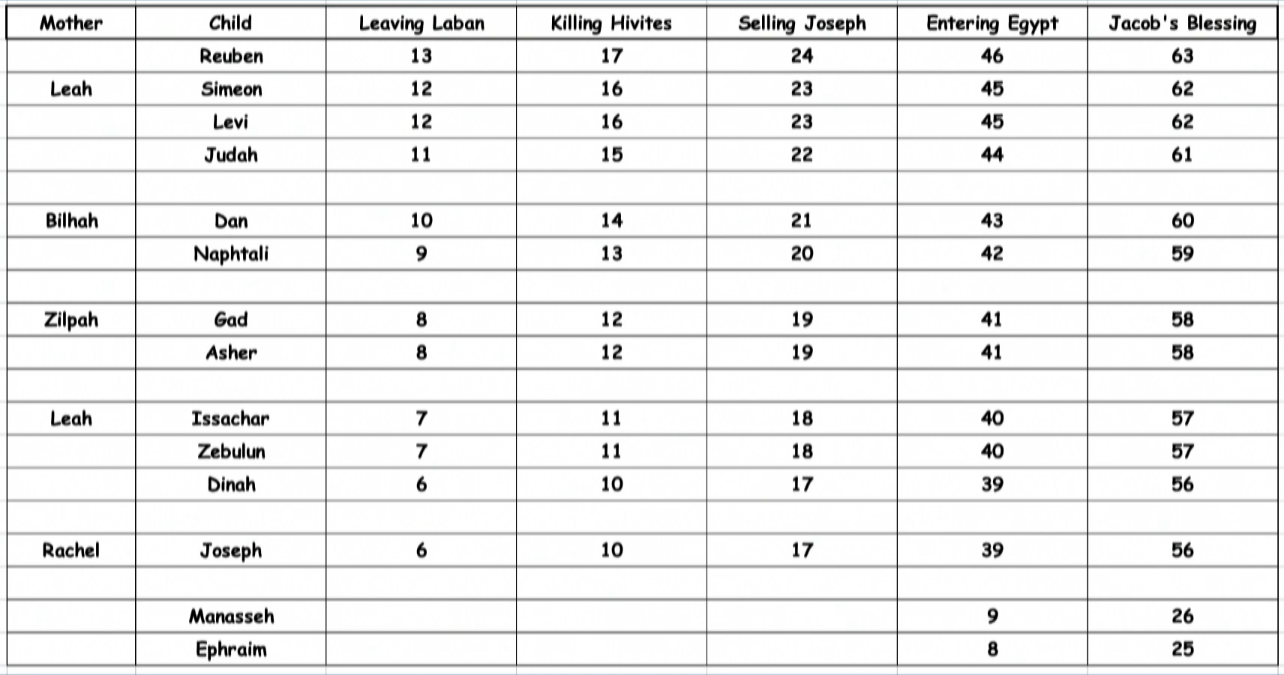
Verse forty three
43 And Laban answered and said to Jacob, The daughters are my daughters, and the sons are my sons, and the flocks are my flocks, and of all that you see, he belongs to me: and what can I do to these to my daughters today (the day) or to their sons whom they have birthed?
Notice that Laban did not admit or deny anything that Jacob did against him, but replied of "his own interests" by saying that those were "his" sons and daughters. Oh no, they're not. Laban revealed his true colors that he was one greedy guy by saying everything is "his". If Laban had it his way, he would have also said that Jacob was his too. In my opinion, Laban said this to get back at Jacob for, in Laban's eyes, all the spotted and variegated and brown livestock that Jacob "stole" from him. Laban also forgot that he gave his daughters and his female servants away, later to become Jacob's wives, so they belong to Jacob and not "Pale Face" Laban.
Verses forty four through forty eight
43 And Laban answered and said to Jacob, The daughters are my daughters, and the sons are my sons, and the flocks are my flocks, and of all which you see, he belongs to me: and what can I do to these to my daughters today (the day), or to their sons which they have birthed? 44 And come now, we will cut a covenant, me and you; and shall be for a witness (testimony) between me and between you. 45 And Jacob took a stone and erected her of a pillar (column). 46 And Jacob said to his brothers, Glean stones; And they took stones, and they did (made) a heap: and they ate there upon the heap. 47 And Laban called to him Jegar Sahadutha: and Jacob called to him Galeed. 48 And Laban said, This heap is a witness (testimony) between me and between you today (the day). Upon thus his name was called Galeed;
Based on verse forty five, the pillar is feminine, because it is no different than a city, which also is feminine. The brethren also ate upon the heap. It must have been a big enough heap that there had to have been at least ten people to eat on it.
Laban and Jacob also ate a Food Covenant together, and as noted before, once a Food Covenant is eaten, it cannot be broken.
Looking at the following words:
JEGAR SAHADUTHA
The Hebrew word for Jegar Sahadutha is "Y'gahr Sah-hah-doo-thah"- Yod, Gimel, Dalet; Shin, Heh, Dalet, Vav, Tav, Aleph (atwdhs rgy). It is from Strong's Concordance number 3026, and its defintion
(Chaldee); from a word derived from an unused root (meaning to gather) and a derivative of a root corresponding to H7717; heap of the testimony; Jegar-Sahadutha, a cairn East of the Jordan: - Jegar-Sahadutha.
Jegar
It is most likely from 1481 "goor" (rwg), and its definition
A primitive root; properly to turn aside from the road (for a lodging or any other purpose), that is, sojourn (as a guest); also to shrink, fear (as in a strange place); also to gather for hostility (as afraid): - abide, assemble, be afraid, dwell, fear, gather (together), inhabitant, remain, sojourn, stand in awe, (be) stranger, X surely.
Sahadutha
from 7717 "sah-heyd" (dhs), and its definition
From an unused root meaning to testify; a witness: - record.
Jegar Sahadutha means "assembling of a witness"
GALEED
The Hebrew name for Galeed is "Gah-leyd"- Gimel, Lamed, Ayin, Dalet (delg). It is from Strong's Concordance number 1567, and its definition
From H1530 and H5707; heap of testimony; Galed, a memorial cairn East of the Jordan: - Galeed.
Gal
from 1530 "gahl" (lg), and its definition
From H1556; something rolled, that is, a heap of stone or dung (plural ruins); by analogy a spring of water (plural waves): - billow, heap, spring, wave.
from 1556 "gah-lahl" (llg), and its definition
A primitive root; to roll (literally or figuratively): - commit, remove, roll (away, down, together), run down, seek occasion, trust, wallow.
Eed
from 5707 "eyd" (de), and its definition
From H5749 contracted; concretely a witness; abstractly testimony; specifically a recorder, that is, prince: - witness.
from 5749 "ood" (dwe), and its definition
A primitive root; to duplicate or repeat; by implication to protest, testify (as by reiteration); intensively to encompass, restore (as a sort of reduplication): - admonish, charge, earnestly, lift up, protest, call (take) to record, relieve, rob, solemnly, stand upright, testify, give warning, (bear, call to, give, take to) witness.
Galeed means "Heap of Testimony".
In many words, Jegar Sahadutha in Aramaic and Galeed are the same meaning.
Verses forty nine and fifty
49 And the Mizpah; which was said, hwhy shall watch between me and between you, for we are absent (hidden) a man from his neighbor. 50 If you shall afflict ta-my daughters, and if you take wives upon my daughters, no man is with us; See, Elohim is a Witness (Testimony) between me and between you.
It was possible that when Jacob first arrived to Laban, he told Laban what Isaac told Jacob to not to take wives from the land of Canaan. Whether Laban knew it or not, he was reinforcing and defending the original covenants when Eliezer, Abraham's servant, made with Abraham, and what Isaac said to Jacob before he left Canaan, when Laban said to Jacob not to take other wives besides his daughters, which are noted in the Torah portions of Khai-yey Sarah and Toldoth, in the book of Genesis
Genesis 24:2 And Abraham said to his servant, the elder of his house, that ruled all which belonged to him, Put now your hand under my testicles: 3 And I will have you swear in hwhy, Elohim of the Heavens and Elohim of the Earth which you will not take a wife to my son from the daughters of the Canaanites which I dwell in his nearness:
Genesis 28:1 And Isaac called to Jacob, and blessed him, and commanded him, and said to him, You shall not take a woman (wife) from the daughters of Canaan.
On top of that, Laban used Elohim as an excuse saying in many words. "I will up one more on you by saying Elohim is on my side on this matter of not having any other wives or abusing your current wives. So don't you dare do something behind by back". Laban was still trying to sidestep Jacob by using hwhy for his purpose. Laban hadn't change.
This was so, because Jacob was returning to Canaan, and the potential following wives would have been from Canaan which was against the commandment of Jacob's father and grandfather.
Looking at the word MIZPAH
The Hebrew word for Mizpah is "Meets-pah"- Mem, Tsade, Peh, Heh (hpum). It is from Strong's Concordance number 4709, and its definition
Feminine of H4708; Mitspah, the name of two places in Palestine. (This seems rather to be only an orthographical variation of H4708 when ‘in pause’.): - Mitspah. [This seems rather to be only an orthographical variationof H4708 when “in pause”.]
from 4708 "meets-peh" (hpum), and its definition
The same as H4707; Mitspeh, the name of five places in Palestine: - Mizpeh, watch tower. Compare H4709.
from 4707 "meets-peh" (hpum), and its definition
From H6822; an observatory, especially for military purposes: - watch tower.
from 6822 "tsah-phah" (hpu), and its definition
A primitive root; properly to lean forward, that is, to peer into the distance; by implication to observe, await: - behold, espy, look up (well), wait for, (keep the) watch (-man).
Mizpah means "Tower" and "Watch Tower". This was a "tower" witnessing and making sure that Laban's word toward Jacob was honored.
Verses fifty-one and fifty two
51 And Laban said to Jacob, Behold this heap and behold the pillar (column) which I have instructed (taught) between me and between you; 52 This heap is a witness (testimony), and the pillar is a witness (testimony), if I, I will not go over ta-this heap to you, and if you, you will not go over ta-this heap and ta-this pillar (column) to me for evil.
That "Heap of Testimony" was the Eastern boundary East of the Jabbok River.
Verses fifty three through fifty five
53 The Elohim of Abraham, and the Elohim of Nahor, the Elohim of their father, they shall judge between us. And Jacob sware in the dread of his father, Isaac. 54 Then Jacob sacrificed a sacrifice on the mountain, and called to his brothers to eat bread: and they ate bread, and they lodged (stayed) on the mountain. 55 And Laban arose early (woke up, loaded up, started up) in the breaking period (morning), and kissed to his sons and to his daughters, and blessed them: and Laban went out and returned to his place.
This is the second Food Covenant noted in the Torah that could not be broken in which Jacob and Laban made together, which is not to cross beyond this pile for evil purposes. As we know, they have not crossed over that pillar for evil intent throughout their lifetime.
CHAPTER 32
Genesis 32:1-2
(32:2-3 in the Hebrew)
Gen 32:1 And Jacob went (walked) to his way, and the Messengers of Elohim entreated (interceded) on him. 2 And Jacob said as the which had saw them, This is the Camp of Elohim: And called the name of that place Mahanaim.
Why did the Messengers of Elohim meet Jacob? It sounds like they putting out a welcome home party to Jacob saying "Welcome Home, Jacob!".
Looking at the word MAHANAIM
The Hebrew name for Mahanaim is "Mah-khah-nah-yeem"- Mem, Khet, Nun, Yod, Mem Sophit (Mynxm). It is from Strong's Concordance number 4266, and its definition
Dual of H4264; double camp; Machanajim, a place in Palestine: - Mahanaim.
from 4264 "mah-khah-neh" (hnxm), and its definition
From H2583; an encampment (of travellers or troops); hence an army, whether literally (of soldiers) or figuratively (of dancers, angels, cattle, locusts, stars; or even the sacred courts): - army, band, battle, camp, company, drove, host, tents.
from 2583 "khah-nah" (hnx), and its definition
A primitive root (compare H2603); properly to incline; by implication to decline (of the slanting rays of evening); specifically to pitch a tent; generally to encamp (for abode or siege): - abide (in tents), camp, dwell, encamp, grow to an end, lie, pitch (tent), rest in tent.
from 2603 "khahn-nahn" (Nnx), and its definition
A primitive root (compare H2583); properly to bend or stoop in kindness to an inferior; to favor, bestow; causatively to implore (that is, move to favor by petition): - beseech, X fair, (be, find, shew) favour (-able), be (deal, give, grant (gracious (-ly), intreat, (be) merciful, have (shew) mercy (on, upon), have pity upon, pray, make supplication, X very.
Mahanaim generally means "Double Camp", because there are two camps that existed: One camp was hwhy's camp, which could be called "the Camp of The Heavens", and the second camp was Jacob's camp, which could be called "the Camp of The Earth", hence the camps of the Heavens and the Earth were together in that one location. It also connects with how hwhy put it in order the Heavens first and the Earth second, which is noted in the Torah portion of B'reyshith, in the book of Genesis
Genesis 1:1 In beginning, Elohim created ta the Heavens and ta-the Earth.
That ends this week's Torah portion commentary.
Any questions or comments can be written to
the.aleph-tav.project@msn.com
SHABBATH SHALOM

_______________________________________________________________________________________________________________________________________________
_______________________________________________________________________________________________________________________________________________
Copyright 2014 The Aleph-Tav Project - NVU's Website Design Software by The Premier Group